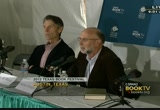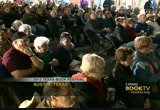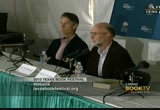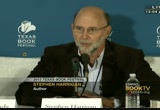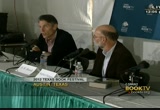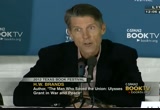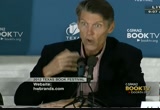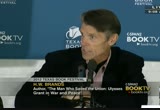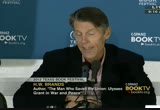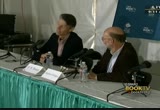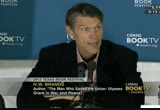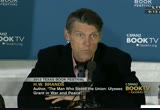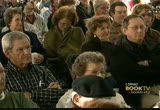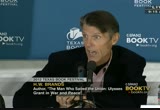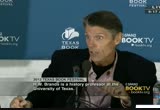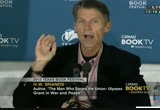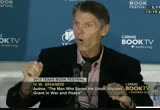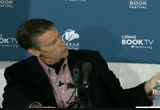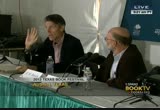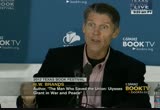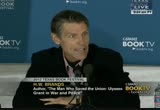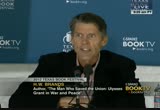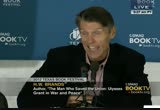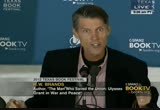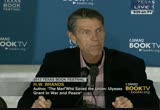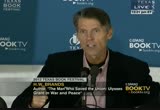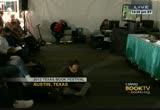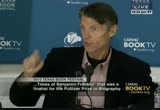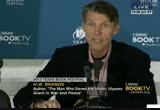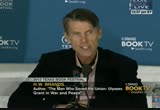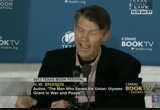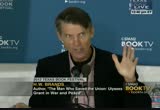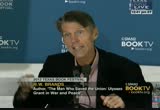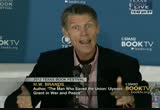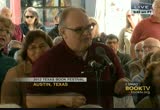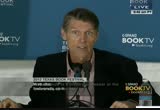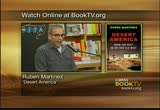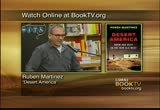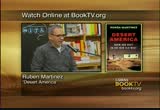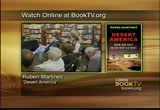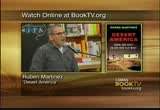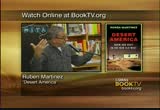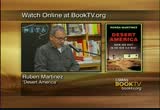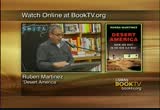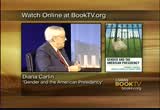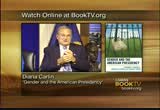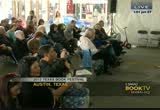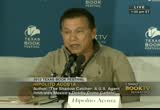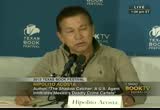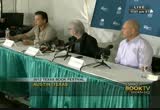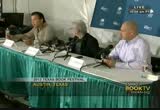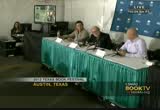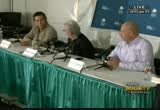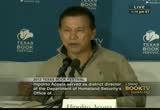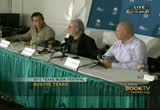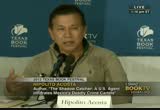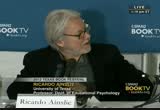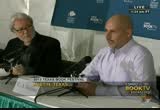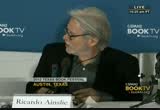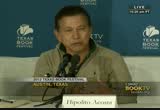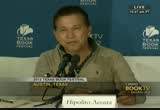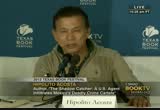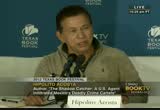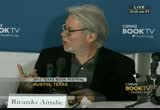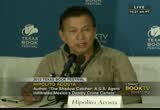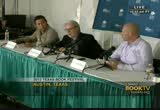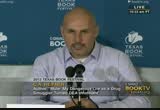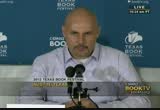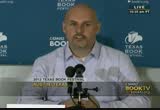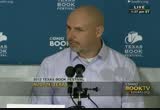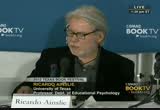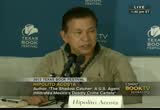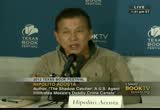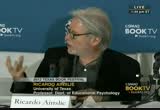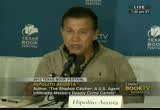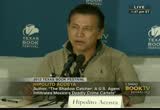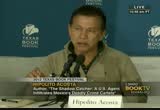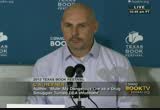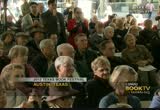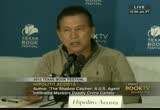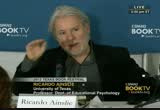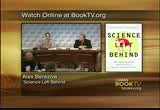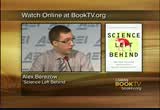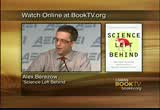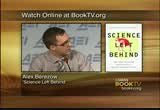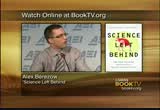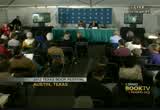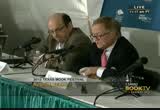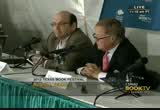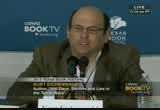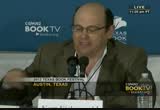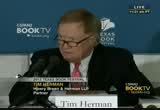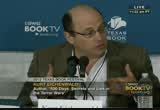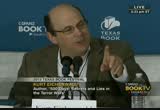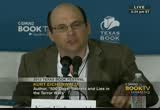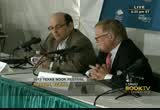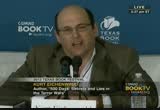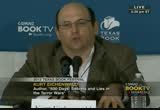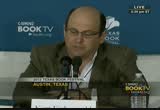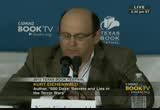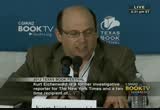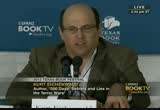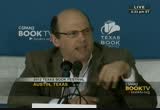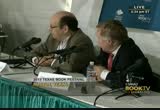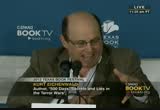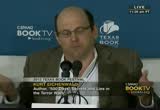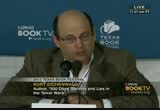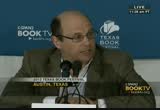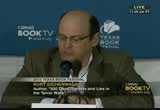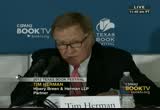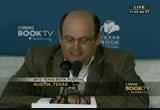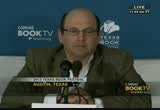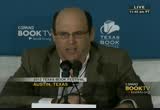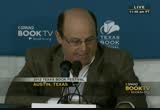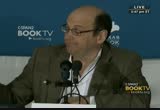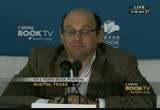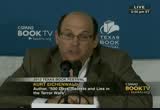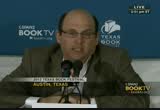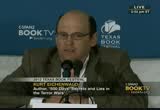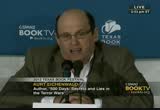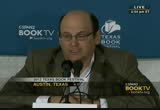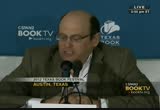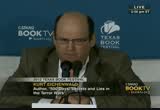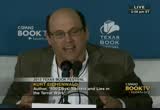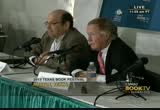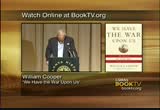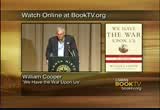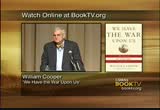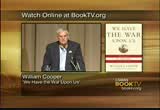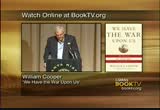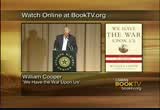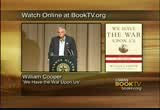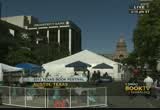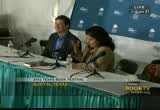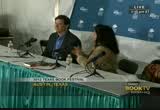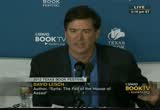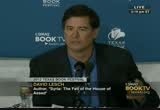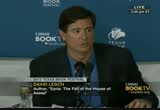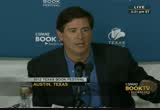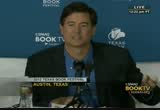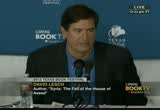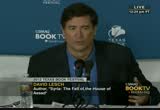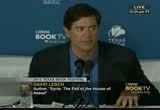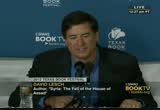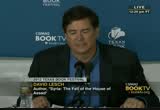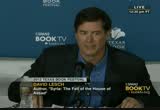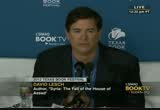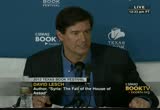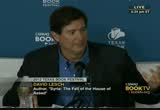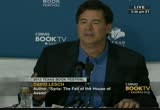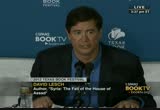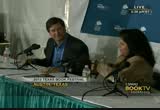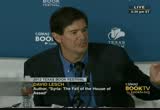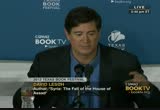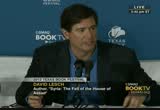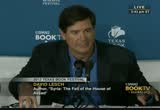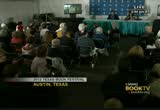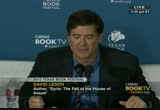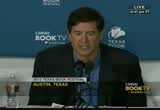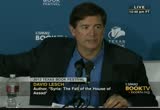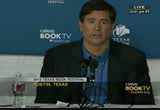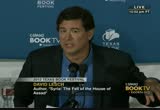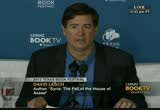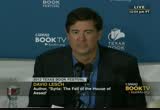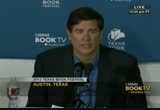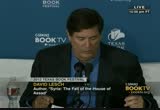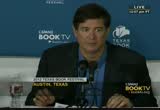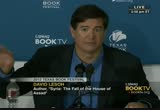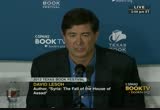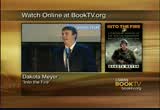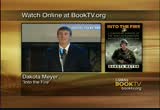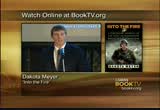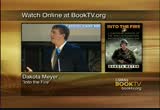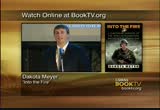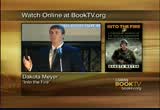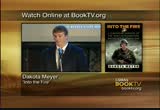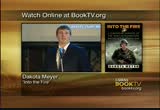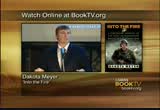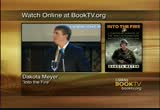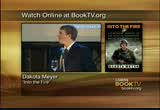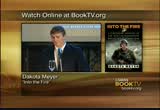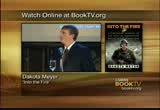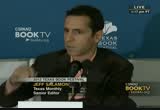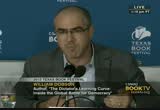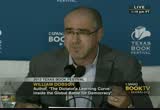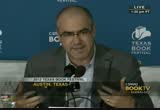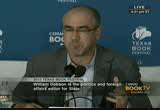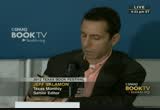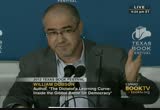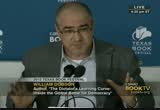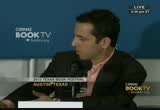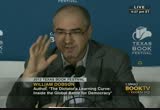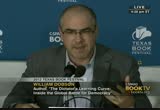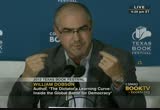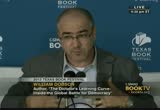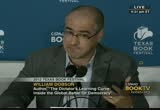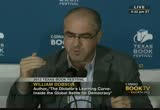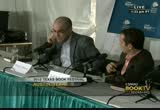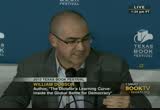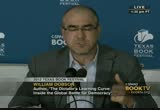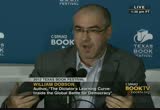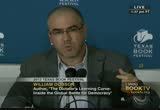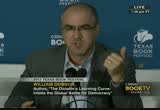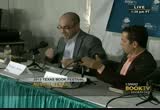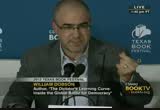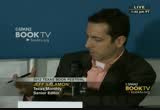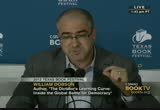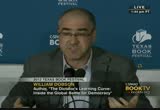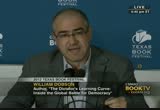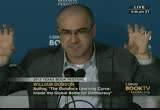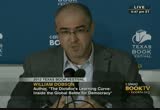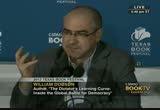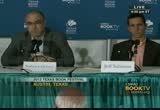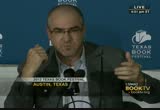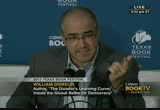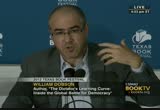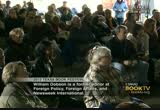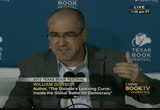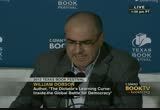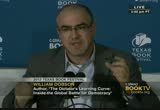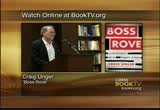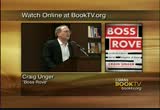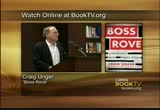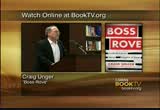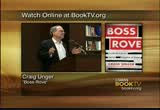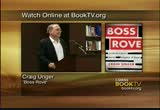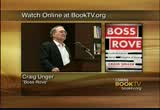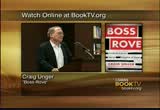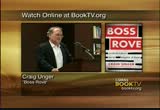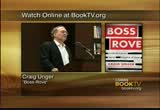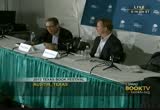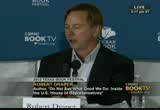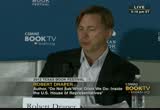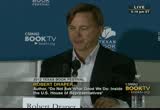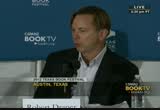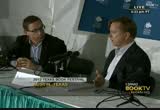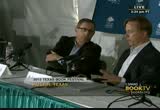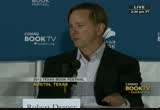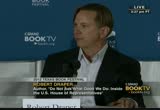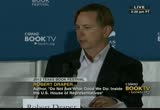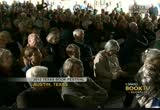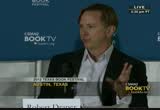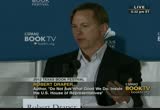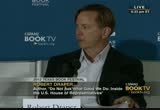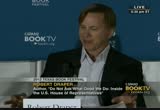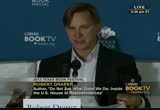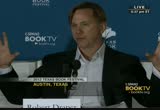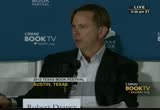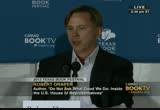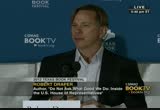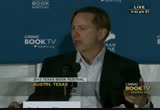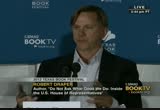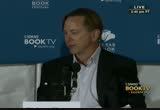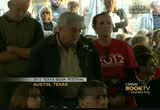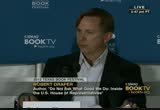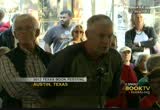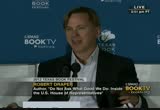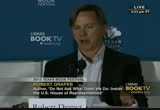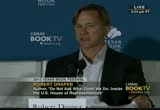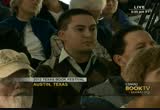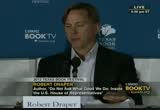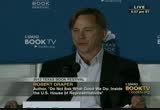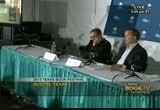tv Book TV CSPAN October 28, 2012 12:00pm-6:00pm EDT
12:00 pm
12:01 pm
welcome to this session of the texas book festival with h. w. brandis. my name is steve hair again. i will be doing a q&a with bill. 15 minutes after the session phil will be signing books in the book signing campus between the tenth and eleventh down the street. please patronized the book signing tent in the bookstore, and pleas by the the book which won't be a problem. this is the book, "the man who saved the union," ulysses grant and war and peace. if you by this book, proceeds will go to support texas libraries and literacy. it is a great book to read and to find a word because.
12:02 pm
h. w. brands is the dixon allan anderson centennial prof. of history in austin. his focus has been for many years on american history and politics and his biographies and histories include a number of tremendous books. this is the just the most recent. also traitor to his class about franklin roosevelt, biography of andrew jackson called andrew jackson. the age of gold about the gold rush in the 1840s. the first american, about benjamin franklin and tea are about theodore roosevelt. together these books comprise not haphazardly but purposefully a history of the united states for the last 200 or so years. a number of these books have been best sellers. traitor to his class and the first american were both
12:03 pm
finalists for the pulitzer prize and you can see h. w. brands on tv all the time if you go to the history channel or turn on the tv, there he is. this book is -- i will hold this up again so you can see and recognize it easily at the book signing tend, it is a tremendous biography of ulysses grant filled with stuffed i certainly never knew and was delighted to find out. it is very authoritatively and readable. before we get to grant himself i wanted to ask bill a broad question about biography. here at the book festival there are a number of biographers. i have read several of these already, robert caro's latest volume in his massive history, biography of lyndon johnson. janet reed's biography leonard
12:04 pm
cohen, all these people at the book festival among others. david maraniss is here with a book about obama. i was curious because all these books are so different in terms of authors's approaches to subject matter, with the subject is dead or alive, what kind of access the biographer has to be subject to. i am curious, do you have a philosophy having written many biographies of what exactly a biography should be and what it should do? >> thanks for the question and for all of you coming out. sunday morning is sometimes a chore. i am gratified so many of you are here. the question of biography and what i see it to be. i am trained as a historian so i tend to look at biographies which, regardless of how they are written to some extent all comprise the life and times of
12:05 pm
your subject. i tend to include more times than some other biographers do. in my experience and observation, biographers come to their subjects from one of two directions. they are either historians like me or journalists. sometimes novelist's find their way in, but the folks who come from the direction of history, to borrow an image from filmmaking, tend to broaden the focus on their character. you see the character but you also see more of the background and the character is at least in part a vehicle for telling the story of the character's time. journalists and others from the non history direction tend to have a tighter focus. they're subject fills up more of the frame all the time. beyond that's we could get into the question of what do you make
12:06 pm
of life and how do you reconstruct the wives of people, in some cases dead-end in some cases still living? and that has to do with one's view of human nature and i will confess in some of the books i have taken on, i was concerned, whether i was qualified to write about the person i was writing about. there is the whole question of how can you write a bunch of pages about somebody you never met, about someone whose voice you never heard. you don't know how tall they were, you don't know what impression they made when they walked into a room. you don't know some very basic stuff that a person who just encounter your subject for 15 seconds in life new. the other thing was there are
12:07 pm
certain life experiences that we all share. we were all children at one time and so you can imagine if you're subject, japan benjamin franklin in colonial boston, you can imagine what that might have been like. when i was writing about franklinite realize a large part of the story was going to consist of franklin growing old because he became america's emissary to france during the american revolution at the age of 70. i started writing about franklin when i was around 40 and i really wondered whether i was going to be able to understand what it was like to grow old and infirm which was a large part of a franklin story. partly for this reason, i decided, and this is carried through in my other book, i decided to tell my stories, i try to relate the lives of my
12:08 pm
characters as much as possible through the perceptions, the words of people who knew them. my books tend to have more eyewitness stuff than some others. if i have a choice between writing a scene in my own words and writing a scene in the words of somebody who was mayor, i will tend toward the person who was there. that conveys a certain authenticity and it relieves me of the burden really of sort of providing the authority because the question anyone should have is how does the author know what he is telling me. if i can make it very clear, it is not me that is telling you this. the room looked like this, benjamin franklin seemed like this to somebody who was actually there. that is a roundabout answer to
12:09 pm
your question. >> let's get directly to ulysses grant. the book is called "the man who saved the union," ulysses grant and war and peace. two questions about this title. what happened to the s in ulysses grant? [welker]] it is not there? >> no. >> what are you going to do with editors? i will tell you the answer. the answer is the pass was an artifact. wasn't born ulysses s. grant. he was born high room simpson grant and -- he was born hiram ulysses grant and always went by his middle name. i have sympathy of people who go by our middle names. his birth name was not ulysses s. grant. he eventually became known as ulysses s. grant when he became
12:10 pm
president but he signed things u.s. grand. i don't know if there is a memory of my own childhood that grew me to grant but in the neighborhood i grew up in, in portland, ore. there was a public park and the sign on the public park was u.s. grant park. for the longest time i thought this was the federally owned park granted to the city for some reason or other. that is part of the answer. the other answer is i had a hard time convincing the people who designed the dust jacket to get all the words on there that are already on their. the man who -- "the man who saved the union," ulysses grant, the man who saved the union war and peace is a lot of words and especially with a photograph. i didn't want to push things. one last thing. ulysses grant sort of rolls off
12:11 pm
the tongue. add an s, ulysses s. grant, it really wasn't an oversight. it was by design. >> a more substantive question about the title. it is called "the man who saved the union". i get that, he was the general who turned the tide of the civil war, saving the union but what i didn't know until i read the book, the work of saving the union went on much beyond the civil war for him as president. he saved the union twice, one could argue. is that correct or am i just making this up? >> you are not supposed to say that with such a quizzical tone. you are supposed to say and i was convinced upon reading it that he did save the union twice. since you said it could be argued it is incumbent upon me to argue that as i do in the book. there are many people who might
12:12 pm
take issue with grand saving the union during the civil war. didn't lincoln do that? he did. i am not going to say grant was the only person who saved the union but he was the commanding general of the army's that put lincoln's policies into effect and he was the general who accepted the surrender of the army of northern virginia that ended of award. if anybody won of the war on the battlefield, if you could say that any one person did and of course you can't but one thing we do in history is generalized. we simplified because history, reality is too complicated to get our heads around if we deal with it in its full complexity. grant saved the union during those civil war and i do contend that grant saved the union during reconstruction as well. one of the reasons i decided to
12:13 pm
write about grant was i wanted to write about someone who was central to the civil war but i also wanted to write about someone who was deeply involved in reconstruction. how many of you are you tea alums. how many of you studied history at the university? it is required by the state would just later. those who didn't raise your hand you better check that diploma to see if it is valid. the reason i mention this is against my better judgment, i have only been teaching -- i only arrived in 1981. the two semester american history course is divided in 1865 which first of all is logistically impossible these days. the decision to divide it at that point was made in 1915 at which time there was a lot less
12:14 pm
of 1865 to the present than there is now. the second problem is more conceptual. it really does lend to the story of the civil war because the civil war ended formally in april of 1865 but the divisiveness, the issues that gave rise to the civil war did not disappear. the union fell apart in pieces starting in the 1850s, formal secession began at the end of 1860 and there was a four-1/2 year period in which the union was sundered and it was put back together on the battlefields but since vietnam we have become aware that you win wars at least in large part by winning the hearts and minds of those people you are contesting against.
12:15 pm
i can guarantee you that 1860's 5 the hearts and minds of the south were not with the union. one of the points i make in the book is that the civil war was the easy part or at least it was a straightforward part. war makes things very clear. one of the major emotional themes in the book is how war did make things clear for people like ulysses grant who before the war simply could not get his act together in civilian life. civilian life was more confusing. there were many more considerations one had to take account of. there were all sorts of standards of success. were you doing well? various influences impinge on your life. once the war began for grand things got really clear. he understood this was what the objective was and this was how to get there.
12:16 pm
discovered in himself something he didn't have any idea of and no one else did either. he had a genius for modern war. i could elaborate on that little more but there's a great deal in the book. the important point here is war made everything straight forward. we have the army and you have your army. we bang it out and we see who wins. on this question of secession grant was not constitutional lawyer. he thought the south had the inferior argument over whether secession was legal but he shared something with lincoln and that was even if the session was unconstitutional they both acknowledge a right of revolution. this was the right the american colonies exercised but the deal of revolution isn't based on the inalienable right to life, liberty and pursuit of happiness and self-government but the
12:17 pm
essence of revolution is you have to win. nobody hands you victory in revolution. that is what the war was about but then the war ends and the south has to be reintegrated into the union. but there are all these unreconstructed confederates who still believed they had the better part of the argument and the white race should be supreme in the south, who resent entirely the fact that abolition was imposed on the south but whereas during the civil war they didn't have a vote, didn't have a say and the national government, all of a sudden they do. during war, the rules of democracy were suspended. democracy is based on majority rule. once the war ends democracy kicks back in and so the south has to be reintegrated politically and when grant was nominated for president in 1868
12:18 pm
grant was first of all nominee by acclamation of the republican party. grant did not lift a finger on his own behalf. allowed himself to be nominated and allowed himself to be elected. one thing, he didn't give any speeches. he wrote his acceptance of the nomination and the one line in that message that caught the attention of the country was let us have peace. this was something that you electrified the south as well as the no.. in the period -- and battlefields of a different kind. congress was warring against the executive. who would govern? another question was who would govern in the south? would republican regime imposed
12:19 pm
upon the south by union troops, would they governed, will would the pre-war majority govern in the south? grant became something of a sympathetic figure. he was a good union general. he was the one who granted generous surrender terms to we's troops in appomattox believing upon the war's end they had to get back to the south which was starring as a result of the war and in no small part because of grant's strategy in places like georgia the south was starving. 11 take their horses to go back and plow their fields and treating them once again as fellow americans rather than rebels. when his troops began to cheer about the surrender he told them to be quiet. these are our country men now so grant became the sympathetic general. chairman remained the devil incarnate until the end of his
12:20 pm
days so grant became a unifying figure and i could elaborate on this a little more. [laughter] >> not that i am trying to insert myself in your conversation but i really want to ask you to talk about grant as just a guy because he was the most unlikely political material to become president of the united states. he talked about his knees knocking when he had to give a speech. how did it happen that this guy who was so non demonstrative, i believe you would be presented very credibly, powerful and important president of the united states. >> grant was the most unassuming
12:21 pm
person, most unassuming major historical person i have come across. his modesty persisted until the very end. i begin my story at the end of grant's life when he is composing his memoir. grand for a long time resisted writing his memoirs. he thought after the fact monday morning quarterbacking was better left to other people. as soon as the war ended officers on both sides began apologizing for their mistakes and aggrandizing their success. grant stayed out until the end and the only reason he took up the can was he had been swindled by gilded age equivalent of bernie madoff and he was broke and was going to leave his wife broke and needed to make some money. the got connected with mark twain who recognized that a grant memoir would be a huge best seller is indeed it was. while he was writing the memoir he discovered he was dying of
12:22 pm
cancer and so the nation watched as grant was in this race for his life and it was unclear whether grant wood finish writing the story of his life before he finished his actual life. but as he was in the final stages of both writing a memoir and dying of cancer he wrote some notes to himself and one of the notes that he writes, this is grant at the age of 65 -- 63. he knows he is dying and he has been the commanding general, the only general to have the rank george washington held in the revolutionary war since then. he might well have been one of the most famous people on earth. he took world for after he left
12:23 pm
the white house and everywhere he went crowds turned out to see this great american hero but he writes just weeks before he dies i never thought of acquiring rank in the profession i was educated for, namely the military. yet it came with two grades higher prefix to the rank of general officer for me. i certainly never had either ambition or taste for political life, yet are was twice president of the united states. one of the striking things to me on writing this story was observing how grant did and mostly did not change personally as he became this world historical figure. when the civil war began, grant was living in illinois. one thing after another had failed for him. he failed as a farmer and failed in selling real estate and
12:24 pm
failed selling insurance. he finally had to fall back on longstanding offer from his father who really thought ulysses grant had very few gifts at all. and he went to work for his younger brother in the family leather store. he was full the resigned to life of mediocrity. if the war had not come, the world never would have heard of ulysses grant. he was not one who had any burning ambition. if he had not been essentially handed the presidency, it never would have occurred to him to seek it. he did not have that proverbial fire in the belly presidential candidates these days are almost required to have and despite the
12:25 pm
fact that by the war's end he realized he was pretty good at this general stuff, he never thought that particularly qualified him to the president. if the people through the democratic process would summon him to the presidency he would answer that call the way he had always answered the call of his military superiors. >> i want to open up questions in just a second but one of their thing i wanted to ask. you teach american history. you taught american history for a long time. you know that bill knows everything before he sits down to write a book because he has taught it for so long but i am very curious, was there one giant surprise about grant when you were putting the book together?
12:26 pm
something you didn't know or didn't expect? >> i won't say there was a giant surprise. there was an abiding question that drove me to write the book. is a question i don't exactly have an answer to. i have answers to it but not a single answer. it is a question that is broader than grant, as broad as when you reader the question is as broad as this. it is very simple. why is there war? every society has a war. i never encountered in my study of history or reading of anthropology encounter a society where war was not not really something that happened but a really big deal in society. there's something about humans' that inclines us towards war. my question i am posing to my history classes is why is this so? it strikes me as paradoxical.
12:27 pm
there are relatively few societies. i don't know of many societies today that say war is a really good thing. if we agree that war is a great thing, this question of why is there war would not require much of an answer. if we ask why is there sex, most people think sex is a good idea. you don't have to ask that question but with war most people think war is a really bad thing. why does it happen so often? with my students we work our way through to two basic answers to the question. they seem diametrically opposed and in some ways they are but they are not entirely on complementary. one answer and the answer favored by most of us because by most people in the united states i can point out one conspicuous exception if you want to hear it, most people would say that work is when things go wrong and if you want to explain why there is war you need to explain
12:28 pm
various things that can go wrong. things can go wrong because there is misunderstanding about nations. if you look at the run of 2 world war i the austrian archduke got assassinated. then ultimatum's went back and forth and if someone made a slightly different decision the war might not have happened and war is the result of bad characters. unusual people like adolf hitler. hitler's megalomania was responsible for world war ii. this is a comforting explanation because it allows us to say that either war is because of a few bad guys and if we watch out for them and keep their hands off the reins of power we will be ok or if it is because of misunderstanding let's all get to know each other better and there won't be a war. the other possibility is that war is not when things go wrong but when things go right.
12:29 pm
there is something positively attractive about war. this might touch a part of our characters we are not particularly happy about, that we don't want to acknowledge but one of the reasons i wrote about grant, he was one, william sherman was another, the union side was another and robert e. lee on the confederate side. these were people who were really good at work and they were good and a technical sense. they knew how to arrange battles but they were also good, i will use the word a moral sense. you might when i explain, you might question whether that is the right word. grant's great gift for war was twofold and this is something he didn't know anything about until he got in the thick of things in the civil war. he could envision a battlefield
12:30 pm
better than almost anybody. one of the primary problems of military command during the civil war, less so now we have satellites and aircraft that oversee everything but the hardest part was figuring out what the battlefield look like, where the troops were and how to approach each other. grant had a gift, and don't know where it came from. some people have a spatial imagination that is better than others. the other aspect, i will call it the moral part, grant had the ability to do something that the five commanders of union forces that precede him did not have. he had the ability to give the order to go into battle. that might sound like an oversimplification but george mcclellan, probably the best known grant predecessor was as good as grant was at preparing for that and even more beloved of his troops than grant was and
12:31 pm
mcclellan didn't have the nerve. he didn't have, maybe you could call it the brutality to give the order for battle when he knew, before the battle ended thousands of those young men he was speaking to would be dead. >> i won't salmons exactly surprised but i was struck by this because this freight that i found that once admirable and appalling, admirable because if there is a war, you need to have somebody to do that but appalling in that it requires us to do something we are taught at a very early age we must not do, that is to elevate the end above the means. that is what winning a war is all about. the means are dirty, the means are brutal, the means include the death of all sorts of people who didn't do anything to bring
12:32 pm
on this war but if you believe in the end and you have that steel character that grant had, lincoln had it too although he wasn't -- didn't give the order the night before but if you have that, then you can send the troops into battle and your side will win. this is what i was saying earlier. war clarifies for grand an end of the war, holding the union together at after the emancipation proclamation freeing the slaves. this justify almost any thing required to achieve it. one could say that is a tough calculus to make because how can you measure political union against 600,000 lives. grant had a more practical take on this, and that was he believed -- lincoln fully believed if there were two nations in the middle of the north american continent, this war would not be the last.
12:33 pm
they said the reason the united states had not been written by the wars that affected europe for centuries was there was a single country. once there are two countries in north america, they will go at it again so this war would not be the last and in the long run even 600,000 lives, this might be a bargaining human suffering. >> questions from the audience? we will start over here. [inaudible] >> is there a microphone he could use? i am sorry. >> is the microphone working? good deal. we are all talking, we were wondering when you were going to get to the part about what we
12:34 pm
all believe in the southern part of the united states, how he was a drunk and a corrupt politician. you are contradicting much of that. you came to different conclusions, did you? >> i did the. i will give you grant's reputation. for years he was a drunk and a butcher and his administration was one of the most corrupt in american history. historians rating presidents until the beginning of this century have put grant in the bottom 2 or 3, he is down there with james buchanan. james buchanan and grant and one or two others. grant's reputation for drinking has been exaggerated. grant didn't have so much a drinking problem as he had a problem of holding his liquor. no, no. the distinction is not
12:35 pm
unimportant because grand in essence drank himself out of the army in the 1850s but the reason he drank himself out of the army in the 1850s was he was stationed 1,000 miles from his wife and children, the younger of whom he had never seen. he was stationed on the dreary northwest coast of the united states and coming from the northwest i can tell you if you are not from their, their is a strong tendency to depression, even suicide during the winter months. the sun goes away on the first of october and it might come out by the first of the following july but the last of the thing was grand was in a drinking culture. army officers in those days were expected to drink like gentlemen which meant they were expected to drink a lot and not show the effects. grant's voice would start to slur when he had one drink.
12:36 pm
he would start to wobble when he would have two and he was a sorry excuse for an officer in this culture combined with the fact that he wanted to get out of the military anyway. he resigned rather than be brought up on charges of dereliction about drinking. that was the reputation that grant acquired in the army. the army between the war with mexico and the civil war was a small club and so grant drank himself out of the army. no one would have thought anything of it except that when the civil war began grant vaulted over dozens of officers senior to himself who took delight in spreading stories of grant's drinking. i tracked accounts of grant's drinking to the extent that i
12:37 pm
could and discovered on two occasions during the civil war he got drunk to the extent that he got drunk and went to bed and slept off and look up the next morning. he never got drunk at a time when being drunk impaired his ability to perform his responsibilities. he got drunk once during the siege of vicksburg when nothing was happening. he never got drunk when he was president. this is a story that has stuck with him in part because it is a label. you can put on somebody and it is hard to disprove. the part about grand being a butcher is something that even occurred to some of grant's fans during the civil war, the civil war shocked american sensibilities win the war began.
12:38 pm
no one understood how big the conflict was going to become. how many people would die and the maimed, that grant was involved in those casualties. grant was the foremost of the union generals who is willing to fight. this is why lincoln promoted grant. grant's approach to work was you hit the enemy fast and you hit the enemy again and again. grant was one who was going to take the fight to the enemy's though not surprising given the fact that the forces he was fighting against were always entrenched behind the offensive lines, that meant he was going to suffer more casualties than the other side but on a proportional basis grant's
12:39 pm
casualties were lower than the casualties of lee and related to this was a calculation. you can consider this cold blooded but it was cold-blooded. grant realized by the end game, the virginia campaign of 1864-1865 he understood the fundamental arithmetic of the war. every casualty that cost grant a soldier could be replaced. every casualty that cost lee a soldier could not be replaced. we fight, we fight and eventually lee runs out of fighters. grant's corruption in office, not even in grant's they no one accused him of anything but up right integrity. they did accuse him of being a bit too loyal to people who took advantage of their high office but there's a great deal of exaggeration that goes on. the gilded age has been known as the age of corruption in
12:40 pm
american politics. the scandal of the era, in all the textbooks cited again and again, scandals that surrounded the transcontinental railroad. members of congress were part of an inside game funneling money from the federal government channeled through the campus -- construction co. into their pocket and dozens if not hundreds of people were involved and millions of dollars were built. the second big scandal was the scandal involving the tweed ring in new york. they had hundreds of millions in the construction projects in new york. when people talk about corruption scandals of the gilded age those of the two that stand out neither of which had anything to do with ulysses grant. his administration did have scandals, no question about that. these are pretty small compared to the big ones.
12:41 pm
the essential problem grant faced was the early history of the grant administration were written by his enemies. you might think it is said again and again that the victors write the history. they did not write the history of the civil war. the losers, the lost cause of the south and southerners had no stake in grant's reputation but the other thing was half the republican party failed on grant. the republican party originally consisted of two wings, the anti slavery wing and the pro-business wing and the two wings worked well enough together during the civil war but after the civil war ended and slavery was gone it was a corporate wing of the republican party that took over and the corporate wing wanted nothing to do with free men in the south and nothing to do with civil rights. grant was the last of the lincoln republicans. one point i make is grant was the last president, the only president between abraham
12:42 pm
lincoln and lyndon johnson who took civil-rights for african-americans seriously. after grant left office the former slaves were left to the tender mercies of the majority of the south and quickly they were shoved to the side. >> don't ask the question if you don't want bill to answer it thoroughly. >> i do accept yes and no, multiple choice questions. >> we only have three minutes and there's a serious deadline so a brief question. >> you said you want to write history or biography. when i read your benjamin franklin biography you sound like a particle american, the first to the modern in some sense. very different people speaking. , who is the first american in the sense that he or she has
12:43 pm
attitudes like we do and writing biographies and things like that between 1620, and 1770. >> i am not sure i understand the question. who is the first american? >> who would you think after early colonization would have american attitudes that we recognize today? as an american attitudes? >> benjamin franklin. there's a book about him called the first american. >> that was brave. thank you. >> fascinated by the rejoining of saving the nation in peacetime and civil war. what advice would grant give to our political candidate for president? what would they learn from
12:44 pm
grant? >> we are getting the hook over here. it is a very apt question. is a hard one to answer and i will back off on it because the times were entirely different. the challenge confronting every president are almost unique to those times. grant will never be considered one of the great presidents. the deck was stacked against him. what would abe lincoln do today? no idea. what would franklin roosevelt do today? the times are so different. one of the things you learn studying presidential history, american history is greatness is not intrinsic on individuals. in confluence of individuals and context, the president's who will lead us out of the mess we are in today probably is the president who would not be
12:45 pm
equipped to deal with the civil war or reconstruction. that might be an unsatisfactory answer but it is the best i have got. [applause] >> for those of you still waiting to ask a question, just read the book. it is all lan search. the man -- "the man who saved the union," ulysses grant, the man who saved the union in war and peace. thank you. [inaudible conversations] >> that is h. w. brands live at the texas book festival. we will be back in a few minutes with more. >> booktv is on facebook.
12:46 pm
like us to interact with booktv guest and viewers, watch videos and get up-to-date information. facebook.com/booktv. >> this book in particular deals, i think, at its heart, with several things but ultimately the subtitle is boom and bust in the old west. so i am looking at the way the economy affects our lives, the way the economy gets into our bodies. it is a book that i wrote because my body arrived in the desert under particular circumstances in the winter of 1997 when i was broke, broken
12:47 pm
and on drugs. i was in mexico city and lucky enough to go under a book contract from new york. i got an advance from the new york publishers to write a book, a dream come true and in mexico city by november of 1997 i crossed the deadline and didn't have a word written and i was broke and i called the only friend i could count on at that point because my life style led me to destroy a lot of personal relationships. i called a performance artist in costa rica who lived in the united states for many years and met for the solidarity network, art and politics in the 1980s and i said [speaking spanish] and she happened to be in the village of joshua tree, california at that time. there are circumstances that led
12:48 pm
her from the tropics, how did she wind up in the desert? everybody has a story in the desert how they got there. she said we will take care of you, give you a place to live and shortly thereafter i arrived in the desert and one of the first thing that i saw when i rented my little shack in the stands next to a sign that said next services, hundred miles, town of 29 palms, i found myself driven to go further out. her friends were in the village of joshua tree at the edge of a beautiful national park. you have joshua tree, you know that you 2's album, you know what a joshua tree looks like, crazy arms going this way and that. i wanted to go further out. there was something existential
12:49 pm
driving me further out into the big empty as they say about the desert and also the further out you went there rent got cheaper and cheaper and cheaper. i was a $275 a month for a 2 bed room house with five acres of land on the edge of 29 calls where that sign said 100 miles and that is where the book begins. begins with a personal crisis and it was no accident i arrived in this particular landscape. the desert has been the site of restorative pilgrimage for millennia. at that particular moment i don't think i was aware of what i was doing. i didn't say to myself i'm in big trouble with my life and i must go heel in the desert but ultimately that is the state i
12:50 pm
was entering and i realized later on all the symbolism was there to receive me. i began the process of healing and getting to know this place which included almost immediately dealing with the fact that i was arriving in a landscape that had as many problems as mexico city with drugs. i was coming from a place of addiction and all of the pain and struggle that goes with that and arriving in a place where meth was devastating the landscape and meth lab were exploding and where young marines were training and doing lots of drugs to escape the terrible reality of their human bodies so if i was going to fight the ancient symbolism of restorative healing pilgrimage i was also entering a place that
12:51 pm
was the opposite of that. a phantasmagorical place. many years after i moved to joshua tree and 29 palms i met my partner, angela garcia who is in the audience tonight and teaches at stanford and written a wonderful book about the desert called pastoral clinic about addiction. imac angela far away from the desert but she is from the desert and that is one of the things i fell for immediately about her. the fact that she was a western girl from new mexico, from the south valley. we ended up living in new mexico together while she was doing research for her dissertation on addiction. she is a medical anthropologist at stanford university. we have some stanford people
12:52 pm
here tonight and so i followed angela to another landscape in northern new mexico which i had already seen. i have been very couple times as a terrorist when i was younger but we have all seen no. new mexico represented artistically, either as a postcard in the carrousel or truck stopped or angela adams or george o'keefe, painters, writers, john nichols, how many westerns have we seen that have the landscape? northern new mexico in particular has a very powerful draw in terms of its enchanted landscape.
12:53 pm
the official state nickname of new mexico is a land of enchantment which carries a whiff of new age mysticism with it and something warm and fuzzy and tends to obscure complicated reality. ultimately that is what desert america is about, how we imagine the desert or the desert has been imagined for us by many artistic representations that created this vision of the desert, that it is consumed, that it is bought and sold, hotels and hotels and tourist packages and how complicated the act would human geography of the place, the imagines place and the lived place. i am going to take you to
12:54 pm
northern new mexico briefly here. angela chosen northern new mexico. she is from central mexico, albuquerque. both of our families have issues with addiction. that was another point of encounter between us and she chose northern new mexico not to be next door to her family but close enough to visit and also because northern new mexico runs along highway 68 which ultimately comes out of santa fe and goes to town. you go to the edge spaniel of valley which is the low road and in northern new mexico there is the highest rate of heroin addiction and death from overdose of heroin of anywhere
12:55 pm
in the country, it has for a long time and it is not getting better, it is getting worse. >> you can watch this and other programs online at booktv.org. here's a look at some books being published this week. alex kerr shock chronicles the journey of felix sparks, commander of the 157th dubee regiment in the liberator, one world war ii's soldier's boys from sicily to the gates of dow. journalist and media critic eric deegan argues the media capitalizes on viewers fears and prejudices to garner an audience in how the media wields dangerous words to divide a nation. in underdog:the making of the modern marine corps, aaron o'connell, assistant professor of the cold war and united states marine corps at the u.s. naval academy chronicles the transformation of the marine corps from world war ii to
12:56 pm
vietnam. you can see recent interview on booktv.org. david bond really from time magazine describes president abraham lincoln's political and military decisions in the second year of the civil war in rise to greatness, abraham lincoln in america's most perilous year. in tombstone:the great chinese famine 1958-1962 journalist explains what led to the famine of the 1950s and 60s which included the death of his father. the creator of rectal geometry recounts his life in fractalist. in of africa, africa's culture, religion, history and identity. look for these titles in bookstores this coming we can watch for the authors in the near future on booktv and on
12:57 pm
booktv.org. >> could have wanted more but in the conference can only do so much so want diversity. you want democrats, republicans, different parts of the country. everyone at different ages. we knew on the basis of nine, you can't make generalizations that are 100% certain. we may say as much in the book because conclusions are hypothesis that other people might run with but in order to make those hypotheses we needed a fairly diverse group. >> we also have the white house project for the last couple election cycles and several of the women identified several years before the 2008 election,
12:58 pm
kathleen sibelius, both in there, and barbara lee has been here several years from now when you did the last round with her foundation and talked about looking at women governors. we wanted to look at women governors who had been through barbara lee's training through the pipeline. we also made the observation that when a male is elected to senatorship he is cast as a future presidential hopeful. scott brown hadn't even been sworn in yet in massachusetts, and that's gotbrown2012.com, it was already taken but so many women had been in washington for so many years as legislators and working on important work and their names never bubbled to the top, why not? >> how did you decide you wanted
12:59 pm
to write this book? you study similar topics but how did this book come about? it was my idea but i have been a political nerd -- my parents remember my sister and i 1960 staging a nixon/kennedy debate. my elephant beat her ravaged. during all of those years, what fascinated me were the magazine issues that came out in advance of the presidential election that we preview the eight or ten or 12, people who ought to be considered and it simply struck me after seeing so many issues of magazines that women were not
1:00 pm
being fought to the presidential. for some reason they were thought not to the presidential. as an academic you tend to ask why? that was the origin of the book. >> you can watch this and other programs online at booktv.org. >> next, from austin, a discussion on drugs on the border at the book fair, an hour, and it begins now. ..
1:01 pm
[applause] the book is called "the shadow catcher: a u.s. agent infiltrates mexico's deadly crime cartels." into my last is chris heifner. [applause] and the title of his book is "mule: my dangerous life as a drug smuggler turned dea informant." so we've got a very interesting and lively set of books here. and i'm going to start by asking chris how it is that he became involved in the job business. >> well, my life is sort of the american dream gone bad. i was a college graduate and had
1:02 pm
everything going for me, but is living with my pregnant girlfriend at the time and we had a 5-year-old daughter. christmas was two weeks away and we repeat evicted. i had no one to turn to. i had nothing to sell. i had really no options, so he basically turned to a friend, who i thought would just give me alone because he was in the drug business. little did i know, he was basically trying to groom me because he wanted me to kneel for him because i didn't look like a typical meal. he willingly loaned me the money and of course you do in me at that point because i only asked for a loan for a couple thousand dollars and he immediately offered me suffer more than not. once the money was in my hands, there's no way you can say no when you're in a desperate situation. >> so you started running drugs for him? >> yes, i did. my situation is an uncommon for
1:03 pm
what she was and that to go. 51% of the people in mexico live in extreme poverty. several years ago i attended a wedding in mexico and for families were in the that one time because they had to split the cost of a priest, which was only about $40. at the end of the wedding, we decided we would drive back by the bride and groom's house to drop off some gifts and they lived in one of the collodion is on the outskirts of el paso. they had one bad. the parents lived in the bad, two of the children lived in the bad and not the newlywed couple who's going to share the bed with the parents. there was no bathroom facilities. he simply went out to the back of the house and used the space behind the house, the dirt to use the restroom. and when you grow up in that kind of poverty, you tend to look for any escape you can. you would willingly beg that a
1:04 pm
drug dealer would come to your house and offer you money so that you can isolate close of the bison shoes, with a nicer life. we would think that many years later the situation would be better, but with the current drug war is much, much worse in mexico. so i can sort of relate to the problems of the chart traffic and because i was in seventh situation. >> you became one of the nation's most decorated ins officers and rows in the ring through a border patrol agent to a key post in homeland security. i am wondering if you could talk to us a little bit about how you became involved with the border patrol and the kind of motivations you had at the time. >> certainly, good morning to everyone. i was born in west texas and i actually came from a very poor family. i was in a small place and we had a three run school that only hard up to the eighth grade, but we were in poverty.
1:05 pm
we traveled the micro-cans, agriculture chance to west texas, new mexico appeared to one of the things i always figured, i had the feeling that working hard in our country i could make it because education was the day that was very important for me. so because of the limited educational opportunities to join in a become spent four years in the military and ultimately applied for the u.s. border patrol. i was blessed with not only a tremendous career, but a tremendous family. i ended up starting along the border is the u.s. border patrol agent, going through the ranks and then i started using what i felt was a talent that i was blessed with it being able to integrate drug cartels, human smuggling cartels. and i did more undercover work in more criminal cases than any federal agent in the history of
1:06 pm
our government over a 30 year career. i'm very happy to share those experiences because they very unique. i was the only federal agent experienced being smuggled as a foreigner from mexico to the interior of the united states, going to travel by myself in the back of a u-haul, a chunk of a car can think of that nature. so it was quite dramatic, but it was something i did with a lot of pride because i went after those who abuse those seeking a better life in the united states and a share those stories with you in ibook, "the shadow catcher." >> there's many powerful moments that you describe. i'm wondering if you could share a couple of those with less. one that i'm thinking in particular is the juncture where you are actually stopped by the u.s. border patrol as you enter and you're in an operation. >> that was one of many germanic
1:07 pm
moments. a new mexico state trooper a yield through the picture in my book. i debate afro, long hair. when i told him i was a federal agent, i think he wanted to laugh it off and lock me up. but it was quite dramatic and i've been undercover by myself in mexico. i have actually been in a small hotel in mexico. it was flea infested. and sleeping on the cement floor in el paso in one room and it included women, children and myself. so it was a perspective not seen by many agents who were off. there was a lot of moments that they went through and they share with you in my book. >> another one is when you have the eventful group and you've got i think it a caravan of eight vehicles that are coming across in you're in the lead car in the agent stops here. >> unfortunately, that happening. i was coming through the port of
1:08 pm
entry and i didn't smell very good. i had been undercover for a period of time and i was waiting to get home after finishing this particular case. with a large group of a lot defendants and unfortunately the only one that was detained was mean. [laughter] said that was some of the dramatic times. we ultimately recovered and it was kind of dramatic because what happened as a consequence of that, ended up having to go into mexico to pursue the main target and i ended up being thrown in a mexican jail but we got very dangerous and i was lucky that i was able to get out alive because it was during the same time. but we had a drug enforcement agent kiki moreno killed. it was a very dangerous time in dangerous environment. >> thank you. chris, so you start running drugs for a man named jeff andrews.
1:09 pm
can you describe for us the worst experience when you're heading up to wichita, right? >> yes, i never did drugs, so i don't understand the drug culture per se, but i'll never forget the first drug load iran was over 100 pounds. and we negotiated the price. i get in the car and start driving and all i can think was man, what happens if my car breaks down? what happens if i get a flat tire? what happens if they get in a wreck? i was out over the fact drugs or in my car. at that point, delusions and paranoia starts speaking in nbc's ghost behind every tree in cops behind every bush. i really thought i was going insane in that moment. >> she had a particularly ingenious disguise i thought. >> well, there's a ski mountain south of el paso sectors and skis in the car at the ski
1:10 pm
report. when i hit the border patrol check point, the border agent, they'd never question me before. when i was running drugs have as much younger and of course much better looking because i had hair. [laughter] so you would've never guessed that i was involved in any sort of criminal enterprise. satisfied the part of a college kid on a ski trip and went about my way appeared it was the first time he ever asked me questions. he was simply curious about how the mountain conditions were. little did he know i was going to have a heart attack right there at the check point. >> a dimension to each of these books that i think is really striking and that comes up as your approach and that check point, chris, in which you say they got a white. >> yes. >> i think the issue of race in relation to these questions is really interesting.
1:11 pm
and the fact that you are industry also situates you in such a way that you are able to infiltrate these cartels without them realizing. so each of you in a certain way plays on your racial situation as you participate in these undercover activity. i wonder if you could talk a little bit about that because i think it's an interesting and often on thought about dimension of this issue. >> when i was a drug runner, it was 12 years ago and the drug problem has obviously considerably gotten worse during nighttime. but 12 years ago, cops profiled and they look for certain things. i did everything i could to not fit the certain profile. what got me ultimately arrested was the fact that drove a rental car in the state troopers were looking for rental cars on a freeway driving from albuquerque to amarillo and they just pulled
1:12 pm
me over right away. i wasn't speeding. of course a 250 pounds of drugs in the car. i'm not in a rush. i was doing everything i could. i was white knuckle driving, doing everything i could to keep the car straight in the middle of the road. every turn signal used, every traffic law obeyed in the second they saw was a rental car and a young kid, they pulled me over right away. he was the first time that a group the pattern that they looked for. and now of course they look for anything because the drug trade has become so profitable and lucrative. it's a $30 billion trade that anyone using anything, grandparents using rvs come to people in there as fishing boats and they go to the lake, doing anything because profits are enormous. so the cops are aware to look for that now. >> hipolito, how about your mexican background in relation to being able to infiltrate these groups?
1:13 pm
>> it was extremely important and yet i have to understand is that as soon as kind of thing that my spanish might not have been what it was from someone in mexico or central america when i was working on the cartels. the thing that it was brought out is the criminal element is not limited to hispanic american, but i was able to use my background again where i grew up, and seen some of the things that i grew up, so i was able to capitalize on my background, infiltrating. but what is important, ricardo, is all infiltration, and chris will agree that there's a lot of tension that builds up as your work in is federal agent, trying to bust criminals because he got to make sure you do it right. you have to make sure you don't cross the line. you have to make sure you develop the evidence because it's going to come up later on. and then you got a mix that altogether. and when you're out there come you only get one shot.
1:14 pm
you know, i think i mentioned in my book, you don't get many rehearses. you don't get any retakes. it's a one-shot deal. the cameras start rolling. you've got to do it right the first time and make sure you do it within the law. i think that is important in something that obviously working narcotics at the time, human smuggling. my background was a trend assassin and what i did for her country. >> that's actually one of the questions i've been wanting to exploit with each of you. you are in this terrain in which you really have to be an exceptional actor. you have to have these people believe you, believe what your motivations are, look you in the eye and be reassured that you're not going to turn them in. they know they're involved in illegal activity, et cetera. i would like each of you to talk a little bit more about that. how you get into the mindset that you're actually able, in your case, for example, to look
1:15 pm
at someone you know is a major human trafficker or drug trafficker and convincing. you know, this guy is very cynical. you know, he doesn't trust people and somehow you are able to make interest you and bring you into this organization. >> you know, i think the important thing was as i prepared come i did my research on the books i was working on, the criminals. i was able to change not a bad way, but i have to change my personality in the sense that once i got in, i knew that what was important on what i had to do and there is a tremendous focus. once i had that belief in myself, there is no doubt in my mind is better than a criminal. i remember times when i met with a major, major smuggler of pakistanis and middle eastern and adequate order. i was by myself in sitting
1:16 pm
across. this is the first time that the u.s. government agent has seen this criminal. and i have to convince them. i have one or two minutes because it is like when you are trying to sell a book, if you don't sell within the first paragraph, it's not going to happen. and i felt that way at the time. you know, i was very conscious of taking the role. i didn't pretend to be something that is exaggerated. i try to keep it low-key profile, yet at the same time as aggressive, dominate and knew what role was. as you've read my book, you'll know that i was very successful because there's a little bit of arrogance and work in the cases you have to develop because you have to believe in yourself. >> chris, i think we've got a little bit ahead of ourselves because you haven't even been arrested yet. let's go back a little bit. you're busted out the check point eventually.
1:17 pm
and then bring us to that moment when there's a knock on your door. >> first of all, i wanted to expand on what hipolito just talked about. most of the criminal element was extremely intelligent. they've been their organizations as a business. i know several business owners also in the level of organization, the level of skills was exactly the same. i taught college for a few years recently. i've been economics instructor. i was an mba. so reflecting back on the past, i realize how sophisticated the traffickers in the smugglers on the meals and everything they doubtless was. when you do with these people come you deal with an incredibly intelligent person, who you have to be dead on on your first date here you have to them it is they're going to ask you tough questions and you better have an explanation that satisfies them or they're not going to do business with you.
1:18 pm
back when i was a trafficker, everything was like that. my biggest concern was running into law enforcement. but then when he went to law enforcement, it's the same thing. they're incredibly well-trained, incredibly intelligent, good at their job come to see better have an explanation for everything. today i got pulled over they asked me come in the city been arrested before. i said i've never been arrested in my life, which is true, but they still searched the car and found the drugs and at that point i was a product of the system. what was relevant was to search was illegal. they need the drugs were in the car and they got the drugs of history, but that hasn't been in effect strategy when you start looking at the drug war. >> so you're busted. >> sometime later there's another legal issue that comes up. your back is against the wall and that's when you get the
1:19 pm
knock on the door. you walk out and someone says they think these are law enforcement people out here. >> i was arrested and scared straight. i decided that i'd rather be poor and free than have a little bit of money and not be a little at night. so for two years i was on probation. i patent attorney $32,000 to get me off the hook. that is something that's not really fair in the justice system. if you can afford proper representation, you'll get a slap on the wrist and that's all i got was probation. for two years of cut myself clean, but of course my friends were still trafficking drugs and they've grown their empire into $25 million a year and higher, which the dea later told me they're not that big. so the da came questioning me one day and not of loyalty i went in and asked my friends. i said hey, they're questioning me. you should really can do what
1:20 pm
you're doing, evaluate everything because something is wrong. my friends repaid me by having a hit and miss at my house and he described in gory detail how he was going to shoot me and my pregnant wife and three kids one by one by one by one if i ratted him out. but at that point, my decision was made because once you threaten my children, i have to take drastic measures and it is either sit there and wait and hope he didn't do anything or go work for the dea and get some assurances that i was doing the right thing. >> i think that the first meeting of the dea is quite interesting. it's your expectation that you would divulge everything that she knew at the time and your job would be done with them. >> like most people i watch too
1:21 pm
much television. i had my own idea about how expected things to play out. when i went to the dea headquarters and basically explained everything to them come expected them to send a s.w.a.t team and black hawk helicopters and have them into the house. but instead come after today's debate our interviews and what they call debriefings, they handed me a recorder and a wire and started teaching me how to use it. i'll never forget my shot, sitting there thinking, what is this for? they said we need to have new evidence. you're now a confidential informant. i was hanging around the guy for a year and half. i've been working a menial job getting into grad school and now i was here.
1:22 pm
after he told them i would never be in the business, convince them, their lives and money in drugs. and obviously my acting job was pretty good. >> so that gets us back to the dean issue. so how do you go about talking jeff sanders, the $25 million a year drug operation hide that you're his demand. because he actually wants to be his right hand end. >> when is a trafficker, yet friends in the business. he had a brother, a friend who is the best man at his wedding and yet another guy who lived in his neighborhood he knew for a couple years. he couldn't rely on them. he liked me because i was response he liked me because i was response he liked me because i was response do drugs. i didn't want to go out and drink and party all the time like they did, so he constantly
1:23 pm
constantly -- he trusted me to run his business and that's what he was grooming before. when i got arrested i stepped away from that. when i came back to him as a dea informant, that's exactly what i saw them on. is that i try to do things a straight way, it's not really working. give me another chance. he maybe had around him for six months, which is torture because i had to go on party and do the things i didn't want to do. i had a young family. i wanted to sit home and watch cartoons and dorothy asked lawyer with the kids. i didn't want to go to bars every night and build up that report again with the guys. that's what he had me do. >> so what is that like to be torn in that way? i mean, you've got these tremendous pressures at work. you've got this obligation to connect with this guy again and you've also got the dea monitoring and saying we need some more information. and you're sort of caught between two forces here.
1:24 pm
>> in life come in many of the things you think you chose chose you. he made one decision in the next thing you know, you're making another and another and you find yourself far away from where you ever thought you started. i was at the point of desperation again and that seems to be a recurring theme in my life, is pulling my hair out, wondering, what am i going to do next? how my going to survive this? , going to get through this? regicide faith entrusted is doing the right thing for my kids, but it is very difficult because you have to wear two hats. and for me, i like to be genuine. i didn't like to have to lie to my wife at the time because she didn't want to know what i was doing and i didn't like to live in a, but the threat my children. so at that point you have to start choosing sides and make a tough decision.
1:25 pm
>> one of the things i never thought it very much is that the ins does a lot -- it's not just specific country and specifically interdicting people who are bringing undocumented workers and so on i don't know if i pronounce it correctly, but that case was very interesting to me. what he was doing in chicago and the work you did to bring him down. this >> newton vanderlinden was a major, major counterfeiter. probably one of the best counterfeiters we rested in the history of our government. when i got up to chicago, our agency had had the investigation and they haven't been able to do
1:26 pm
anything with them, so ended up living with five individuals who are mexican illegal aliens and they didn't know i was a federal agent, so it sometimes come and visit my wife for a couple hours and my young son and i ended up being one of the distributors for banter name. enter an endless and individual who had been arrested in mexico. he was smuggling into the united states and many got into prison and he burnt the printing trade in prison and became the biggest counterfeiter do we ever encountered. to give you an idea at the time we arrested him the first time, he had 43 distributors throughout the united states and there's a movie that's called catch me if you can come over they make a big deal about this counterfeiter. i would put him against that individual any day of the week. it's kind of funny because he ran his empire by threats. he intimidated workers that were with him. and by the way, who is also a preacher. he had gotten a theology degree
1:27 pm
at the university of illinois. it gives an idea of how conflict in this individual was. then churning surf time twice. do they try to flee with the car and dragged me for about 30 years before we were able to arrest the driver. a lot of it going and he escaped to mexico after they put a contract on me and i was moved from chicago to el paso and because of the threats on my life, then german escaped from custody across the border from where i had been stationed. i mention this in my book was
1:28 pm
taught by $6 billion in counterfeit money he was printing a good immigration, the u.s. border patrol, and very proud of the agency we had understood department of homeland security and the agents come in three of them come which are my sons that protect our country because there's so many things they do protecting our borders and trafficking, gunrunning, money laundering. they do all types of investigations and they think the immigration agency is seen as just arresting workers here illegally and that's quite on the contrary. so we have a lot to be proud of under the department of homeland security, border patrol. i'm very proud of all the nations that work every day. >> said this guy is printing, what, social security cards, drivers license? when all was he producing and selling quite >> he was printing certificates of titles, drivers license,
1:29 pm
birth certificates, green cards and a social security card, any identification you needed he would printout. the sky was so good that he would print up his own envelopes and put the stamp so he wouldn't have to pay postage on the envelope that he used to mail. [laughter] it was charged as the u.s. government. and you talk about an individual that was confident. when he was called to testify before the committee said one of the senators understood he controlled most of them is that i am a control 5%. >> there's a moment when you work on the case and you are living with these four or five undocumented guys. one of them discoverers your identification. and so she knows that you're an
1:30 pm
agent. talk about that moment in how you handle that. >> one of my mistakes, as chris was saying, you're always on the guard. i had had my badge with some close that i had. one of the moments that i was somehow got away from me, data concerned about concern about who i was because he would visit me they are and deliver documents. they thought i was some criminal. they had come in illegally, were working well and was afraid i would attract attention to them and ultimately get them arrested. so they rummage through my clothes on one occasion when i was not aware of it and became aware that i was a federal agent. amongst them they decided they were going to tell vandroonan but i was a federal agent when i was not there. so it became very hairy and fortunately for me, one of the individuals in the department
1:31 pm
apartment told me what their plans were and ultimately i had to sit down with them in a very serious discussion in a very tense moment, i convinced them that it was in their best interest to not be that. and again, that's when chris was saying earlier there was moments that you have to use that particular charm or convincing individuals for times the identity will be blown. i tried to recover from it or ticket down to not be successful with the case. until we arrested vandroonan. >> what happened to these guys? >> awesomely the individuals became witnesses for the government. they were given permits to stay in the country because there was a long process. again, i see her country is very generous because we reward those that do the right thing. ultimately they became permanent residents and american citizens.
1:32 pm
>> chris, you are in this jam. you've got everybody all over you. you're having to negotiate the relationship and the guys all over the map. he's a very stable character and at one point, you follow him into mexico you have to get a hold of this guy somehow. >> a case began like any other case. he was one of the luckiest and gold shawls i ever met in my life. he was going to have a wrapping party where he would wrap the drugs to the dogs can sniff them out to check is in their journey
1:33 pm
out of el paso. and there was a small load come as he called it, because he was pretty big now. about 700 pounds. so the dea decided to follow me what we went to pick up supplies to go to this wrapping party. we get to the stoplight and we were an ugly green ford focus. well, they're just happen to be another ugly green ford focus at the same stoplight comes to the dea followed the wrong ford focus. in later on, about a year later we rented pistachios -- i rented a house in a set of views it as a stash house. i said okay. the case kept on his son, sort of dying on the vine. here i was fully committed because i realized that my involvement ever came out of his chest. after three or four years of those because i was an informant for four and half years, that's
1:34 pm
all my hair fell out by the way, in case you're curious. they were doing investigative work he should have because he has made 4000, 5000 pounds a month and they're telling me he's really small. i'm like okay, but that still many millions of dollars of product. so i took it upon myself to follow him to mexico. and i've lost him because when you cross the mexican border, the federales pulled me over to search my car, but they didn't do that to him. so i'm driving around frantically war as trying to find him and i rear-ended. and if he had seen me come he can know that i was trying to catch him. but in mexico if you're in a car wreck on me.hang around, exchange information come you don't pull the side of road or take pictures because you run because the police will arrest you until you pay for accident damages on the spot. so fortunately come he was in a
1:35 pm
big picture. i was in a small honda. he couldn't see what the target of the chart to see who hit him. i basically slumped down into the passenger seat so he couldn't see me and he drove off and i looked up and all the cars that were in the wreck was taking off and i took that as my cue to leave, too. so it was just one keystone catastrophe after another when i strain to cash in. >> i would like to ask each of each talk a little bit about the impact of this time on your families. you had a wife and children, you had a wife and children. you're both companies undercover activities. it message taken quite a toll. i'm just trying to get -- too bad we can't otherwise. give their account. >> you know, that was the scariest part of the whole ordeal is when i would lie in bed at night and think my kids
1:36 pm
are in the other room and my wife was beside me and what had i gotten us all into? the go was incredible, the fear was incredible. i wasn't afraid when i was chasing things around her during a drug deal or hanging out with that guys because i knew if i got shot my body would be found in the ordeal would be over with. you sort of started thinking in terms of what do i do? there was a point where the 3-year-old, 2-year-old and 1-year-old at home. and if someone came and knocked on the door, i only had two arms. i can't grab the kids and run. i can't throw them in the car. and you know how cooperative small children are. they have a mind of the runs. i knew at that point i had no choice but to fight it out if something happened in my house. so the stress was incredible. i tried not to tell my wife anything about it, but she had to talk to someone. i had to find a friend that i could just tell a story, like any bully would have been today? i was in a wreck in mexico in the somma shot.
1:37 pm
it tore my family apart. it cost me my marriage. as one of my biggest skills of her. she's one of my biggest friend, but it got to be too much at that point. >> i think the family firm he played a huge role in my success, not only as an undercover agent, but in its entirety, but is very blessed that my wife and i had been married for almost 38 years with four children. and like i said, they had to leave for me. i had faith in my ways and been able to share some of the things that i could come is certainly not all the details because it would've been appropriate, but i have to support in the belief that my children were taken care of, the house was there. but he also knew that there was a lot of stress. when i was lost once in mexico, is placed in jail, the agents went to 4:00 in the morning to see if my wife had heard from you. that's certainly not one of the better moments that we cherish
1:38 pm
because she does something had happened to me. on other occasions, there was times that i would be gone. we didn't have cell phones. we do not twitter. we didn't have internet back then. so i could go for four, five, six, seven days about communicating what i was doing. so it is a tremendous challenge. when i had a contract place i'm in chicago, i do contract when we were in the philippines, we had to have extra security precautions. those kinds of things certainly have an impact. but i have a loving family that was supportive. they took the stress while and actually they thrive on my case is as much as i do and they certainly thrive on my to coast through that the stories and they remember all the characters. >> i would like to touch on something that a lot of people don't think about very often when they think about human trafficking and bringing in
1:39 pm
people without papers to work in the united states. you did some work with people who are trafficking children and i wonder if you could talk about that and also talk about some of what these people who are trying to get in the united states, some of the things they're subjected to in the process. the two different areas but related to your >> big or a couple experiences. one was on a case in central america, where there was 52 children being smuggled from el salvador to the united states the united states in a company, including an 18 -month-old child been brought by the smugglers. with a particular case because there is a number of children who had not arrived at their destination, so those are the types of dangers that they have and there's no one to turn to. for those individuals who order
1:40 pm
their children or report their children to be brought in by smugglers, it was one of the most heart wrenching things see in 18 -month-old child being placed in the hands of smugglers who don't care about anything except money. so you know, what can happen -- i recall another incident weren't eight world was being smuggled, where she was abused by one of the smugglers, one of the men in the group, where they would use a needle to poke her legs to abuse her. so that is a tremendous, difficult thing to learn or certainly to experience. when i was smuggled on a couple of occasions, there is children with me and the groups. and for me, listening to this kid could all never forget being in the back of the u-haul with a six-year old child and a girl grow in the little kid is talking about the opportunity to get an education in the united states. it's heart wrenching. ultimately what made it difficult for me was that i knew
1:41 pm
that everybody in that group, my responsibility was a federal agent of the united states is going to have to arrest everybody in a particular group. i would listen to their stories and have a lot of anguish and listening because i knew they had the right desires. i remember being in a fleabag hotel for a young kid and his team said he was going to serve in the army had to fight for the united states to give up his life because he thought so much about our great country. so those are dramatic home of the people coming to the united states, but that's a mix of all such a great country. >> he for removing to q&a and give you an opportunity to ask questions of virtue authors, i wanted to ask chris about his views about american drug policy and the kind of collective situation that she became so
1:42 pm
intimately involved. why is this going on? what can we do about it? what is your take on the situation? what you think about it? >> since the drug war begancometh estimate we spent $2 trillion fighting the drug war. i looked at some of the stats the other day and we spend props like every year, $120 billion on policing, $80 billion on corrections and $60 billion on the judicial system, which mainly a lot of it goes towards nonviolent drug offenders. and when you start looking at how much money we spend every year and many start taking into account the human drama and tragedy taking place in mexico come exact numbers are hard to come by. an estimated 100,000 people have died over the past 10 years. men, women and children from drug violence. there's millions of drug refugees down there in their own country, unable to feel safe at
1:43 pm
night because there's two governments. a narco government and they run all the crime and there's the federal government, which runs the education system and infrastructure and things like that. when you look at all the money we're spending, why are we doing what we're doing? are we helping people? are we serving justice? why are we looking at the american consumer? they are the ones funding 99% of the entire problem. what's the whole point of this transaction that we spend these hundreds of billions of dollars, chileans of dollars we have all these social ills that seem to get worse every single year. >> okay, hipolito, i want to ask you a parallel question. you make a point in your book about, through the end of the book, you say it's not about how high we can build the fence is or how expensive the fees are.
1:44 pm
it's really about the desperation. what ideas do you have after a career in this area of how we can address this issue of immigration and employers who want workers and so on? >> well, i think it's very obvious that we have had the black from our political leaders on the immigration policy because for the pass, 20, 30 years, the reality is we finally started when i came into the border patrol we at 1800 agents and we now have 23,000. but even with the increase in security, we have failed in a lot of different ways. i give you an example. in 2000 when there was 2 million illegals in the united states. others estimate that 10 to 13 million illegal aliens in the united states, so obviously we haven't been doing less correct. i will lay where it should be. we haven't had a chance.
1:45 pm
we haven't had the personnel who wanted to do the right thing and do it right. our political leaders to both parties have always neglected this particular issue to be honest with you. i think we can increase our security and put fences along the border. it's still not going to solve it because as long as people need to find a place to work and there's some players in the united states willing to hire them and there is a government or political leader who don't provide the appropriate resources to enforce immigration law in the united states, were going to continue having people come into this country looking for a better way of life and also if we have a need for workers in the united states, a long time ago the u.s. government, our political leadership has given the opportunity for workers to come into the country and leave rather than sneak into the united states and ultimately smuggle their families into the united states. and that is what is happening. [applause] >> thank you very much. i think this is a good
1:46 pm
opportunity now to invite our guests to ask questions of our writers. if you go to the microphone, please, we cannot hear you and i'll help us respond effectively. >> if we read in the press, with the constant mention of these very large cartels in mexico that are smuggling drugs. but how far down the distribution chain to the cartels actually extend? today hired the guys out on the street of the day simply come into chicago and sell it to a middleman anyway going from the major wholesalers down, how far to the mexican cartels extend into the u.s.? >> when you take a quick shot at this. that's an important question because i want to say one thing about the cartels. our security for our country doesn't start or end at the u.s.
1:47 pm
border. right now one of our centers, the drug interdiction center is mentioned in the cartel president from all the cartels in mexico in about 1286 cities throughout the united states. so that's a major concern, by the way. i don't want to get into political items, but she'll notice during the presidential debate, nothing was mentioned about the security of that matter. but look, we cannot generalize on how much they controlled the cartels. we have willing participants, whether as foreigners, american citizens. we then had the unfortunate incident where we have long force on like a sheriff in south texas who was involved with the cartels and ended up being placed in prison for 25 years. a recent county commissioner has also been indicted for their time. my answer is there's no actual hierarchy that you will see that happen.
1:48 pm
but we have a big concern. i will also share with you in 1881, i did an undercover case, a case in chicago where i invested a gentleman by the name of margarita flores where he 28 years later at couple years ago his twin sons were arrested for being part of the sinaloa cartel. gives you an idea of what we have inner cities right now. >> you want to speak to that, chris? >> the cartels are the most sophisticated, savvy business organizations in the world. once we start policing the border more with 23,000 additional border patrol agents, they simply set up shop in the united states because he was easier than crossing the international border every single day. so these illegal immigrants that need jobs. to use anyone that needs money. there is no hierarchy. there is no system. it's whoever can make money and it's as simple as that.
1:49 pm
people are complicated than they used a sophisticated notion of good guy and that guy because you're too busy just trying to simplify and make it black and gray. but if there was that simple, we would've stopped the problem a long time ago. >> another question. >> yacht, it is partially answered, but i so want to ask a little bit about their opinions. >> we've got a flyover situation. it seems to me we can't get away from making a political football out of the immigration issues. and it seems to me people like yourselves are much more intimately understand the. how could we hope our politicians, you know, work together because they think something like the dream act and maybe some work permit type systems should help the situation. but right now it seems to be nothing being done to help the
1:50 pm
immigration issues. >> so i guess it's what can the politicians do to address this? you mentioned the dream act. >> for me coming for thing is we as americans meet the challenges and we expect our political leaders to meet those challenges instead of just working to get elected by trying to appease one member of the party. [applause] that's what we need to do. we are 12, 13 million people in the shadows were not going to deport them. as a law-enforcement officer, you'll read in the book if he broke the law, we need to make sure you get penalized for breaking the law. but not taking any action, were neglecting the issue further. >> i often say that success is a process, not a reseller. many law-enforcement officers had the pleasure of meeting up for my life have all said many of the same things that hipolito as saying. the process is not working
1:51 pm
properly. the politicians aren't addressing this issue. you know, we need to take a long, hard on the slick as to what we are doing to help people, to help our brothers and sisters in mexico because if we don't do that, the problem or continue to grow and take over american cities and expand the inner-city. >> think we've got time for a couple more questions. >> i would like to ask you about how you evaluated the decision to write your book because in the present some past activities, i certainly think he would've designed the exposure it would give you. >> if i may come at the an excellent question, by the way. i want to thank my wife for being here with me because she's been with me for 38 years, so i can't go without thanking her for that.
1:52 pm
[applause] >> and writing a book about immigration and you'll see in my first i don't deal a lot with narcotics cases because i wanted to put a face to immigration is from the people being smuggled and ultimately your responsibility do we as a government house. i took my job very seriously, but i think immigration, sometimes we see it as baseless, but our nation was built with immigration. and again, as americans were very generous. but i think also we need to address the issue the way should've been done a long time ago. >> writing my book was very simple. i just wanted to present people with a story that is possible to overcome. it's possible to make mistakes and home for those mistakes and it's also possible to somehow get a positive message and deliver that to other people. it was a very simple thought
1:53 pm
process. >> hipolito, as a mexican running away, i get pessimism about things getting better. but you seem to have a sense of optimistic -- he seemed to be optimistic about the future and things that could be changed in mexico. could you say something about that? >> you seem to have a sense of optimism. hipolito has been in a lot of firefights. his hearing is a little -- the question was about your optimism. he said he seemed to have a sense -- he's a refugee refugee from the violence in texaco and he says, you know, there's a lot of cynicism in mexico, but she seemed to have some optimism.
1:54 pm
if you could speak to that. >> number one, when we see the violence in mexico, we tend to care guys is an entire country being involved, but the reality is a small percentage of the violent criminals actually give the image of mexico because it's a wonderful country with wonderful people. now having said that, i think the political leaders need to take the appropriate action to protect the population and i think they realize they must do that. they have to take control. they think the measures are going to see with the new administration are going to be important steps in taking the country back because if they don't, i don't know what the answer ultimately is going to be. i think the political leaders there, the new administration coming in know what action they have to take anything to see some changes in the next six to 10 months in mexico on what they need to do to take a country back. >> if i could add something to that or an additional
1:55 pm
observation. because in your book, you talk about working with mexican law enforcement. i think americans have a very sort of homogenous view of mexican law enforcement. but some people you talk about his being clearly corrupt and participating in criminal activities and there's other people that you work with that she trusted that actually were key players in the actions you were taking. if he could speak to that because i think it speaks to the issue of cynicism and pessimism. >> for the audience, i was assigned with their diplomatic unit in mexico for eight years, so i actually was on the ground in mexico for a number of years and i did a major case covered in my book on a major trafficker with the nickname but also. i had to defend the law enforcement officials are a lot
1:56 pm
of them were paid very low wages, ultimately the system itself pushed them to take money in order to survive. we have to continue working because one thing we don't want to do, we have our own work to do inside the united states. they should be doing their own. we can support them and there's many people willing to do that and i think we're going to be seeing that more in the future. they train the officers in mexico. there's people willing to work and we've seen many die within the past two years trying to enforce laws against the cartel. >> should we go to the next question? >> when you're in a tough situation, if you don't have a positive attitude, there's no way you're going to survive. he wake up every single morning
1:57 pm
assuming you're going to survive the day and somehow get to the next day were you can start over again. it was a tough, tough way. if everyone could do it, everyone would be doing it. yes, positive attitude is very important. >> another question. [inaudible] >> movie deals. have either of you been approached with movie deals? >> thank you for asking. [laughter] i'm proud to say that i've actually signed the colder productions in los angeles, the producer of all about jack has signed us up at our book has become the option, so we're very hopeful. i'm sure if you read text message or twitter, we'll get it. thank you.
1:58 pm
[applause] he met chris, have you landed an elusive movie deal yet? >> no, i haven't. i'm hoping for negotiations with anyone -- we know the mafia in this country became strong after public is a shame. what is your problem should marijuana be legalized in the mid-states and taxed? [applause] >> technically marijuana has never been legalized anywhere in the world yet it's been decriminalized. i'm sort of torn on that issue because i have four children. i don't want them to experiment with the drug convict the same time they realized as an economist that he take the profit motive away from the cartel's come and they eventually will cease to exist. the initial pain would be unbelievable, but it's difficult to say what direction that would go in. but i do think it would in the
1:59 pm
short-term the pain would be unbearable and that's why politicians are afraid to address the issue. they keep pushing it off until the next election. >> as a law enforcement officer for 30 years, the cartels are a vicious criminal elements and regardless they'll seek to continue their criminal elements connected beyond the street in my view as a law enforcement officer as they break the law, they should go to jail or be punished appropriately, regardless of what the sensei k. so if we want an effect on the cartels, the mexican government and law enforcement in the united states would address them and actually arrest of individuals to break the law. >> thank you. and i think that's the last question. my name is ricardo ainsley and it's been a pleasure to moderate this panel with two very interesting people who share their lives. these two books offer us a very unique window into what is
2:00 pm
2:01 pm
[inaudible conversations] >> we will be back in 15 minutes to continue live coverage from austin, texas. >> visit -- >> we call it feel good fallacy. as ken said my name is alexander got my ph.d. from microbiology from washington and i'm editor of real clear science.com. my background is microbiology. a friend of mine who became an ob gene why and set i look like a geek in that picture.
2:02 pm
that is my working in an anaerobic chamber. we grew all sorts of extremely slowly bacteria in that thing. i went to the university of washington in 2004 and got my ph.d. in 2010. i have been in the real world for two years. my personal science philosophy is straight forward and simple. if you are not an expert in his best to accept what is considered mainstream science. science should always come before politics. that means ideology or political parties are not beyond criticism. in my view i quaker team science. i don't come 14 rap or team blew. i think we shall always try to purge anti scientific thinking even if it is from our friends or political allies. so why science left behind? why pick on the left? the media is quick to cover anti
2:03 pm
scientific belief from conservatives like global warming and evolution. plot macon's made some rather an in lightning comment about pregnancy and for days this was a front-page story about how he doesn't understand reproductive biology. however when someone on the far left does something, when president obama says vaccines might cause autism that was ignored and he did say that. we will talk about that later. there have been several books on the topic. and a couple other books. if you want to find out how the right is bad science there's a big market at that. to our knowledge this is the first book on the anti scientific left. progressives are anti science well. [talking over each other] >> within months of yours. >> progressives are anti science as well but it is not reported
2:04 pm
by the media. the media looks the other way when their political allies do things that are anti science. what the progress of this. what do we mean by progress of the. we took this charge and labeled it to fit our political ideology today. conservatives and libertarians are easiest to identify. conservatives are the mainstream republican party. libertarian need no introduction. the ron paul revolution. the left is a little bit trickier because i see them as splitting into liberals and progressives. liberals being more like the tony blair or bill clinton wing of the democratic party. pro-business but they favor economic outcomes. they want to control economic outcomes. that is their main focus. think of unionized police officers, unionized teachers. progressives are different
2:05 pm
beast. these are the people, the typical tree hugging san francisco liberals, that is who we are talking about. people who are interested not just in economic outcomes but social outcomes. whereas conservatives are interested in talking about drugs and sex progressives are interested in talking about whether you can put salt in your french fries and whether you can have a plastic bag or drink a soda. michael bloomberg, great example. that is what we are talking about, that ideology of left, the progressive ideology. what are some myths commonly held by today's progressives? we have five myths but we tend to focus on the first two because those of the jews the ideas. one is that natural things are good. and unnatural things are bad.
2:06 pm
and checked science will destroy us. science is only relative anyway and science is on our side. the first one -- we won't have much time to get into these. if you want to get my book you will learn all about them. we will talk mostly about the most famous progressive today, president barack obama. his resume when it comes to science. to give you an idea why these myths are important. natural thing the good. that is behind the organic food movement and rejection of genetically modified food. unnatural things are bad. that is the fear of chemicals, the fear of chemistry, things that are unnatural. fear of pesticides and fertilizers. unchecked science will destroy us, the fear of nuclear power. science is only relative anyway. there's always some other scientists who disagrees and
2:07 pm
science being on our side which we just talked about that wang's. progressives believe science is on their side. one of the results of these myths? protests. lots of protests. just to give you some idea of the topics we cover in our book, cdc stop lying, flu shots are toxic. they are actually toxic after his experience. so we have of protesters saying vaccines are toxic and the centers for disease control, the most respected microbiological organization world is lying to you about vaccines. on the right we have big baby bottle, don't give your baby's milk from baby bottles because they will die from the plastic the baby bottle is made from and on the bottom of this is what we want to put on the cover of our boat, the anti genetic modification movement.
2:08 pm
led demon corn because it has a toxin which kills insects. they don't like that. we told our publisher this is the picture we want, we are not putting that on the cover of the book. unfortunately -- that is the book cover we wanted. basic scientific research has been opposed by members of the progress of left. the upper left corner, don't test on my friends. they are opposed to all animal research. this isn't just chimpanzee research which we probably shouldn't be doing or private research like big primates like gorillas. they are opposed to almost all animal research. no lights, no rats, pretty much all of our medical research come from my sand rats and smaller primates like rhesus monkeys. upper right corner, there's a sign in a yard that says stop bothering us. we support science.
2:09 pm
this is in los angeles. there was a neighborhood of scientists that live in an area and protesters would not protest at the university. they would find out where the researchers lived and protest outside their house and this is frightening for scientists. when i was at the university of washington we will get e-mails once a year saying the animal rights protesters are back, be careful, don't engage with them because they have a history of violence and intimidating researchers. to give you an idea how looney these people are, one of these neighbors put up a sign that says stop bothering us, one of the animal researchers crosstalk science and said torture. we support porche. that is how they view people like me. we are not helping people. we are not helping medical science. we are animal tortures. the bottom right, lawrence
2:10 pm
summers who was fired from harvard essentially, pushed out the door, for making the radical claim that men and women might be different, he essentially put forward a very controversial but biologically plausible idea that there's a genetic basis to intelligence and men and women are different when it comes to intelligence. it is edgy and controversial and there's scientific evidence to support what he says that there is scientific evidence which does not support what he says. the point is it is biologically plausible and worthwhile discussion as a geneticist and biologists. he was the essentially fired for that. in the lower left corner is a member of greenpeace engaging in an act of eco terrorism. in australia they were testing a field of genetically modified crops and they said it was toxic so they came in and took a week wacker and mowed down the entire
2:11 pm
field and then complain there's not enough testing. >> the same thing with a tree farm being used to test for sequestration of greenhouse gas. they were looking to see if they could increase the absorption of greenhouse gases with breeding of plants and they didn't like this so they burned down the growth. >> this is obviously a big problem because science now could actually help solve global warming with genetic modification but they're so ideologically opposed to genetically modified anything that they are willing to engage in acts of eco terrorism. then energy production. the far left is opposed to any and all forms of energy. in the upper left corner you have people protesting nuclear power. angela merkel who i respect immensely, as the new iron
2:12 pm
chancellor of germany, she decided because of the protests to shut down nuclear power. she is a nuclear physicist so she should know better. but she gave in to environmentalist pressure and decided to shut down nuclear power plants. in the upper right corner you have cancer, some guy dressed as a weasel dancing. not sure what that is about. in the lower left corner no damage. they don't want hydroelectric power in the argentinian chilean border. they're opposed to hydroelectric power and the bottom right some guy who is supposed to wind power. you may not be able to read this. no industrial wind. capitalism still blows. i am not sure what that has to do with capitalism but he made sure he fit it in.
2:13 pm
>> that might turn it off. can't do that. >> sorry. those let's review for a second of the progress of protesters don't want vaccines, chemicals, genetically modified crops, research into genetically modified crops, animal research, gender based biology research, natural gas, wind power, hydroelectric power. can someone actually believe all of that but still be considered pro science? how exactly do progressives think of scientists? probably it like this. crazy people who are out to destroy the planet. i know this crowd will object but usually when i was giving a talk in seattle which they are not conservative in seattle, they would say something to the point of program -- progressive
2:14 pm
activists are silly. the progress of politicians are driving the real conversation. they are the real pro science people. really? let's look. >> visit booktv.org to watch any of the programs you see your online. type the author or book title in the search bar on the upper left of the page and click search. you can share anything you see on booktv.org easily by clicking share on the upper left side of the page and selecting the format. booktv streams live online for 48 hours every weekend with top nonfiction books and authors. booktv.org. here's a look at some upcoming book fairs and festivals happening around the country. this weekend booktv is live from the texas book festival. coverage includes presentations by douglas brinkley, h w brands and many more. national press club book fair and author night is on
2:15 pm
november 13th. includes 90 writers and proceeds support the national press club journalism institute. watch booktv in the future for interviews from this event. this year's national book award will be new york city on november 14th. the ceremony celebrates author's works in fiction, non-fiction, poetry and young adult literature. booktv alert the ceremony the following weekend and miami book fair international is held from november 11th through the eighteenth and features three hundred fifty authors at booktv will be live on november 17th and eighteenth. for complete schedule of of their presentations visit booktv.org. please let us know about book fairs and festivals in your air and we will be happy to add them to our list. e-mail us at booktv@c-span.org. >> kurt eichenwald, author of
2:16 pm
"500 days" begins his live presentation now on booktv. [inaudible conversations] >> welcome to our next gawker, kurt eichenwald. he is a contributing editor with vanity fair and new york times best selling author of four books. he wrote the informant which covered price-fixing at archer daniels midland and that was made into a movie with matt damon in 2009. he wrote conspiracy of fools, that dealt with the enron scandal land issues that broth and run down. he was a writer and didn't -- investigative reporter for the
2:17 pm
new york times and later with the business magazine portfolio. he is a renaissance man when it comes to subject matter, he has done investigative reporting on such diverse topics as the clinton pardons, the wall street scandal, child pornography and exploitation on the internet. today we talk about his new book "500 days," which is a book that essentially begins at or about 911 and concludes as we commence the war in iraq. please welcome kurt eichenwald. >> thank you.
2:18 pm
>> the first question is why this book, particularly given the amount of time that has intervened between the commencement and the iraq war and numerous books that have dealt with it? >> the biggest reason is i have never been one to believe that you get the right history from newspapers or magazines or even the first takes. the top book on the bestseller list is about abe lincoln and he has been gone for a while. i am drawn to controversial topics. one of the things about the period after 9/11 was you could go anywhere and hear people screaming at one another and it was always about their political opinions. facts were never portrayed in the context of what happened. it was always portrayed in the context of what do i think about
2:19 pm
what i think happened. what i decided was third needed to be a dispassionate narrative. something that just tells the story of what happened, tells it in a way where people can see the events unfold as they unfolded, see what the challenges and issues that were presented were as decisions were being made so they see the mistakes and the things that were done correctly. what has amazed me is in the aftermath of have what i consider a fairly dispassionate history and from a lot of people who try to read it some people don't get more than 5 pages before they throw their hands and say you are biased. i have been accused of being a george bush at the light. i have been accused of being a liberal partisan.
2:20 pm
i have been accused--depends what page you open up to. i had a guy who accused me of being biased against the bush administration because i described what his clothes were on page 2. he didn't go any further than page 2. that is the frustration. hopefully people will put their politics aside and read the book and try to figure out what really happened in that critical period. >> shameless plug of this book reads like a tom clancy novel. is impossible to put down. the style, kurt goes from one simultaneous event and geographic location to another, in the same context so you have a real sense of what is
2:21 pm
happening everywhere. in the book there is, for those who are apologists on either side there seems to be a lack of moral judgment or condemnation for approval and you have mentioned you have been accused by both sides of being biased. did you intend to relate just the fact or did you intend to communicate some judgment about what happened? >> one thing i say in the introduction is i have no faith in opinion, including my own. i don't think anybody's of opinion -- simply because i write the book doesn't mean my opinion is more valid than people who read the book. i see my job as being a person who delivers the information and everything is going to be seen within the context of each
2:22 pm
individual's sense of law, morality, whatever other issue falls into that belly with of making the decision. a didn't intend to cast any judgment. i do provide some definition in the epilogue. i actually have some quotes of people who work there with the basic point at being let's not start by using caricatures, let's not start by saying the white house wanted a police state or the lawyers wanted to cobble terrorists. none of that is true. what i found most interesting was the closer you got to the center, the people who were acting and actually involved in the decisions on either side of any issue, how much respect they had for each other because they understood these are not easy
2:23 pm
questions. these are very tough questions and i can see how you get to the other side as opposed to the side i am on. you get further out people have less information, decision seems simple. >> you discuss in some great detail the evolution of the proposal for the congressional authorization of the use of force right after 9/11, which ultimately was utilized to embark on the afghan war and after that the iraq war. tell us anecdotally about that process. >> this was an administration that was in a rush. essentially the process do we have anything -- actually something that happened time and again. they went and picked up the
2:24 pm
authorization for the use of force from 1990, the persian gulf war. they went through and said here is a word that doesn't work. let's change that and the biggest problem was using the word of who the enemy was and what was -- what were they authorizing the use of. because at that point, september fourteenth, days after 9/11 kaimac at that point they didn't know who the enemy was. they didn't know what resources they were going to need to. they knew they were using the treasury department to track down the finances of al qaeda. it was a very broadly written resolution and much to the dismay of some members of congress it did get past. >> give us a little idea of the
2:25 pm
players of those advocating a broader resolution versus those advocating something more restrained and did those camps stay pretty much the same throughout these areas? >> they were pretty easy to break down. one was a lawyers for the white house wanted a very broad interpretation of the authority and on the other side were members of congress and their staffers who were concerned about the executive branch taking too much power that might belong to the legislative branch. there were large constitutional issues that were being laid out but in the end playhouse got what it wanted. >> the guantanamo issue, the
2:26 pm
issue of interrogation this is really a thread that runs throughout the book, and those camps advocating a more extreme approach to interrogation, and who was resisting, that is the first question, the second question is how did the geneva accords play in to that dispute or conflict? >> this whole issue is complicated by a lot of efforts to avoid getting to the heart of things. this is the game i don't play. we are dealing with linguistic game is, enhanced interrogation techniques. if the things that were done were done to our soldiers we
2:27 pm
would call from torture. whether or not that was the appropriate thing to do is a different question and we need to start by saying if you lock somebody in a box that is half of their size and leave them for three hours with a bug in it knowing that they have a deep phobia of a bug, if you killed somebody back and have water for into their head so that they can't breathe and feel like they are drowning but they are not drowning and once it is over they vomit, if you do that 183 times, if you grab somebody by a towel and throw them into a wall with great force, we are not talking about enhanced interrogation techniques. the question facing the white house was one of we are about to
2:28 pm
get struck again, we are going to be struck, information they were going to be struck, the phrase someone used the american hiroshima. given that you have 3,000 dead bodies in the street, that is a terrifying moment, a terrifying circumstance. the problem came down to the fact that you had people who were not qualified to know what to do. the cia had been out of the interrogation business for years. the soviet union had fallen. that was the primary group of people we interrogated. we had military interrogation going back to the persian gulf war but we did not have people on the intelligence side who were trained so they brought in a consultant and this was a consultant who the cia would
2:29 pm
later say misrepresented his abilities and his knowledge. this was a fellow who had never interrogate anyone, knew nothing about al qaeda, knew nothing about terrorism, had never met an islamic terrorist and he became our experts on how to interrogate and al qaeda member. what he turned to was what they called the enhanced interrogation technique and he represented that these things were very affective and the only thing that would be effective. and so you have to stop there for a minute. the information in the system was there could be a nuclear bomb going off, something huge and the only way to get people to talk is by using these abusive interrogation techniques. it is not an easy decision but
2:30 pm
there is one huge problem? the fellow who was the adviser did not know what he was talking about. as seen in "500 days" where they're having this discussion and talking about putting people in kits with dead bodies and burying people alive, horrible stuff. most of that they didn't do. there's a file cabinet three fourth-down and in the file cabinet was a study conducted by the cia, 1957 and the conclusion of the study was essentially for god's sake don't torture. it is counterproductive. you will get answers you are not looking for. people will shutdown. ..
2:31 pm
we can tell that there are instances where they aren't. and so those issues, you know, were a big confusion. the geneva convention issue was one that, again, has been horribly misunderstood on a lot of different levels. this story has always been done that, you know, colin powell thought to have the geneva convention recognized. actually, : paul one. they did, as a matter of policy say we are going to up follow
2:32 pm
the geneva conventions among but they had a very -- an exemption which was to the extent militarily feasible. and there was a huge problem with the original decision. they're always -- already been a decision that was made in some international court, no it's is keeping my head that if you did not fall under the third you fell under the fourth. nobody in the world to did not fit into one of the geneva conventions. and we only analyze the third. we declared we would follow the third and then we didn't. and so the -- and again, that's not -- the policy, so the policy was follow the geneva conventions, but the whole to the extent militarily feasible
2:33 pm
very large loophole. >> there are so fascinating accounts of the discussions between david addington who is vice-president cheney's house counsel for lack of a better term and the use of the word kuwait in describing the geneva conventions. but moving to, as an outdraw to that interrogation technique, you have a good deal to say about renditions that were undertaken by the estate's and the outsourcing basically tortured to people like the syrians and the egyptians. you had one very interesting anecdotes of these algerians who were in bosnia and were found
2:34 pm
innocent by a bosnian court. tell us what happened to those of syrians? >> i'm going to jump two ways because you talked about the quaint. i have to mention that because, again, this is an instance where people don't know what actually happened. there was a draft memo that went -- i'm sorry, there was a draft memo that was circulated around the government's discussing the use of the geneva conventions on terrorists, and it did contain the word quite. and that has been interpreted to mean, well, the bush and administration was saying that the geneva conventions were quaint. that's not what it said. the geneva conventions are not just things about treating people well. also has such things as, you have tough -- prisoners of war have to be given afforded athletic equipment and musical instruments and the script for
2:35 pm
the px. you know, things that when you look at it and you apply it to terrorism somebody said burt going to have the marching band, were going to give them musical instruments. and so when they were talking about quaint they were talking about that particular element of it of the geneva conventions. there were not saying the geneva conventions were quite, but the most important part was it was a draft memo. never went to the presidents. it was actually the word kuwait had been edited out at a point when that memo was the original version of the memo, leaked to the washington times which ran a story about a. and that became the driving force. now, given that what you had was a memo distributed for people to comment on and the comments came back, this is ridiculous, you know, the idea, the judge policy
2:36 pm
on the basis of a draft memo that wasn't used, this kind of gets to the essence of the street. and so suddenly anybody out there who was thinking, oh, my god, i'm anti bush is now going oh, my god, i'm pro bush. i'm pro whenever happened. the algerian circumstance was really quite interesting, and this is one where you had six men in algeria -- i'm sorry, six algerians in bosnia. and they -- there was some intelligence, and it seems to not have been particularly very good. these guys were engaged in a plot to blow up the embassy. and so the bush administration went to the bosnian government and said arrest these guys. the question was based on what.
2:37 pm
we have evidence that they're going to do something terrible. what is the evidence? we can't tell you. and they were arrested. they were investigated for months. the bosnians came up with nothing. and they said, please tell us, give us some of affirmation. tell us why we should be holding his people. the administration said, well, were not collected tell you. but if you release them, and this threat i did find amazing. if you release them we are going to order -- bosnia had been torn up by a civil war that too many years before. and peace was being maintained by an international military group that was led by the united states. and it was if you don't arrest these guys we will pull the military out. the phrase that one of the ms russian people says to the prime minister of bosnia the message no, we pull our people out.
2:38 pm
got help bosnia. and so you take a step back. okay. they are being arrested. arrested and turned over to the united states and flown to guantanamo. there were kept for seven years. they fought to have -- they went before a military commission. the entire thing about them planning to blow the embassy was dropped. they then had -- they were part of the terrorist group because one of them talked carotid to kids and they were watches that were popular. i'm serious. these guys thought to go to court. the supreme court eventually said you get to go to court. the classified information was given to a judge, and the judge said basically, are you crazy? and five of those six guys were immediately released. he said, the phrase the judge
2:39 pm
used is you cannot take someone's liberty on the so slender reed is this meeting, their just really wasn't any information. and so that -- but then you go back. did they have intelligence that these people were going to the blow up the embassy? they did. it was just bad intelligence. and so the question comes down to how would you handle that in that circumstance? i'm not making that judgment. i'm just saying, thus the question. >> moving to another country, you know uncover session between rumsfeld and tommy pranks in november of a one, which is just two months after september 11th where rumsfeld tells francs to dust off his plans almost two years before the invasion.
2:40 pm
but no conversation about this book would be complete without me mentioning the conversation between george w. bush and jock chirac where bush had been unsuccessful in according to buy support the war. let me just read a brief passage and comment. talking about a phone call. you and i share a common faith. roman catholic methodist, but we are both christians committed to the teachings of the bible. we share one common laura. but then bush went on. at work in the middle east. biblical prophecies are being fulfilled. this confrontation is willed by
2:41 pm
guy who wants to use this conflict to raise his people's enemies before a new age begins. and why don't you describe what god and my god were being referenced and what their response was. >> well, actually, he got up the phone and looked at his aides and said, does anybody know what he was talking about? [laughter] and they knew it was something religious because of this whole thing about biblical prophecy. actually, the french government went and sought out the assistance of a biblical scholar in switzerland. and i just want to stop. we're talking about whether or not france will join the war. they have to consult a biblical scholar which, to me, was, that was the unbelievable moment. this thing has gone way off the rails. and this fellow comes back and
2:42 pm
says, yes, i know. it's something out of the book of ezekiel and the book of revelation. it relates to armageddon. what's going to happen at the end of days. and he gets this piece of information. that's it. i mean, he was not all that persuaded to begin with. that was it. the way he put it, france was not going to send its troops into were based on the american president's interpretation of the bible. and so france did not go to war, and we ended up with free of rice. one thing led to the next. >> woven into this book bar such fascinating anecdotes and end of diaz six years of effort that
2:43 pm
went into the research that made up this book. i asked him, but he won't tell me. how did you know that? how did you know who said what? how does you know about the security briefings that were before august of 2001? you won't find that out, but you will if you get this book. you will not regret it. it is a fascinating read. kurt would like to take questions know if anybody has questions. please feel free to step up to the microphone and asked them. >> if nobody does i will keep blubbering on and on and on. you really want to ask a question. >> one question. >> old news now. analysis of old-style war against a government directed
2:44 pm
army, and it does not mean that much to let does not give us some guidance as to what we're doing, why we're doing, when does it end. can you comment on that please. >> that is a very good question. also very specifically goes to why i did not call it secrets and lies in the war and terror. the war on terror was a linguistic concede that was probably the largest mistake the bush administration made. the reason why is you -- they declared war on a tactic. and by declaring war on the tactic the reason they did it that way was but -- because they believed there were going to be a circumstance where they had to go. richard clarke, the old white house terrorisms are wrote in his book that the day after september 11th bush told them look and double check and make sure that was there and all the
2:45 pm
bush white house people got up and called him a liar. and he was not right. it was not the day after. it was the day of. bush was saying it at that point. they decide to save rather than it's a war, it's a war on terror. and that is so widely misinterpreted within the administration and globally. bush can't win a war on terror. it's like declaring a war of the ocean. it will never end. and so it should have been a war and one of the prime examples of the 500 days about how badly you can misinterpret the concept of a warrant tear to my believe it was september 18th. a senior guy at the pentagon puts together a military memo of how we should proceed.
2:46 pm
and he says that the first place we should attack in response is peru. and the rationale is -- i love the first part of the rationale. no one would expect it. [laughter] and it would put terrorists on notice worldwide that we are coming after all of them. you know, that is how logical the concept of war and terror becomes. there are terrorists in peru. one not go after them? and that gets to the point. it was never a war on terror. it was a war. too many people into being something so broad that it was unwinnable.
2:47 pm
>> you obviously have access to classified information in writing this book. how do you think the conviction this week a and convictions like it are going to affect your ability? and was there any fear of you being charged with conspiracy to get someone to commit espionage or violate the intelligence? >> and no, i have not stopped beating my wife. [laughter] that's a joke for those who don't get it. the guilty plea this week was about somebody divulging the names of a cia operative. that's a big problem. the nature of documentation that falls within -- i can't answer a lot of your question,
2:48 pm
unfortunately. what i will say is one, not afraid a prosecution. two, maybe i'm stupid. three, the -- i don't think it will stop people from being able taxes information in the future. i think everybody knows that there are certain lines that should never be crossed. and i think falling into the category of not identifying cia operatives was one of them. that is something factually that i wrestled with in the book because i knew the names of two guys and i was not going to reveal what their names or. and then i saw that their names had been revealed 100 times. all right. i say that. but i even thought about it. should i really read it again even though it's been written a hundred times. i just decided that actually it had come out of the congressional hearing, so it was okay. but that is aligned i wouldn't cross.
2:49 pm
>> so, my question is much the same. namely, what exactly were the rationales for both of these two? because i don't ever recall seeing anything fronted as a rationale that would make the application of military force by the united states army much of a solution. it was everybody in the bush administration as incompetent as it seemed to be about that peru think? >> the perris thing did not go anywhere. so that was just, to me, an example of how far afield you can go when you talk about something like a war on terror. in terms of the rationale, one of the things, the cia, the war in afghanistan was actually not a pentagon more. certainly not at the beginnings. it was an operation that was orchestrated using a cia
2:50 pm
strategy that involves cia strike teams and army special forces. and the reason for it was quite simple. the people who had attacked us were in afghanistan. they were plotting additional attacks. we knew this. we actually knew a lot ahead of time. there had been plans over and over again in the clinton administration about how to the take down, who to back, what to do, and we have been backing the northern alliance and eventually something else called the eastern alliance which is not as impressive. and trying to get the tell a man out and trying to take them down. that had failed, and that had clearly failed. the north alliance lost its
2:51 pm
primary leader three days before september 11th which was not a coincidence. he was taken out because once we were attacked in the event of an alliance would have greater support for ross. and so at that point had we just stood here we would have left in place they terror network that was truly a clear threat to the national security of the united states. you know, there was a second wave of attacks planned. there -- and, in fact, as people know the fellow who was convicted of 911 conspiracy. he was part of the second wave. and so the invasion of afghanistan was completely
2:52 pm
justified. if what you are dealing with is striking people who struck us, from a different circumstance. what you had was people who did believe, and i think if you really want to get up very good understanding of what was going on in people says you should read this stuff about tony blair tony blair was truly torn in this whole endeavor because he did believe there were weapons of mass destruction, and he did believe that you could completely, you know, throw everything into the air and make it ms by having a war that was handled wrong. and he did believe that the united states was getting ready to handle the wrong and wanted to try and guide thanks to a better position. within the united states there was a lot of cherry picking. they believed that saddam had
2:53 pm
weapons of mass destruction, primarily because he threw the weapons inspectors out in 1998. you know, there is a long explanation for why that happened, which i want to give people a chance to ask questions. you can ask me that one later. but they began cherry picking the intelligence. there's a document about the defense intelligence agency which is the defense department version of the cia. it basically says, our intelligence of weapons of mass destruction is terrible. we really don't know anything. and that is coming out at the same time that the administration is saying these things about, we're going to have mushroom clouds over new york. and so was their intelligence to say that there are weapons of mass destructions? yes. was it did?
2:54 pm
no. was there a lot of intelligence the other way? yes. one of the things that people forget, we sent the weapons inspectors back in. there with a bunch of you in inspectors and they said, we can't find anything. and that was not viewed as intelligence. that was viewed as let's make fun. and so, you know, it was a bad application of intelligence by people who thought they knew it with the answer was. >> yes. >> it sounds like based on what you say, a lot of the decisions made a based on faulty intelligence. i guess and just wondering, we are we pass the 500. we a lot of things on the rise in.
2:55 pm
>> actually, one of the more interesting conclusions i read, no i will give an opinion, there really wasn't a lot of faulty intelligence. the cia did a spectacular job. i think the people who were done , the greatest disservice, the intelligence agencies. because the politicians, one of the intelligence people i spoke to said if you want to understand what happened watch the movie. i can remember the name of it, but forest whitaker is playing in african ruler. he is given -- sorry? blasting a stunt. thank you. someone is telling him something and he doesn't act on it and did it in said that the person telling him was right. forest whitaker says, well, the problem was you didn't convince me. and that is really where the politicians were. they had tons of affirmation.
2:56 pm
they had more than an affirmation to know that a strike was coming. they had more than enough information to know that there were severe problems with the weapons of mass destruction argument. they had more than enough information to know that he was trapped in torre borah and how they could get him. the cia did not fail. the politicians did. and it is in the aftermath. the intelligence guys and not allowed to talk. the politicians are allowed to go on tv. that's where the politicians have taken out their failures on the people who go out there and put their lives of risk every single day and do so, you know, an amazing amount of work, these bills is guys, day and night. and they do so without recognition, without a lot of pay. and then the politicians go off
2:57 pm
and blend them which i think is an abomination. so the question is and how do we fix the intelligence, the question is, you know, how do we fix the politicians. >> the last question. >> i don't know what articles recently thereby line has been not, but would you think -- be so kind as to give us your opinion of obama's escalation of the war in afghanistan given their recent green and blue attacks in the situation? my last question is, with a mind as far as your own do you have another book not currently in the words? >> of do another book first. once that first question is going to take about an hour and a half and i have about a minute. the answer is not yet. adjusted this. it's like asking the mother in the delivery room when is your next child. no. in terms of the policies that
2:58 pm
are being adopted now, every one of the things you talked about has a different element to it. and the policies are complicated . if you want to talk about been gauzy, i think that has been one of the most missed, most abused and events in my lifetime by people who don't understand intelligence, don't understand the military, i don't understand how these things work. the biggest critics in terms of how all the criticism is being applied in people i talk to our people in intelligence in the military. to these guys know how hard there making our jobs? and so -- but that would take me 20 minutes to answer the question. and so all of the other elements in terms of drone attacks and the rest, these have different questions. if you want to come up to me later and be happy to go through them.
2:59 pm
3:00 pm
>> going to discuss abraham lincoln's role in the crisis of the unyorntion 1860 to 1861. more specifically i'm going to talk about why abraham lincoln rejected any meaningful compromise. following his election as president in 1860, the country was gripped by a crisis, because many southerners -- the republican party was a northern party, and proudly so. did not have a significant southern connection. lincoln was elected without a single electoral vote from any of the 15 slave states and only four of the other states, missouri, kentucky, maryland, delware, did he get any popular vote, and there mere
3:01 pm
lay --merrily -- merely a handful. for the first time a this party would be taking over the government. the republican party was, as i said, proudly a northern party. during its brief existence, which started in the mid-1850s, its rhetoric has assaulted the south, and the south major social institution, racial slavery, and their determination, that is the republican's determination to make the north into a unit that could win the election, republicans repeatedly cop depend the south as unprogressive, up democratic, even unamerican. with this party on the threshold of the presidency, southern sectional radicals, those people who preached the gospel of the union, they took to the public
3:02 pm
platforms and the newspaper columns to proclaim the crisis of the south was at hand. the south had to act immediately to protect itself from the hatred of evil republicans, crowds of secessionists fill the southern air. this was not the first time sectional crisis gripped the country, however. there had been sharp disputes prior to 1860. each of these -- each of the major ones had been settled by a compromise. here i will point specifically to the four critical ones. first, the constitutional convention of 1787 in philadelphia. the missouri crisis of 1820. which had to do with admission of missouri as a slave state and the future of slavery in the louisiana purchase, which of course, as you know, is much more than the state of louisiana. it covered almost all the territory from the mississippi
3:03 pm
river to the rockie mountains, save for texas. it was settled by the missouri compromise. then in 1832 and '33, the nullification controversy between the state of south carolina and the federal government was also settled by compromise. finally, the late 1840s, the battle over the future of slavery in the territory won from mexico, known as the mexico session session, following the mexican war, was settled be a comprise comprimise of 1850. you look for these examples, precedent and tradition are in place for settlements to take place in 1860-'61. the chief issues between the republicans and the south involved slavery. but not slavery in the 15 states where it existed. almost all americans in 1860, republicans included.
3:04 pm
believe the constitution protected slavery in the states where it existed. rather the critical question was, slavery in the national territories, and the territories owned by the nation that had not yet become states. geographically the territories are comprised of what we think of today as the great plains to the rockie mountains and then west of the rockie mountains to california. didn't include california because california, as you know, was already a state. the question was so critical because it had to do with the future of slavery, and the future of southern power in the nation. now, southerners demanded what they saw as their constitutional rights as american citizens to take their property, including slave property, into territories
3:05 pm
owned by the entire nation. in 1857, in the infamous dread scott decision, the united states supreme court affirmed the southern constitutional view. republicans in contrast, said, never! no matter the supreme court. republicans would allow no more slaves in any territory. lincoln was elected in 1860. much later a united states congress came into session. members of congress put forthvarious compromise proposals. a critical portion of all in some way dealt with the division of the territories. often there was a proposal for a dividing line from the louisiana purchase to the border of california.
3:06 pm
now, after this rather lengthy start, i'm going to give to me main topic, why lincoln rejected all meaningful compromise which meant the territories. but there must be one more thing. i'm going to talk about three different men tonight. one of you -- one of them all of you know his name, abraham lincoln. the other two are no so well known. so probably a number of you are fame with henry clay, the great kentucky statesman, and probably few know william henry stewart, who in 1860 was the senior senator from new york state and prior to lincoln resident presidency was the most well-known republican in the country. i'm ready to start.
3:07 pm
>> you can watch this and other programs online at booktv.org. >> book starts out with a combat mission in 2003. north of the town in iraq called nasaria. you guys marines? okay. there was a marine unit that got cut off there, and the biggest sandstorm i'd ever seen in my life had rolled in saudi arabia and iraq. covered the whole continent except for that one corner where we were, and somebody had to get underneath the stuff and try to save the marines. so that's what the book opens with.
3:08 pm
i talk about the history of most of what i did. i was a wild wiesel. you guys are air force, right? cadets? okay, good. already been there, done that. i was a wild wiesel. the wild wiesel is very unique and screwy kind of person whose job in life it is to go out and get shot at by surface-to-air missiles and antiaircraft artillery, and if you survive, when you survive, you go back around and remove those threats so they don't bother anybody else. i'm not going to tell you what the first guy said when they asked him to do this in vietnam. you can read about it in the book. mixed company and youngsters here. but it's really a screwy job, and that's most of what i did. so i talk about the history of how all that came to pass. it's not a textbook. i like to -- when i learn, i like to learn without knowing i'm learning. ever read bill bryson's books?
3:09 pm
i learn a lot and i didn't even know i learned anything. so that's what i try to do with this. so you get some history and then you start out with what happened when i was commissioned as a lieutenant in kind of the process it takes to become a pilot. and then a fighter pilot after that. talk a little bit about, again, the first gulf war. there's some funny things in there, too. it's hard not to spend 20 years doing something without some funny things. my first combat mission was a very, very long day that culminated in the officers' club at the air base in turkey, and there's some amusing stories in there. i won't ruin the book for you. and then i did an exchange tour with the egyptian air force for a year and a half. i had to go to school and learn how to speak arabic and learn about them and how they think and operate. got to do that for a year, which was pretty interesting. a chapter about that, called, fly like an egyptian.
3:10 pm
walk like an egyptian. again, some amusing anecdotes in that year that it spent and some not so amusing. i think it opens with a morning when i was doing a test flight, and as soon as i wrapped the airplane up into a climb, thinking, how cool is this, the engine quit and it was suddenly not so cool anymore for the 50 seconds it took me to get the airplane back down on the ground. so that's kind of funny. i will tell you how that one ends, i'm signature on the ground and it catches up to me and i start to sweat a little bit and i'm grateful be back down on the ground. this egyptian peasant walks across the runway -- u.s. air bases locked down and you can't get on the flightline. i was not expecting to see this peasant kind of plod along in
3:11 pm
front of my airplane. 20 feet in front of the jet leading a donkey. the donkey promptly relieved himself in front of the airplane and they both shook their head at me and walked off. so there's some funny things like that. basically traces the path of at least my path as a fighter pilot. i came back from egypt. had been overseas for six years with a good life. i lived in europe. you guys in the military, you get to travel and do things. saw most of the capitol cities. a lot of neat things you don't normally see. used to keep a horse by the pyramids. how cool to go riding and see the pyramids. but i wanted to come home. i hadn't had a sonic burger in a long time and hadn't been into a store that was open past 8:00 at night for a long time, and i wanted to come home, and i did. and got selected to attend the fighter weapons school out at
3:12 pm
nellis, which is the air force version of the navy school. i'd already done the navy school, kind of abbreviated exchange. it was okay but they're not half of what we are, so -- you guys air force? good. so never mind the football game today. they -- that's irrelevant. that whole landing on a carrier thing, they can keep it. it was good school but not like ours, ours is six months long and utterly miserable. i came out of that a changed human being. some say for the better. i lost almost all of my cockiness. quite a few tail feathers, and then spent the next decade being a weapons and tactics officer at different levels in the fighter wing. i was at kobar towers when that blew up. remember that? may not want to sit too close to me. i'm in the wrong place at the wrong time. i was there when that place blew up.
3:13 pm
we hadn't really -- i don't think any of us were thinking about terrorism then the way it's thought of now. i wasn't something we were prepared to fight. my generation was geared up to fight the soviet union. i ask my teenage daughter -- she say, what wrong with russia? i said, it's not russia. it was the soviet union, she says, what's that? it was the big thing back there in the late '80s and early '90s before it toppled. were geared up to fight them and most of us never considered iraq or knew who saddam hussein was, and after that war was over, which winning was forgone conclusion, you know, the terrorism thing kind of took us all by surprise. we thought they were ranle rousers and never gave them too much credit. all the buildings at kobar were built by the bin laden construction company anded a tall the stamps on the building. how is that for irony? after that things changed. the world trade center bombings,
3:14 pm
and then september 11th. we all know what happened that day. i was actually flying that morning. we'd come back from the middle east, from another rotation, and the monday, september 10th, was our first day back, and the morning of september 11th, i was actually flying, and i'd come down, very, very early, and somebody said, you ought to look at this? and i remember thinking as i looked at the first tower burning, what kind of moron of a pilot could hit a tower that size on a clear day? i thought it was an accident. and then the second plane hit and we obviously figured that out. they sent a bunch of us to close down the air space over the united states, and i talk about that, too. that -- for a pilot that's really erie. -- eerie. >> we're back live from the texas book festival. david lesch talks about his book, syria now.
3:15 pm
[inaudible conversations] >> what would you like -- what is your hope they take away from this? >> hello? good afternoon, and welcome. thank you so much for spending part of your afternoon with us here. i would like to welcome you all on behalf of professor lesch and myself. this is a wonderful session. i'm saying that dispassionately, and we're so happy your here. i want to introduce professor lesch to you. he is a professor of middle east history at trinity university in san antonio. professor lesch is a prolific writer and thinker about the middle east, and what is happening in the region. so it's really a treat to have him here today. he has written his new book "syria, the fall of the house of assad" which i'm hoping you will up a purchase and get him to sign. i got him to sign my copy first.
3:16 pm
dr. lesch has met extensively with president assad and leading syrian officials between 2004 and 2011 and has been in the middle east studying the middle east, making connections, friendships, in the middle east, for a quarter of a century, and the reason why that's important is he knows of what he speaks. there's so many people who would like to write about this region without understanding the players, and lucky for us professor lesch knows quite a bit about what is happening in syria and can answer some of the very important issues taking place today. in fact, this past month has been a lot of can aviate there he is going to touch on. i am the host of idea lounge on coon radio. and i would like to thank the textbook festival for inviting to us be here.
3:17 pm
[applause] >> thank you. >> just as pint of housekeeping, we're going to be conversing for a half an hour, and then we'd like to invite you to join the discussion because we are live on tv, the microphone is placed over there in the center of the tent, and way'll have 15 minutes for q & a. i know there are a lot more questions than that, and i would like to invite you to go with professor lesch when he does the book-signing and ask more questions there. also, if you could be kind enough to turn off any kind of mobile devices at this point. we would be grateful so the interview is not interrupted. so, professor lesch, can you tell us a little bit about what is happening in syria and how did we get here? >> there's a simple question to start out with. i might take the whole 45 minutes. essentially -- what was very interesting is at the beginning of the uprising in syria in march 2011, many people
3:18 pm
academics, commentators and particularly most importantly, president assad and his entourage and his inner circle, thought that syria might weather the arab storm that had hit egypt and tunisia, yemen, bahrain and libya. he gave an interview in january to a good friends of mine, jay sol low moan, with "the wall street journal" where he said syria was immune from the arab spring. some of the mouthpieces for the regime in february and march were publishing articles in syrian forums that were supportive of the protesters in egypt and tunisia, and there was a contrast made that they authoritarian leaders who were lackeys of the united states and israel, were out of touch with the youth ask the populations in their countries, whereas the president of syria was a young
3:19 pm
45 at the time. he was a computer nerd. he liked the technological toys of the west. he was in touch with the syrian population. he certainly was not a lackey of the united states, and israel. in fact he was supported of hezbollah, amass, iran, and other groups and states, that had a lot of street credibility in the arab world. so they thought it would pass them over. in fact i know that president bashar had mentioned -- commissioned three studies in february and march before the uprising broke out, and all three said, no, it's not going to happen in syria. so he felt pretty confident. i know for -- i can guarantee you that he was absolutely shocked when the uprising really started to seep into syria, particularly, of course, what lit the fire was the arrest and roughing up of the 15 school age
3:20 pm
children, teenagers, in the southern city of duras in syria. that touched a nerve. that sort of thing happened in syria quite a bit over the years, but in the new circumstances of the arab spring, and the regime didn't under the new circumstances -- it just grew and grew and grew after that. and it unleashed -- i think this pentup frustration, especially among an empowered and energized and largely disenfranchised youth, especially with the help of the new social instrument of the social media, and the regime was totally caught offguard. they didn't realize that syria had been suffering from many of the same socioeconomic and political problems as many of these other countries. the growth rates, one of the highest in the world. the 60% of the population under the age of 25. general unemployment at 25% countrywide, who is a low figure. and higher, over 50-60% among
3:21 pm
males and females age 25 and younger. and you look at any country in the arab world experiencing the arab spring and these are similar numbers to what i just described. so, there were many of the same socioeconomic factors, the political repreparation, and all of this cop nuisance of things that came into the perfect storm of economic crisis of 2008 which made commodity prices higher and depressed economies even more. even such things as the wikileaks, and the the lifestyle while the rest of the population is suffering, and the syrian regime didn't understand the new circumstances and reacted in the way that the outside, both father and son, react when there's a mess. they clamp down on it. a convulsive push button response that isn't given a heck of a lot of response in terms of what to do. everyone was saying, let's
3:22 pm
implement large-scale significant political reforms along a pluralist model, that was not given too much consideration in the beginning. >> so you had very high hopes for the young leader, and actually he and his wife formed this alliance and the profile they showed to the west was modernist, pro west, ready for change. you had a lot of hope and that changed. where did that hope come from and how did it change? >> i wrote a book in 2005, published by the same praise, called the new lion of dam do -- damascus, and i thought this might be a new leader that would change the system. he was different. didn't have the typical profile
3:23 pm
of a middle east dictator, he was a lioned ophthalmology gist and was a computer nerd. one of the first times -- the first time i met with him in 2004, after the pleasant tries and so forthand i said to him, mr. president, one of the biggest mistakes you made when you came to power in 2000 upon the death of his father was that you letted by known you like phil collins music. the english rock star, and he looked at me and he said, this is a guy we're giving access to -- asking me these stupid questions? but i explained, because this contributed to an emerging profile in the west that you were this modernizing, pro western reformer that would engage in direct peace talks with israel, would improve the relationship with the united states. what i said at the time was that i think this created too high expectations in him. and even though such as myself who had measured expectations, they turned out to be too high in the end. and what happened, of course, is
3:24 pm
that he is a child of the super power cold war, a child of the arab-israeli conflict. the child of the tumult in lebanon that he lived through when he became politically aware, and i also a child ofle al-as sad. those changed his world view more so than spending 18 months in london getting an advanced degree in ophthalmology or the fact he liked western music, and ultimately in my view -- which is really the story of this book in many ways -- is, again, many of us hoped he would change the authoritarian system. i think in the enwhat happened is the system changed him. and this is unfortunately, even among the most well-intentioned authoritarian leaders because they raileesed to survive in that environment you have to succumb to that environment. you have to assimilate into that
3:25 pm
environment. so, the system in syria is very inert in that sense and was much more difficult to overcome, obviously, and perhaps he didn't have the -- where with annual and ability to take on the real forces in syria who are status quo forces and against any change that might undermine the foundation of their rule and situation. >> the situp in syria by the colonial powers was france was working with a shiite sect, which is a minority, who were to look after the sunnies, who are the majority. 10% or shias of another sect. assad belongs to this sect ands the military is from this sect and the elite are from this sect. correct? >> partial limit he would not be able to rule if it was only them in the inner circle.
3:26 pm
>> they basically in control. >> they're dominant in the military apparatus but they have also done a very good job, started under his father. of coe opting many sunnies, christians in particular and others, into the apparatus. >> and the sunni elite, of course. they're trying to maintain power. they're a minority group, against this widening majority who is now getting influence from the outside. please set it up, what are the influences from the outside who are taking sides and how is that affecting? it seems like they're at an impasse. the killingings continue and the massacres are increasing. almost 700,000 refugees in three countries that surround them by january or so. at least that's the projection. people are fleeing but there's a lot more going on right now. >> another easy question. thank you. >> this is -- syria is a very,
3:27 pm
very sad story. it tugs at my heart because i spent a lot of times there. i have friends on both sides of the conflict who have been killed. i have friends on both sides of the conflict whose lives have been disrupted and displaced forever. maybe who supreme e people in this program who also had family or friends experiencing this. i was in new york yesterday, and a friend of mine -- with a friend of men, expat syrian, and one of his family members was just kidnapped. they don't know by. who the opposition, the government, or by these subgroups looking to make money in terms of ransoming off people back to the family. that's one whole aspect in any sort of civil war type situation, which it really is right now. you have the criminalization of society in many ways from people who are trying to make a living possible, and then you have groups that become invested in the civil war and the continuing
3:28 pm
of the civil war you saw something similar in lebanon. i wrote a piece recently in monitor called the lebanonizeation of syria, and unfarmly, of the many scenarios that could occur, in syria, because it does seem to be -- there's no easy answer. there is absolutely no easy answer to this. american intervention is not the answer. and i would be happy to talk more about that perhaps in the q & a session. what happened in -- what will happen probably in syria, unless the equation on one side or the ice dramatically changed. you have this balance of forces almost where neither side has the wherewithal to land the knockout punch and both sides think they can win and it's very difficult to intervene with any sort of negotiated solution with both sides think they can win.
3:29 pm
and when this happens in such a geostrategic area and continues on, as happened in lebanon you have countries on the outside who have interests in syria, as they did in lebanon, who establish ties and alliances with different factions because syria is a sectarian countries. there are many different fault lines in syria, many different opportunities for groups looking to advance vis-a-vis other groups to become more receptive to outside intervention of iran, turkey, saudi arab ya and the united states and russia and the european countries. what happened in lebanon -- if left to themselves, lebanon -- which is another sad story -- they might have been able to compromise and come together as they did on a number of occasion before re '7s and '80s, and work things out somehow. find some sort of system and muddle through this. but as they say in real estate,
3:30 pm
location is everything. and lebanon being between syria and israel, and of course syria itself being on the border of israel, lebanon, iraq, south of turkey, you're not going to be -- you cannot be the switzerland over the middle east. are going to have outside influences which usually exacerbate the situation and lengthen the time of the civil war. >> and so let's talk a little bit now, shifting the perspective, to the personal connections that you have to the house of assad. i would love for you to give us a good feel for, who is this man who is the president and how did he change over the time that you've known him? seems like there was a definitive time around 2005-2006 that you say he shifted. please walk us through that. >> again, i first started
3:31 pm
meeting with president bashar in 2004. i found him to be very welcoming, very unpretentious, self-depricating even, and i never saw him in the mold of a moammar gadhafi or saddam hussein. that's the group he is associated with these days and not a very good group to be associated with. and many people who have met all three -- i did not immediate gadhafi or saddam hussein but but assad was different, relatively normal, and he brought people in that gave people hope that maybe this would be different than what had preceded it. his inaugural speech was enlightened. he daneed to criticize his father's policies. so this created much of that hope. and over the years, though, as happens, as is mentioned earlier you get more comfortable with power. the sick coe pants of an
3:32 pm
authoritarian leader are all over the place. i think outsiders start to believe that what his followers were telling his, the well-being of the countries synonymous with his will being. if something says you're going to save the country every day, it's only human nature you're going to believe that and your head gets swelled. when i started to see the changes is after 2005, and particularly in 2007, and that is when he survived what he called the worst the bush administration had against him, had tried against him. because syria was -- opposed the u.s. led invasion of iraq in 2003. the syrian government was looking the other way or even supporting jihaddists who were entering into iraq and killing american and allies forces. so the u.s. and syria were on opposite sides of the street, to say the least. he survived that. he survived the association with the assassination of former
3:33 pm
lebanese prime minister in february of 2005, in a damning un report that was leaked that held syria responsible. he survived all that and actually emerged in somewhat flying colors by 2008-2009, accepted back into the regional order, into the international community, even representatives at an anational plows meeting to jump start the arab-israeli peace talk. so i think he developed a sense of survivalism. he and his supporters. to the point where, when you have another challenge, and the most serious to date, obviously, since march 2011 and continuing today, that sense of triumphantism, that they're on the right side of history, sense of destiny, and i sincerely believe if i talked to him today he would believe that he is not only surviving and protecting
3:34 pm
the sect and those that supported him in power, but he is saving the country. his match 30th, 2011 speech, his first speech that mapped out what his response to the uprising -- he blamed, he still does, terrorists, storm enemies and armed gangs, and many people in the west thought that was a total misdirection, intentional misdirection from the real causes of the uprising. i contend that many in syria and the ruling apparatus actually believe that because that traditionally -- anyone who has spent time in sirra, the political leaders are extremely paranoid and that's borne by real, imperialist match machinations over the world and many that are imagined and many that are used to sanity identify the security state in place. and so this is readily believed. he was speaking in many ways to a converted audience, and so i think all of these things have informed his decision that,
3:35 pm
unfortunately, to crack down, the brutally suppress the uprising. >> host nemo bark thought he was -- >> there are many differences between the egyptian situation and syria. many thought it would not be hit by the uprising. it was but some of the reason about the outline are the reg reasons why the regime is in power, and i think the military security apparatus in syria is much more loyal and aligned with the political apparatus in tunisia and egypt they were more easily separated in egypt it was a military coup against mobarak in syria, it's not the case, they're all in the same boat, sink or swim, and you could not
3:36 pm
separate that. some of the sanctions and attempts by the united states and the west in the beginning were meant to separate some of the sunni business community, some of the military security apparatus, and it didn't work. and it's probably not going to work you haven't had whole sale defections. there have been some notorious defection biz people in the west thought they had power but they didn't. i you really know them and the relationship with the inner circle. and so i think the amount of defections we have seen today are about the only ones you're going to see, and most off of them are sunni muslims rather than christians who tend to obviously support the regime. >> the prime minister was fired and then defected. >> he defected. the prime minister in sirways just a paper pushing post. they really have no influence. it's administrative position. not part of the inner circle. so when that happened, or when falas -- who was a prominent brigadier gené syrian army, and
3:37 pm
the family was the family most responsible for the assads coming to power, the father and son. the family most associated with the assads coming into power and staying in power. so that was high profile when he deeffected. i know hem well. bud had been slowly reduced in power in recent yore. he was not part of the inner circle, and he is and his family are sunni muslims. they felt beholden to separate from the regime, and now they're tying to find a place on the opposition but it's very difficult when you're a talas, who the opposition had been opposing for decade. >> the opposition, prefer lesch, when you tack about it, this is a very fractious group. when you say opposition, who are they? who is the government even talking with, or negotiating with? >> there's no negotiations. a few cosmetic attempts near the beginning with some sanctioned opposition in syria. >> when you say opposition, who
3:38 pm
is under this umbrella? >> you tell me. it's an an an amalgam of groups with many different faultlines and these faultlines have really undermined the intent over the opposition to present themselves as a viable alternative. most syrians today are the silent majority. they haven't taken sides yet. not because they love the assad regime. they don't see any other viable alternative, and in syria stability is incredibly valued and to avoid at almost all cause chaos because there was chaos before the assads came to power. the one thing they did provide was stability. now. that was by force but they provided stability and prosperity for a selected few. so many syrians do not want any instability, will not support anything that produces that. when say see an opposition that's divided amongst themselves, when they see an opposition that has all of these different ideologies and hasn't
3:39 pm
presented a post-assad vision for the future that is inclusive and they've been terrible at doing this -- they're going to sit in the sidelines and say, maybe assad isn't that bad. i know a number of syrians who were supportive of the opposition in the beginning, but when it turned out that assad wasn't going to fall as quickly as ethe gypant president or gadhafi, they were saying maybe assad isn't that bad overall. the stability he can provide. that isn't all of them and there are a number of the opposition committed to the end. this has become an militarized conflict but there are so many faultlines in the opposition, which whys the united states and its allies have been so cautious, and prudently so in my opinion in terms of heightening their sport, especially military aid so the opposition, because whoa who do you support in which
3:40 pm
group? many of these groups with fight with each other and different outside backers. we have an experience of blindly going into a situation where we don't understand the landscape. afghanistan and supporting the mew -- mujahadeen, and not understanding the opposition, the internal opposition and storm -- external opposition, those who are militant and those who hold out hope for negotiated solution, and within each of those categories there are different fault lines. then you have personal antagonisms grown and nurtured by the regime for decades, and then those who are just jockeying to become a foreign minister and are only involved in terms of personal agrandizement and then those who are committed and heroic in and facing death every day and fighting for a vetter -- better
3:41 pm
society and future. so it's amalgamated and it's hard to pinpoint anyone that will coe a lease these groups. i think that's where we should be working, trying to coe less the opposition. >> taking the posture of islam brings in more funding and that's a big problem. even the moderates are shifting towards militant islam because that's where the money is. >> this has been complicating the situation, especially in terms of u.s. support. what is happening in syria, as usually happens in the sort of prolonged civil war, it gets -- you have more radical groups coming to the forewho are willing to take the actions necessary. you have jihadists coming in. that's where is their earn their stripes in a situation like this. some of the groups in syria, the more secular opposition groups, are saying, come on ins, because you're willing to do what's
3:42 pm
necessary and we're stalemated. you're willing to planned ieds and carry out suicide bombings, and also you need to follow the flow of the money. you follow the money. most of the money supporting the opposition are coming in from private islamist foundations in the persian gulf, so there are even some more secular groups in opposition groups in syria who have named themselves -- the tohed group. these are names that resonate. even though they're more secular because they know that's the only way to get money because the usual mechanisms they tried through turkey, council, haven't worked. one dollar out of every hundred dollars that goes through southern turkey gets to actual fighters and $100 out of hundred from the gulf and more islamist private foundations get to the
3:43 pm
fighters. so how are you going to present yourself in order to fight and get the ammunition and the arms? so there's -- the influence of the jihadists may be exaggerated but it's there. >> let's open this up. this i amazing. i could talk to him for a couple hours but let's include you i'd like to ask you a favor. because we only have 15 minutes and i would like to make sure as many of us are ingaged as possible, kindly keep your questions to a salient point, and please speak up, and then professor lesch will answer. so whoever has a question, the microphone is in the middle. yes, sir, please. >> i just am amazed what we hear about syria and i'm pleased to have an expert like yourself, but i did have a question about some of the things that have been proposed like no-fly zones, these type of things. can you answer more about that?
3:44 pm
>> sure. this surrounds the whole question of more u.s. and western intervention in terms of military intervention. establishing no-fly zones, a safe haven, similar to what happened in libya. the short answer is that libya and syria are apples and oranges. sirways a much, much harder nut to crack. syria's defense system was developed to counter israel. that's a sophisticated air force. libways not at all like that -- libya is not at all like that. it's very, very slippery slope. once you want to establish a no-fly zone -- establish a safe haven, you have to establish a no-fly zone and then the safe haven has to protect against are till rare fire? how do you do senate -- do that? a it's a slippery slope. i i was on washington journal a month ago and i was asked this question, and if we go in, or if
3:45 pm
we militarily either more aggressive support in terms of the military aid or boots on the ground, air toast support, what's hezbollah going to do sunset what's iran going to do? what's russia going to do? this is quite volatile and i don't think we have thought out all of the potential possibilities of getting involved in another quagmire in the middle east. and as i said, i have lots of friends there if there was an easy answer to this, if military intervention -- if there was any chance where there was limited damage, collateral damage to our buys -- i use at brook army medical center i used to volunteer in the burn center, the boys coming back from afghan afghanistan and iraq and hit by ied asks other explosions and we have to think of these things
3:46 pm
before we blindly go in or semi blindly go in, and when i got back home, i received a bunch of e-mails from some generals, colonels, military people, and they were so thankful. they said thank you for bringing that up. thinking of the other side of the equation ask not reactioning based on human tear happened to, which is understandable, but we have to think it through. >> thank you for that. and my question has to do with, do you believe that our military policy evolved based on a series of unknowns and that we can't indicate that there's a correlation between taking action and then a result? are we changing enough within the military and the political realms to impact future decisions? >> i hope so. i hope. so because in my view, i think we have seen some incidences in recent history where a lot of
3:47 pm
that hasn't been thought through. certainly the iraq war, and i was involved in some of that from a bit of a distance, but enough -- close enough to see that we had absolutely no planning whatsoever for the day after. and this is also something to think about. if we are somehow more responsible for the taking out of assad and the regime, we are -- it's beholden upon us to help the nation recover. and in a sectarian setting. with outside influences, with regime elements that are protecting their positions in syria. this all sounds very much like iraq. it could be. it could even be worse. so, i like to think that our caution and prudence in this sense over the past year and a half is in part driven by the sense of looking beyond removing
3:48 pm
the regime. the military will tell you, of course we can remove them. absolutely. it's not hard in terms of all our military might. but it's a lot harder than libya. but what do you do after that? and all of the variables i described come to play. and i don't think that the country is in a particular mood to get involved. and this is someone who loves syria, who loves the syrian people, someone who i think -- the syrian people deserve freedom, prosperity and stability no less than anyone else. and i can't wrap my mind around any sort of intervention at this time that will lead to another quagmire and lead to a worse situation for the syrians themselves. >> pick upper last point, talking about the mood of this country and it's affected by reporting and news, quote-unquote news mitchell question is, besides your book, what are the -- you consider closest to first hand or good accounts for people to follow in
3:49 pm
the u.s.? >> a friend of mine who i greatly respect, rossen, nir, and his last name, rosen, freelance journalist now, most respected in the field. he somehow gets along with both sides. i don't know how. but he was imbedded with the opposition and in my view has done the best reporting of the nature of the opposition. the actual level of influence among the opposition and yet he also got to be imbedded with the syrian government troops. so if there's one person i would recommend to read, certainly from a journalist point of view, someone who has been on the ground and seeing this, and who is in my view very objective it would be ner rossen. >> where is he published. >> he is a free lancer right now. he used to be with a number mexicos. do a google with his statement
3:50 pm
he'll come up. >> need more than just what is in the debates. >> thank you very much. yes? >> good afternoon. my -- actually it's not so much a question as it is a proclaimation that there seems to be a lot of peacemakers who have made very deep steps in the peace process at the beginning, and they held out for so very long, it seemed to me, and it really kind of went beyond gandhi's civil disobedience in into akind of melee, and i suppose that those people should -- are they worthy of a claim? or did that in fact happen? >> did -- you mean the opposition or -- >> with people who resisted without being violent. >> oh, yeah. there were a number of
3:51 pm
protesters in syria. this largely started out as peaceful protests. they were sprinkled with some militant elements but the regime as i mentioned earlier -- in syria it's a security state. and i've dealt with these guys. they come after me on the littlest things, and it's a convulsive push button response. so, when i want to place the blame for this thing escalating. peace negotiations can happen anytime soon or a negotiated sellment. i blame the government for escalating so quickly because that's just how convulsively they react to this unrest. they go entire the historical pocket and look at what has worked in the past and what has worked in the past is closer to 1982 hamas.
3:52 pm
to get at the syrian brotherhood which had been targeting regime elements. they are not free or innocent themselves and 20-30,000 people were killed in a couple of days. now it's been more of a -- what i call in the book, machiavellian blood-letting because the regime didn't want this single day or two day or three-day massacre of the city or a chemical -- use of chemical weapon s that would galvanize an international response and compel the international community to respond. so it's been more this piece-by-piece and has to do with the various limitations on the syrian army and the trust tt worthy elements of the syrian army. but i would blame the government
3:53 pm
most of all for that initial reaction. >> thank you. yes. >> yes, personally don't think we should have gone the middle east in a war for any reason, but bush had to have his war. the russians failed, the british failed. don't you think we started all these clans and these factions -- haven't we stirred them up by starting these things we did? can you comment on that? >> comment on how we can -- >> well, not on -- well, you kind of tried to say what we could do, but didn't we serve all this stuff up anyway going into iraq? >> oh, yes, yes. >> the clans, the factions. if the british couldn't do it and the -- what made us think we could do anything? >> you know, it's -- everyone thinks they can do it better. everyone thinks they have the right answer because they have history as a guide, and often
3:54 pm
times it's proven to be a mistake. that those forces that made it so difficult for the british and the french have also made it difficult for the americans and the russians, and so forth, and i remember during self episodes of u.s. direct involvement in the middle east and you read british and french newspapers, the op-ed columns, and many of them are obviously against the u.s., and basically because it's like we've been there and done that and it doesn't work. and because of the complex advertise -- complexities that exist in the regions much of it the design of the middle east following world war 1 and the artificial state that came into being and it's a catch-all but there's a lot of truth to that. >> there is a hope for a coe coalescing opposition voices. >> there's always hope.
3:55 pm
but i don't think anytime soon. as i said earlier, the faultlines are severe. they're multifaceted. the international community has tried to bring some of these groups together. but there are faultlines within the international community. even the saudis and the -- you would think who are on the same page in terms of supporting the groups in syria itself, they've started to have some disagreements on which groups to support. so, to get the opposition on the same page and to develop an opposition group or leadership that represents most syrians -- not all but represents most, that is inclusive, that is committed to the protection of minorities, when the assad regime falls, is very, very difficult. on top of getting all of the international players and regional players together. this is why in some ways -- the
3:56 pm
long-term hope, perhaps, is a syrian solution for syrians. after this goes on a little while. a stalemate has developed to the point where, as in lebanon, all sides finally came together and agreed to restructure the political system and somehow move forward even if tenuously so. >> i thank you for helping out with the situation and helping the libyan people. my question deals with -- okay. i guess it's safe to assume that the international community is calling for assad to step down, and i we can assume he will fall eventually. what is the international community doing to plan for that transition? >> yeah. first of all, the assumption he'll fall some day might be a
3:57 pm
mistaken one. there's a very real possibility of that. this is a situation that is so volatile and complex. i mean, he could fall personally tomorrow. but at the hands perhaps of some others who think he is thinking bat negotiated solution and they don't want to do that. there's a core group that are going to be there for a while, and they still think they can win and they see this in the long-term. if it takes ten years, that's fine. we'll turn this around because the middle east always seemingly affords an opportunity to reengray shade yourself. assad has done that himself. he came in from out of the cold and found a seat at the diplomatic table. so, what might happen, unfortunately, is assad and the government may control certain areas of the country, rebel groups, backed by different
3:58 pm
outside factions, outside countries, controlling other parts of the country, and what i said earlier about the lebanonizeation of syria. there are plans, organizations that are trying to plan for a post-assad syria should it happen? yeah, there are. i know several of them. one of which in washington is almost been totally discredited because they really haven't included a broad swath of the opposition, broad enough that would have legitimacy with the opposition back in syria itself. but there are some attempts and people are thinking about these things-perhaps because of what happened in iraq in 2003. >> wonderful. one more. yes, please. >> what this likelihood that the regime will use chemical weapons and what should we or could we do if they do? >> good question. that's one of the questions that no one has an answer, understand
3:59 pm
what circumstances would the regime use chemical weapons. i suspect they don't want to use them because that would galvanize the exact international response they're trying to avoid. the don't want this type of mass blood-letting that will compel the international community to intervene much more assertively than it has. so i don't think they're going to use chemical weapons. the fear is, though, if the regime -- if the opposition gains the upper hand, if the regime is on its last legs will they want to go down in flames or will they want to launch a chemical attack against israel, for instance, desperately trying to turn a domestic conflict into an arab israeli war that will take the pressure off them for a little bit, coe aless the people around israel and soing for. that's the dooms day scenario. >> wonderful, thank you so much for being here. [applause]
4:00 pm
4:02 pm
>> all stardust, the typical high school student 17 years old walking to my lunchroom and i knew everything back then. a marine recruiter was in the back corner and he had his dress blues on. antonia, this guy looks like he could have been president of the united states. i went up and started asking him smart untruths or no questions good with this sort? was that? yack inhibited 308, not pricing them at all. he took a minute and said what are you going to do when you get out of high school click of the back band, puffed my chest and said i'm going to go play football somewhere. he said that's exactly what i would do to because there's no way you'll ever make it as a marine. [laughter] so quickly i realized -- i guess that's what they're supposed to do. quickly i realized i set myself a. so what not to my classroom and i came back -- for those of you who don't know me, i don't take a challenge easy. if you're one of my commanders
4:03 pm
come you would know that for a fact. so i went back to my room and started thinking about it. i was thinking about what the recruiter had done. he has challenged me. i came back, left my room and i said you know what, if you'll pack yourself up right now i'll send the papers. he said we can't do it today, we'll do it tomorrow. he says all right, let's go. so i didn't so my father. we went up, sign the papers, came back it the only thing standing in my way nose made other signature. so were sitting in my living room -- actually at my kitchen table right at boxing. because would it be done now? i said dad, one of the marine corps. he said you're going to play football yesterday. is that i'm ready to go. he said had he really thought about this? said he had the hour drive up there in the hour drive back, ready to go. so now i'm enlisted in the marine corps. on june 18, 2006, but i will let
4:04 pm
you know is the date i will never forget i shipped off to paris island and this was where i would spend 18th birthday. happy birthday, right? but it's not as bad as the next three because many teens birthday is in saper school help me 23rd to others than hell week mountain training in bridgeport, california. so following paris island i shipped off to north carolina to complete in situ training. and then i went to hawaii where the station the next four years. this is where he also attended sniper school. so after attending school i shipped off to iraq. and iraq, i didn't get to complete my chair because i was bitten on my right hand by a vicious enemy spider and actually suffers severe nerve damage. i want to let anyone know that the enemy will stop at nothing. the venturing their enemies to
4:05 pm
bite us. after two years of additional training and trying to get my hand back, this is when i became a sniper team leader in charge of five other marines. we were out in the mojave viper come in shooting to back to iraq and make any search what tenet said we need five volunteers to go to afghanistan. i said was permission? we don't know yet. we just need five right now. so i raised my hand and said i'm ready to go. so i ended up being signed to a small team of advisers. we were going to act as advisers to the afghan national army. this is different because it's not used to like normal missions is going over with conventional forces in being around americans in the cement. we would live up to marines, one navy corpsman -- three marines, one navy corpsman and 80 afghans on the base. you want to talk about a complete culture shock. i can tell you right now i got one. we did everything from eating to
4:06 pm
drinking to building volleyball courts to mission planning to hearing about the stories of their lives. they really helped us become a solid unit. we learned to depend on one another and rely on one another. i want to talk about the atkins later on because of what the current event you. but i have to say one of the best lessons it taught me is not to look at the world, not to judge people by their religion, their skin color, their financial status or anything like that, but to accept them for who they are. because i have to tell you, i'm guilty of having what i like to call the small-town complex. i come from a small town. when you think your world is only this fake and that's all because that's what you're taught, i'll tell you now and 24 and i know that's not the case anymore. but we always do that. we humans are so fast to judgment another comment that getting to know each other for what they are. i think it's something we can
4:07 pm
all take two or listen to. so were stationed in northeastern afghanistan in the kootenai province, right on the pakistan border. this is where it would be stationed with lieutenant john 10 and doc layton. not doc layton was in a navy corpsman, but if anybody knows about navy corpsman, they may as well be marines because i'm going to call them marines from here on out. [applause] so part of my opportunity was getting to meet these guys and develop our team because this is a group of guys that basically learned to call my brothers because when the teams are put together, the brass takes different skill sets, ranks, throw them in a team to go over in a bias. they don't never ask about personalities or anything like that. they just push you in there and expect you to get along. when i met ken fick, johnson and layton, i was the only infantrymen in the group and we
4:08 pm
were to say the least. i didn't really care at this time. i was just so excited at the thought of getting to go to afghanistan and get in a fight. so it didn't matter to me. what i learned more and more every single day is these guys are the most important people in my life. each of us shared a responsibility to take care of one another and support one another and protect one another. it didn't take long before the personality differences melted away. and they are without a doubt, my brothers feared there was never any doubt in my mind they were willing to sacrifice their lives at a moments notice, just as i was for them. and in the end, they proved it. my whole team sacrificed their lives, not just for me, but all of us in this room. some of you know the details unfolded that day on september 8, 2009. so we were running a mission in kinch galle valley. this is the only machine that
4:09 pm
took me out and replaced me with the gunnery sergeant david gunnery sergeant johnson. back then he was a big guy. he looks like a typical marine. a fitness guru, looked cross eyed and always let the workout of the day and i can tell you right now i always hated it. but he was going to take my spot, for what reason i still asked the question today. my sign that was to sit back with all the vehicles while my team entered the valley, which i was uncomfortable with, but being in the united states marine corps commute really don't have much of an option to follow orders. so the mission was to enter the village and secure a town meeting because the village elders had came to us and said they were going to renounce themselves for this will be an. this is how i believed we would in the war, for what it's worth. i believe by lowering for the taliban and stopping the freedom of movement we win the war and stop terrorism.
4:10 pm
so that's what we're trying to do on this mission. i must immediately, my team is under attack. it was an ambush and was he. it didn't take me long to realize that it wasn't a normal ambush. i've been in quite a few firefights at that time, but it's like at the first of any firefight, you try to figure out any situation. many are cheney just takes a new start doing your job at 10 or 15 minutes. anonymous type. it was like one thing after another started to fail us. and everything started to fall like a house of cards. everything we relied on to support this wasn't happening. it was like our mission was falling quickly like a house of cards. and the enemy was seen at and they were taking advantage of it. after some period of time, myself and my driver staff sergeant reavis chavez, we
4:11 pm
figured out we had to do something. we couldn't sit back and watch anymore. we requested to go when four times. each time we were told no. we finally looked at each other and said we've got to go when because that's what brothers do for one another. we knew as soon as we were going on our own program at the situation wasn't as bad as we thought it was, we were going to have do. but i can say this, i would rather be answering consequences for my team being alive today than to be standing here today knowing that i didn't do any and because i was worried about myself. as we were going in, or the ted johnson coming in to support our military missions. with the format we were taught to do, it's perfect. the response he got back was, is this location too close to the village. he said he don't give me these
4:12 pm
wrongs right now, we are going to die. the response back was, well, try your best. a few minutes later i hear gunnery sergeant come over the radio. he had to call in a he kept getting cut off because of all the confusion of the radio traffic going over the radio. with a frustrated voice he said get off the radio, trying to get ready for medevac, severin did. so we started getting his grid coordinates i pulled out my sharpie and i'm starting to read on the humvee because if i can write the breakdown that can locate his position on the map, go straight to them and find them a missing team is. with my sharpie and i had begun his first three grades out and he stopped. that was the last time i ever heard from a teammate. after six more hours of evacuating, afghan soldiers and
4:13 pm
wounded marines searching for missing guys, a helicopter spotted the lifeless bodies than a trench. and when i got to them, i immediately knew they were all gone. but i did want to face it. surely it can't be all of them. this can't be true. so i checked each one for repose, only to confirm what i aired a new. and they all fell together doing their job because they have sworn to do it today they enlisted in the military and every man and woman does the name list. they paid the ultimate sacrifice. the details that they are difficult for me to communicate to you, but i'm sure you get it now. so now my action for that day had been recognized and courageous. to be honest, it's only the exact opposite. we live by the words come you never leave a fallen mean behind. and if he didn't die trying, it was simple. you didn't try hard enough.
4:14 pm
4:15 pm
will dobson, author of "the dictator's learning curve" is live from us in. -- from austin. >> good afternoon. my name is jess alamein. i'm a senior editor at texas monthly magazine and i'm very happy to be here talking with william jay dobson, author of "the dictator's learning curve: inside the global battle for democracy," which came out in june or doubleday. this is the book itself from a senior copy will not be festooned with all these post-it notes. as well as the politics and foreign policy editor at slate. he goes to the foreign newsmagazine and when he was the managing editor of foreign policy magazine counted twice won the award for general excellence, which i can tell you with a good feat in itself and
4:16 pm
particularly impressive given that foreign policy is a relatively small circulation journal, not a deep-pocketed magazines like "vanity fair" or "esquire." both articles and essays have appeared in "the new york times," "washington post" and "wall street journal" and his provide analysis for abc, cnn, msnbc and npr. he's in washington d.c. her very happy to have them with us here today. [applause] the dictators learning curve is a look at an arms race, speaking metaphorically that dictators and democratic activist trying to overthrow and both sides have had to up their game in recent years. for those of you who think foreign policy is about trade agreements, arms treaties come arcing border disputes, let me assure you it's a lively read a stun dobson's travels across the world and the steam setting, anecdotes and memorable characters. they are an admiral.
4:17 pm
i'm supposed to say the top of the hour were going to lead about 15 minutes for a question-and-answer session. people to line up at the microphone in the middle aisle and afterward totally done, we're going to go to the book signing tent, where will the signed copies of the book. so, to start off panic and you give us a brief description of the central thrust of your book. >> sure, absolutely. for two and a half years i spent time traveling to a number of different authoritarian countries and around the world may be as helpful for me to mention those. i did time in russia, china, egypt, venezuela and even a few more. but i'm looking out of the book and what i set out to do is look at the struggle between democrats and dictators. which you find this is a wonderful political science literature out there on the topic. but in fact, it's actually lived by people in the very concrete way on a day-to-day basis.
4:18 pm
just a couple hours before he came over here this morning, many people are profiled in russia were just arrested. this is a fluid stream of income late and i wanted to look at how these two sides are facing off against each other. one of the things i don't think we often realize is the battle between democracies and dictatorships going on today as opposed to the not so distant past is actually almost always die struggle between individuals. and so why did i choose the countries i chose? i chose them because these are some of the most sophisticated regimes. what you find as it's actually, i think you could guess this from 20 above and if you are in anyway following events. it's a very hard time to be a dictator. it's very difficult. this is not an easy game. it is the case because there's never been more forces against them than there are now. you see that with the rise of the internet, collapse of the
4:19 pm
soviet union, the chief lifeline for so many. you see the expansion of the democracy itself. and so from the period of 1974 to about 2005 was a moment of tremendous democratic growth. but then i say 2005 because since 2005, we've seen a decline in political pluralism around the world. six consecutive years that has fallen back. but i wanted to do in this book was examined by that wise. unless you find is that these regimes understand that in a more globally interconnected world that the past forms of coercion can no longer be the blood tools that were so familiar from the 20th century. but think of mouse resolution or campaign, stalin's gulag, killing fields. now it's actually a much more subtle form of repression that are used by these regimes and they are refashioning
4:20 pm
dictatorship for a modern age. so that's the main thrust. and every country traveled to come i always meet with two groups of people. i meet with people serving the regime come is serving a dictator, political advisors i.d. labs, karami's and also his meeting with people trying to offend appeared at his meeting with the students, academics, lawyers, bloggers, dx military and looking at the struggle as it's being waged. >> you get a bunch of research before you went out on the streets. he did a bunch of study on the topic you when you went to the field and spoke to people, whether things that surprised you didn't expect? >> absolutely. one of the big takeaways for me for the book is that despite the fact we've seen this decline and political pluralism, i actually left this project far more optimistic than when i began it. the reason was because of the people in his meeting challenging these regimes.
4:21 pm
these were not romantics. these are not starry eyed human rights act to this. these were battle scarred pragmatic tacticians. the people challenging this regimes come from all walks of life. for example, one person who sticks up for me as a woman in russia, who when i met her she was a mother of two on maternity leave and there was while she was on maternity leave so she began as an environmental activist. she had no political background whatsoever. family with a political now today, she is one of vladimir putin's chief opponents. she's 35, about five feet two and a thick collar in the book, she's napoleon without the complex. these are remarkable people really take incredible risk, but they do it wisely. that's the thing that's so incredible if they're actually very pragmatic and looking at
4:22 pm
the risk and they take chances when they fail, but the mistake we made do in their struggle from afar as we think the story ends with their failure. even when they are failing, they're going back at reviving the notes. they're looking at what they did and say okay, what did we do wrong here? how we do it differently next time? it's that type of learning. my book is called "the dictator's learning curve." it could also be called democracies advocate warning rule. but it did are scarier that makes you want to buy the book him as we focus on that, but the struggle between both. >> you talked about russia and the books first chapters about russia and vladimir putin's regime. i found another silly fascinating. i don't follow russian affairs particularly closely know is regarded putin is an autocratic thug with unusual flair for the public gesture. the shortlist for his writing,
4:23 pm
but your book draws a portrait of him as a very canny, very subtle thinker who has earned a great deal from the fall of the soviet union. can you tell us what you learned in the design? >> putin is fascinating because to understand you have to go back in time to his kgb history. he was serving his one forum post was interesting in the late 1980s when incredible place to be. he was in one of the most totalitarian dictatorships of that age and he watched a collapse from 85 to 90. so he understood and said very early on that he understood all the way back in the 80s that a system built on walls could not stand. somebody attacked human rights activists in russia today, and they say you know what quickly the constitution. our constitution is as good as yours. the only problem is the only bright that is observed is the right to leave. and so, putin accomplishes what passports with the soviet union accomplished before, which is if you're a troublemaker, go ahead,
4:24 pm
leave. it's been the exodus has really been incredible. i met with one of his chief political strategist, who is now no longer. he had a falling out, but he has been with them for many years and only recently had a falling out with him. he has gone to tremendous to make up for the blind spots if you felt that dictatorships out. for example, the russian duma is rubberstamp parliament and never will tell you that. members of russian duma told me that. they said they should rename the parliament in russia the ministry of law making because it's just an extension of the executive in every way. but what happens is when you lose the legislature, the legislature has a role, which is the people working there, the representatives are closer to the population. somebody put forward an idea for a vodka meat get feedback as to
4:25 pm
whether people in this part of the country will like it to my people in this country won't like it. and that's useful it is your law making. after making it a toothless organizationcome up with an city law something which is quality information, feedback on their loss. so he created a new institution designed by the man i interviewed but essentially comes a with that sort of covers that plane spotted by appointing people who are experts on human rights, law, media, what have you. some even critical of the regime. they advised the kremlin on the kremlin on the law that is putting forward because some of these people try to push for change from the inside. some of them are opportunists. but it does importantly is actually lets him have some information they would otherwise have lost. this is not gadhafi and pet tigers. this is sophisticated staff. >> you describe that in your russia chapter. later in one of your chapters of
4:26 pm
china covey discuss they had to put a similar mechanism in place to give information from the village people and such -- on the people who live in the villages. but the talent is very different. it seems to me he was just wanting to maintain power by getting information from the hinterlands, where is the chinese communist party is clearly staying in power. i have a sense they genuinely want to make the people's lives better. it leads to the question, china's authoritarian regime that has brought tremendous economic development to his people. russia is a regime that is not. by the difference between the two countries? >> at industry the chinese communist party wants to improve the lives of people, but they want to improve the lives of people said they can remain in power. that is how it goes to a conclusion. they understand that a dictatorship is no different from a democracy, that she still rule from the consent of the
4:27 pm
people. if everyone in the country believes you should no longer be in power, then your days can be numbered and we are seeing that in so many places. we saw that in so many places in 2011. so if you're running an authoritarian regime, it is still the case which her best case scenario would be to actually have people's consent and you're only going to have people's consent if you're able to perform. so in a place like china, which he said the communist party has achieved performance legitimacy. because 9% economic growth is something that any democracy would like to have come in the fact the chinese communist party has been able to accomplish that for so many decades, it is the case that for many chinese, when they ask themselves at the end of the year, am i better off? the answer is yes. that right there is a form of legitimacy. so that's an important element. the difference is to really go back and look at one particular moment in time for the regime learned something that other regimes have not been facing
4:28 pm
similar moments. the momentous 1989, 1991. the collapse of the soviet union and the uprising and tian an men square was to twin shock for this regime. i mean, this is the largest internal threat to the communist party and their chief partner in the world, really regime did not bosons at an earlier moment no longer exists. so what did the party due? and other government would've turned itself inward. it would've shut itself off from the world. they open themselves up. you want to find the best experts of the soviet union's collapse today. they all did in beijing. that is because after the soviet union collapsed, the party sent his academics and experts to the soviet union and eastern european countries to do an autopsy on their failure. they wanted to understand what happened that led for this government should no longer be
4:29 pm
there. and then, what are we going to do to make sure we don't follow their example? what his father disappeared at tremendous economic vibrancy. what is followed as they walked back away from ideological rigidity. the regime actually than a few have traveled realize you don't feel like you're in a communist country when you're in china. it has explosive economic growth. the fundamental bargain between the government and the people shifted. for a long time we've been bothering ourselves with which he think of us. we prefer campaigns into socialist. he appeared were not going to do that anymore. think what you want. don't even like us if you don't want to. we're going to actually get out of your life a little bit. if you want to make some money and prosper, that's fine. what we ask in return is you show no interest in politics. we maintain the political monopoly. you can have everything else.
4:30 pm
and if we can agree on these terms, will do quite well together. writeback contactable make an example of you quickly. it's under that formula they have proceeded to great effect. >> you talk about the distinctions between various levels and that the local government officials widely regarded as quaker oats, with a national leader is less so. they regarded as technocrats skoda political infighting. as a major story. please forget my pronunciation, when jabal, the first prime minister that to restart his family had amassed a fortune estimated at $2.7 billion was the number. i am curious, we surprised that a major figure in the government was corrupt and was corrected that magnitude quake >> i wasn't remotely surprised. i think everyone believes shocked. the thing to know about when
4:31 pm
jabal is he supposed to be the good one. he is uncle whined. he is the one the party since far been there's a natural disaster catastrophe because he's most sympathetic to the pico. as many readers he comes from a humble background, but he has really been focused as 10 years in power on this level i'm trying to combat the inequality, growing inequality in china while his family has untold riches. we know almost 3 billion. that's what we know of, right? so why is that a problem? i mean, besides the obvious. it's obvious they're lining the pockets. this must be going on at all levels. yes, that's true. the thing that's important is in china today, this has been the
4:32 pm
case for longer than there's been a communist party. there is a view where is quite good about it does. it was a local official that are corrupt. the officials to close zero considered very corrupt. these are the people there having dealings with. this is the opposite than in the united states. it's very popular to the anti-federal government. washington d.c. where i live is a swamp, but we are actually generally as a people much happier with our more local government. states in city government is considered to be in high regard. in china it's the opposite. so when you have stories like this, clearly been so ridiculously corrupt, he challenges the narrative of what happens when people realize the whole system is rotten to the core. and i swear that story and anyone who linked to that story was quickly censored this week.
4:33 pm
>> that was my question. how widely has the story been disseminated? >> don't underestimate the information if people want to have it. this is a sliver of china because only so much is actually online, so much as the ability to navigate the censorship controls. yes, it's being read. >> when people make the claim authoritarian governments can create economic development, they tend to say china and then they say singapore singapore in the same breath. is very democratic underground and singapore? >> areas. but if china has an example, is singapore. the chinese government has been fascinated by singapore and he was the case during the 1990s that the singaporean officials are constantly going to china and the chinese government was studying what was accomplished. obviously it's a tiny city state so it's considered a laboratory from the point of view of china.
4:34 pm
there has been -- you see the singaporean system being challenged increasingly. but again, it's able because it's so effective. >> so tell us what makes for successful results against the dictatorship? >> there so many elements. the challenge in the book is this notion of spontaneous revolution because it's something that we really stand to rethink because we turn on cnn and see tens of thousands of egyptians flooding sharia square. so you can be forgiven for thinking all of a sudden on one particular day tens of thousands of egyptians came to the same conclusion that actually today is the day where we no longer can take it anymore. mubarak has been there 30 years. why did they do it two years earlier? is not as though any they were shutting the strube street band. this is the part of the story that were missing is that were not paying attention when the people challenging these regimes
4:35 pm
are learning how to chip away at the regime's legitimacy. we are now watching when they're learning how to mobilize the unit. we are not there paying attention when they are figuring out how to craft a political message that will be probably attracted to many, many people. they began as the crazies. what are they doing? but it's their ability to widen their numbers that's ultimately a challenge to the regime. spontaneity, spontaneous revolution. he went to anything but dicicco. but they have been doing for years and years is a tedious and often dangerous work of learning from their failure. in all the places i was going, i was watching how they do that. so i said that i was much more optimistic. i'm optimistic because i was shocked and surprised by the
4:36 pm
unexpected networks that are rising up to actually try to counter the regimes. that is an example of profile called the center for applied nonviolent strategy. canvases make up of serbians who overthrew melissa. these were young people. the leader of that, a man named cerda popovich has decided this is what it would do if my life. he is founded this organization in the last nine years they've trained democratic movement and more than 50 countries. the challenge they face is the same again and again. the cultural history could be different. particularities of the regime could be different. but the problem remains broadly the same. so i actually had the opportunity to go and watch the
4:37 pm
train middle eastern accidents. i spent an entire chapter actually looking at how these activists come to the serbs and how they compare notes. the comparative notices going all the time. so you know, it was the case when i was meeting with egyptian youths. they were talking constantly. now again, and other failed movement, the green movement failed. yes, but they learned many valuable things now being used in country after country after country. >> what are the most common mistakes these activists may? >> one in particular is they often believe they are trying to create a movement and they aspire to democracy that their movement should somehow be democratic itself. if we start in a corrupt place, we'll end up in a corrupt place. that's one of the things the serbs say is wrong. i watch the conversation happened between an egyptian in one of the leaders of the serbian movement in 2009, were basically the serbs said wait a
4:38 pm
minute, are your meetings constantly infiltrated by mubarak's doug's? are they on the street corner right before you get there? the egyptian said yes, yes. that's because you run your movement like the democratic uprising. it's actually a nonviolent guerrilla movement. he said military. to succeed in predator regime come you have to approach it almost like a military operation, just about guns. i should say the bred away, right there in the name has to be nonviolent. it's not because they're pacifists. this is a numbers game here between 1,902,005, does uprisings that were violent, 60 to 25% of the time, nonviolent uprising, 60 to make 75% of the time. >> you have what could be seen as the misfortune or great fortune of having your book come
4:39 pm
out when the story you're writing about was very much in a fluid situation unfolding at the time. it's a good situation for the book because it brought attention. on the other hand come a step to keep track of a moving target. a lot has been happening since you finish the book. you wrote in the book today, egypt exists somewhere between dictatorship and democracy. i'm guessing that today was seven or eight months ago is my guess. so today, where he think he should is on the continuum of dictatorship and democracy? >> i wouldn't revise that statement. what is different now, which is an optimistic thing is that in having whatever you want to think about the egyptian military and the muslim brotherhood, it is a positive development but are now competing forces checking each other at the highest level of power. that's a positive development because as i detail in the book, mubarak file, if there is one
4:40 pm
way to describe at the egyptian regime was it was a military dictatorship. what to wear accomplished was essentially dead his son would not take over. it was a military dictatorship. having the process go forward or reset succession? the dodginess, with which groups incher and others have agenda forward since those days is truly positive development for each appears and i find yourself in a situation where the forces are least duking it out if you will. that is the beginning of some real progress. >> the muslim brotherhood at the time, how do you feel about the fact the muslim brotherhood basically seems to the extent the military will allow them to be in charge of the government seemed to worry? >> in some ways it is the muslim
4:41 pm
brotherhood when they saw the movement incher rear was real, they then joined it. they were pragmatic. it was very helpful because they knew how to organize. they had a lot of doctors. it is their doctors providing medical care in the square. they had a lot of experience and how to protect people at rallies. they act out violently. it is in a partnership. you have democratic, young democratic groups that supported the hobbit more see. they did that because they see that that the lesser of two evils. in a place where you been living under mubarak, the lesser of two evils can still be good. >> he wrote in the books at the lack of a major changes just starting to happen in burma as your closing the book and really a lattice happened since then. i'm not even going to try to pronounce the name. you know, she was released and seems to be getting some power.
4:42 pm
how does the situation in burma fit into your schematic? is a dictatorship is becoming more savvy and some radical changes happening. >> burma is an incredible case. it's watching this happen in an incredibly fast clip. i would argue that burma is really the newest regime to try to lock up the dictator's learning curve. this is my opinion now. i don't think one morning the burmese junta of low-carb and said thomas jefferson, yet he had it right. i don't think that's what happened. whatever the specific reasons were his increasing dependency on china, was a recognizing the past of being a pariah state was ultimately one that was not going to benefit them or their heirs. whatever their reason, they realized they were playing abroad and i think it probably
4:43 pm
is hubris that leads them to believe that they can try to change the machine does quickly. i'm actually very optimistic about the future of burma if only because i do think that the regime is playing with the whitemarsh and. they have a wide margin for error in the speed in which they are moving as one that i wouldn't be surprised if they tried to. but now, today it isn't the case and i think this is important. i book does not argue that there are no old-school brush or great dictatorship slept in the world. north korea has slipped into the century. turkmenistan has limped into the country. they exist, but they're not the future. there's no regime in the world looking at north korea saying yes, that's the path. no one wants to be the next north korea. what many of them are doing are experimenting in the ways are trying to be able to interact at the international system, to really gain all the advantages that they can from it without
4:44 pm
the downside it. without political change. >> one or two more things before we turn things over to the audience. or at the tail end of an intense election system, so i went to taxi about america's role in all this. they do not support the democratic forces and each of quickly enough and others for not supporting our ally in the bar at. during the iran green revolution in 2009, many people criticized obama for not joining in the democratic forces. what is your basic take and how the u.s. handled itself and how the rebellions have been going on? >> that's an enormous question. there's ways in which we have -- i think i would be among those who would say we relate to be supportive of change in egypt. i think we should have been there quicker, supporting change. but that said, that might be unrealistic. but we did in iran was actually
4:45 pm
very well calibrated. but we have to understand is that from from the point of the view, for there to be will change it has to be indigenous. as american people, we have a role in everything and we want to fix it. sometimes the help is not wanted. in the case of serbia, the students in serbia and is a of madeleine albright was supported because word got to vent because one of their stickers was on her desk in the state state department while they were active in their fight. they send back a message saying thank you, that's wonderful. we let you are supporting us. nothing would undermine us quicker than for everyone to believe we are some madeleine albright in a ditch, cemex tension of the u.s. government. will lose credibility and immediately. we have to understand these people that are progressive, let's say there's 10% of the country. these people that are really
4:46 pm
dependent on a camillus either 10% of the country. it's a struggle between the two months to get the majority. so the people you're trying to bring our people that identify themselves as politically. they would say if you asked them what they are, they'll say i've attended a muslim brotherhood meetings, but i'm a small-business owner. that's what i am. you need to convince them that there's a better future for you with their set of ideas than what they've known. that's a challenge. that's the context going on. i think it's important to point out that none of the places i went iraq should have fearful of the united states. hugo chavez says he is fearful of the united states. he's not come away with a big? we buy most of the soil. we are the number one buyer. we give them a billion dollars a year to their military. china, one of largest trading partners. we can do nothing internationally if we don't support health diplomatically. the regime doesn't see because
4:47 pm
are joined at the head. these regimes, with a series their own people. i today fear. >> i think we're going to open fields of questions. i think whoever is first in line to just start off. >> how does that answer the plenty of people who want to be the next aside, who want to be the next bovo cissy go. while they may not get support, those people do exist and they do run countries. thank you. >> actually that's not correct. i don't think people want to be the next ken. the next is vladimir putin. they want to be the next hugo chavez. as the nigerian kernel, he's looking to try and create -- your statement is correct with desi watt power our power to
4:48 pm
live? about the mechanics, but the means to match a using that power, but then making it palatable to pfo. i was in china 10 days after mubarak file, which was an incredible moment as i was meeting with the party officials and they hadn't had time yet to revise their talking points. so they did not know because they just happen. you would ask them, and that was when he was one of another top of their top middle east efforts. he said we don't even know what to call this thing that's going on in egypt right now. we don't know how to label it right now. others would say, you know, the reasonable and have been here come the reason these changes will occur here is because you have to understand we are in asian culture. i looked at the guy inside, in egypt was? i've never seen a chinese communist party official blush, but he blush. you could see an aside do not
4:49 pm
say that anywhere. and so, the point is that they recognize is they have to improve how they play the game. they have to be more intelligent because they believe, chinese commerce party officials their governance is so important and one because the next time people assemble in tiananmen square come in maybe 2a. if you get to the point where people are actually assembled, what has gone on that allows them to get that organized? you have to actually succeed as a government to make sure that they doesn't come. so they are focusing on solving things in the here and now. that is much more intelligent than what we see in some of the other machines you mention. next question. >> what is your opinion and the next venezuelan opinion that happened as some might argue
4:50 pm
shabbos could've lost that election. and also, what to think about chavez's illness, if he eventually has the type of cancer that some people say she has any might pass away in the next 10 years? >> the majority opinion is that the elections in venezuela on the day the elections are actually held, you know what, they are free elections. at the ballot. shabbos won that election. the problem is all the other days of the year. the problem is the playing field was so tilted. people like to joke around about chavez that he somehow insane. he's like a fox is what he is because what he has done is he's made democracy, he's denuded it to be nothing more than the act of actually voting because there's nothing democratic otherwise going on in venezuela today. i was in venezuela on one particular day and someone came up to me.
4:51 pm
it wasn't dvds. they are compact discs with the voting history of 5 million venezuelans. for a dollar 50, was able to purchase a dvd, which gave me the name, address, voting number and how those people had voted in the last three elections. that information has been released by the government, was released by the government is in a polarized system like that, if you are an owner of a business, if you want this information because you recognize even if you're anti-chavez, that having that information will be between choosing the person you voted for or against, choosing the person who voted for shabbos might be better business sense for you because it means you will get audited. if you know this, everyone knows this. when oppositional leader put it for me, fear does not leave fingerprints. they've created a system without fear does the work for them. as for the opposition election,
4:52 pm
the opposition ran a fantastic campaign. they did so much that was right. for the last election, chavez picked up 135,000 votes from the previous pair the opposition picked up 1.9 million. it just wasn't enough. it wasn't enough. so my fear for venezuela is the opposition, which has come so far recently and is really taken the last 10 years for them to really jettison people who were part of the future and have really brilliant to next the politicians between the ages of dirty and 45 from the best politicians. i hope they continue doing what they're doing is they're now figuring it out and it's hard to be a dictator. >> i was wondering if you thought the global movement towards democracy is inevitable or unstable and emerging states that look at china and say, let's give up our civil rights for stability and prosperity. >> that's a good question. you know, i think i'm up to
4:53 pm
mistake. i think the forces for democratic change are strong. i don't think it's inevitable in any way. it's important going back to venezuela. venezuela was the oldest democracy in america. this is it something worth the bean counter, we can move it to the column in your democratic miss the major democratic. now come you take care of the democracy you have, so this can swing. many want to be china. it's the only country that wherever i went, everyone talked about china. every authoritarian regime has its view of why it is doing what china's doing away can't do what china's doing. the real answer is you can't do what china's doing. good luck. if there's one basic thing that china understands that a lot of others have, if they know why if they fail, why they will fail. so if nothing else, they're cognizant to it, so they are working late hours trying to make sure that they doesn't come. they note that suharto found in
4:54 pm
a niche as a poor country and he was kicked out because of the nepotism and corruption. so when the wen jibao story breaks in "the new york times" last week in the diocese on their mind. were doing the same thing suharto and his family are doing. it was his family and children are deeply corrupt. no one was saying thank you to suharto at that point. once a thank you for the 9% economic growth. your fillings are a cop for us, not taking care of these people living on $2 a day. it's a small difference, but important difference in the understand that a nurturing to fight against it they actually succeeding economically. next question. >> i was wondering if you had gone to all these different countries around the world and if they are the struggles of the people to overcome their obstacles. have you come across any creative ideas that we could potentially use here in america
4:55 pm
to try to better our own democracy? >> well, i actually get asked that a lot. i think it is the case that first of what to say at the outset that i never feel that comfortable equating with what we are doing here, what people may try to do here at the risk people are taken in these countries. it's a fundamentally different order. but it is the case. we are federal system. there aren't that many statements you can make. we are so many political systems. so, should it surprise you where one party has control, but there are authoritarian impulses perhaps. no, it shouldn't surprise you. the state of georgia last
4:56 pm
session. they didn't put forward legislation to bring down a credible science or people assemble the seat. for the five people, $10,000 fine. actually, one other person i know in the world did that. vladimir putin suggested just that at the beginning of his new presidential term. there is a small opposition for the party in the case is the georgia legislature that is able to stop it. but there's a couple seats away from having a republican in that state. it's competing forces. so i'll leave it at that. we have time for one more question. >> hi, i was wondering what is your view when ms changed took place in china in the sense that were going to move away from a one-party authoritarian regime because what i have been to be
4:57 pm
touring around the state and put the eminem power transition and the wen jibao scandal. do you think that change will come from the government, the middle class or the margaret workers? >> if i knew the answer to that question, but i think that change will come. i will say right now i would read -- i'm not going to venture a guess as to men, but the change will come from the bottom up because i think as much as the party is doing things to try to innovate, it's not that it quickly enough. i think china is a place as any of you know moves quickly. i think that the party is still ill-equipped, although trying to keep out. how will that? i point to a possibility and an example of how the party is ill-suited to face this challenge. in 2006 there was a benzene
4:58 pm
spill and this is a tremendous buildup release all the poisonous chemical into the river. well, when that happened, the provincial governor got there and didn't know what to do. who knows who is responsible. visit the factory, was that the government because they looked the other way and were bribed and didn't make the company used the controls they should've used. who knows. but the thing is as the bill made its way down the river, the parliament -- the provincial government told no one. it made its way down the river. people live on this river. eventually it's going to move into another province. so finally, they called and said okay, there's something you need to know. it's a hundred million gallons of this poison coming into your river and it's going to go into john province and had to harping, the city of millions.
4:59 pm
we've known this for a while. we didn't tell you, sorry about that, but she need to notice. the government there didn't want to be honest with people either. so what ben said it would stop using the water, stay away from the river. what did people do quite they believed there was about to be an earthquake in conspiracy aerie spread like wildfire. perhaps for central government found out. that then goes to russia. this is the type of thing that will really because it is not prepared to deal with problems. this was a problem because there is no reward for sticking on a slight upward. so they knew, even if they were to be accountable, even though wasn't their mistake. these environmental problems, health problems, the stars
5:00 pm
epidemic of a number of years ago, these are things the party is ready to deal with. and so, i think that their days are numbered ultimately, that in the end, but is that number? but it's hard to be a dictator and i think it's going to remain harder. [applause] >> i would just like to remind everybody that will will be signing copies of his book in the book signing tent just north of us. so please stop on by. ..
5:01 pm
5:02 pm
versus romney, it is obama versus carl rove. and he is in a behind-the-scenes the whole time, and he has put together over $1 billion that will be spent in these last two months. we in new york, here you won't see much of it. it will be spent in the battleground states. and his -- he has become king of the super pacs. when you put together his money with the money that romney has raised and the republican national committee, it's a total of about 1.8 billion. to put that in perspective, in 2008 mccain had 375 million spend. you're going to read see it coming out now. the other thing, i want to fuss about. who is the really. what does he do? he is a political operatives.
5:03 pm
what does he really due to lack i talked to a couple of sources about that. a dark and terrible beauty about what he does. i had another source, a former cia agent named larry johnson who tell me that the ca could learn an awful lot from carl rove. end of the way he has deniability and all these operations he does. he is both very, very visible. the 70 percent name recognition in the united states up there with just a beeper. we don't really know what he does. most people don't. when you go back over his history and look at the things that are starting to unfold in the election, he has deniability one level after another. and damn the, the story became
5:04 pm
interesting because i think most people thought he was finished in 2008 when the bush presidency started to come to an end. he had been forced out of the white house in 2007 he was the prime target in the two biggest scandals of the bush -- bush era . bush left the white house with a 22 percent approval rating, the lowest in the history of the united states, and even top republican strategists like ed rollins said that his brand was tainted forever. no one would ever want to be up republican and work with carl rove. and the fact of the matter is, he was back working again within a matter of weeks. and it became evident to me in 200010, about a year after obama took office, three things happened.
5:05 pm
the first was from the united states supreme court. and i think no person in the united states that i can think of has benefited more from the supreme court than karl rove. two decisions. when, in 2000 obviously with the bush versus gore which put is candid in the white house. number two, in 2010, citizens united decision, and that opens the floodgates fur contribution, unlimited contributions, in many cases from secret sources with no transparency whatsoever that is just unprecedented in history . the second thing that happened was michael seal running the republican party, and he is sort of running into a ditch. he could not raise a dime, and came seven early in 2010, you may recall there was a revelation in los angeles to the
5:06 pm
republican national committee had been entertaining its donors had a lesbian bondages the minister because of -- club. and for the party of family values this did not work too well, so they could not raise a dime. this gave wrote his opening. so it april he had a luncheon at his house in washington d.c. it was co-hosted by ed gillespie, a former chair of the rnc, and they had about two dozen people over and came away with tens and tens of millions of dollars. and that luncheon alone gave them about four times as much money as the entire republican party. so growth was effectively establishing an apparatus that gave him an enormous amount of power and authority with almost no responsibility. he reported to no one, but he had his hands on the purse
5:07 pm
strings. and this led said the 2010 legislative elections. they raised a total of $300 million swept congress. they took 63 seats in the house and suddenly obama's big advantage was gone. he had no real authority. this money -- so, the question is, what did he do with the money? what is he going to do with the money? it will go into the battle against aids. i started to look at what he's going to do now. i decided to look at what he had done in the past. i found again and again that a lot of it really had not been reported in depth. for one thing that i found that he had was a huge technology apparatus. and i went to chattanooga, tennessee and found a company called smart tech.
5:08 pm
i saw growth about a year ago in ohio, and i asked him about this company. he told me he had never heard of it. well, i find that hard to believe. this is a company that has a rather byzantine corporate history, but if you go through all the fronts with in france and the corporate changes and find that to put up the original money, the original money came from two very wealthy republican donors and mercer reynolds and built a late. and i research them, and in the 80's they had bailed out george w. bush several times. he had three oil companies in the 80's that went belly up, and each time they came to his rescue. there were also baseball royalty . bill dewitt owns the st. louis cardinals, and his father had under the old st. louis browns. and they gave bush entree into his ownership in the texas
5:09 pm
rangers, which was the one, the only lucrative investment he ever made. i mean, you put in $600,000 came away with about $15 million. and his company, smart tech, which started out as quite a legitimate technology company singh became a republican operation. and it is ogden well the republicans or conservative groups should have their websites and so forth, but this was very unusual, and i saw george w. bush was there. the republican national committee hosted its web sites. later that swiss veterans for truth, hundreds and hundreds of conservative groups where there. again, that is all fine and well, but this company, which is highly, highly partisan also overtime acquired some contracts that i think probably should not have gone to such a partisan
5:10 pm
company. and let me just say two of those. one was, if you're in the white house your e-mails, according to the presidential records act of public documents. and they are supposed to be hosted on white house dot of, but growth made sure that his e-mails were posted on the smart tech. atf his staffers, other people who work with him in the white house also had their e-mails there. so when rove was investigated for the valerie plane affair and again in the u.s. attorney's scandal suddenly 22 million e-mails were deleted, and these are all government documents. they have never been found. so that was one thing he seems to have gotten away with. another thing was, in 2004 smart
5:11 pm
tech played a central role in the presidential election. and the secretary of state of each state, part of their job is to oversee a fair and impartial election. and you may recall in the 2000 election kathleen harris in florida was secretary of state of florida, and she also happens to play a central role in the bush election. there was considerable controversy over that. well, a very similar thing happened in ohio in 2004 where ken blackwell was secretary of state. and, again, he was supposed to oversee a fair and impartial election, but he happened also to become a share of the bush-cheney reelection committee. and he decided that to tabulate their returns for the 2004 election his secretary of state computers were not enough, and they needed to get another set
5:12 pm
of computer servers. so who did he go to? smart tech. and smart text role in this is -- raises an enormous amount of very, very interesting questions. i went through their returns with people and study this. there were civil lawsuits. you can see when the returns came in and night. what happened as the night wore on, and i believe is november 2nd 2004, a very, very close election. it was clear the election would come down to who won florida, who won ohio. these were the last to keep an address states. around 11:00 the networks finally called for florida, and that meant there was one crucial state outstanding, ohio. whoever won ohio would win the electoral college. the exit polls were in, and they showed carry winning ohio by a
5:13 pm
little over 4%. suddenly millions of people started logging on to the secretary of state's computer in ohio. traffic went through the roof, of 700%. that meant the computers in chattanooga, tennessee, 1.8 at 11:14 p.m. and suddenly in county after county that reported there were just these striking anomalies. in the next encounter the -- in the next ten counties in a row. and i went about as far as i could in tracing this town, and in terms of putting it down conclusively, unfortunately there were still some unanswered questions, and the reason for that is that again and again all of the evidence vanished mysteriously, and there was a court order, as a result of one of the losses to impound all of the ballots, but suddenly over a
5:14 pm
million ballots were damaged or disappeared. in 2006 and new secretary of state and a democratic secretary of state was elected in ohio, and she was about to take office and win by her new offices just before she formally took office, and when she went in she saw everyone they're under the direction of the old secretary of state and other republican ken blackwell, shredding thousands and thousands of documents. and finally, in this civil suit a man named mike, was scheduled to testify. he had been subpoenaed once and opposed once in given one deposition. he was scheduled to give another, and he was the cyber grew for rove who supposedly had all the answers. on december 19th 2008 his plane crashed. so there were a lot of unanswered questions about that.
5:15 pm
>> you can watch this and other programs on line at book tv. >> and now live from the texas book festival in austin, robert draper. [inaudible conversations] >> good afternoon. now you see we're not messing around. good afternoon. i'm evan smith co-ceo and editor in chief of the texas tribune, please to be here today with my old buddy, robert draper, a veteran magazine writer and author whose latest book is do not ask what could we do inside the u.s. house of representatives. robert is a familiar face around these parts, having spent the meet the early part of his career as one of texas monthly's
5:16 pm
markey riders. in fact, as being a bit together again is kind of like dean martin and jerry lewis back on stage. he is currently a contributing writer to the new york times magazine and national geographic and a correspondent for gq. his previous books include dead certain and critically acclaimed biography of george w. bush, a comprehensive history of rolling stone magazine, and a novel, hadrian's walls. a native of houston and its and the university of texas at austin. please join me in welcoming robert draper. [applause] nice to see you. >> nice to be here. >> adelle we my star brought. we better off than we were two years ago? [laughter] >> i really don't have to answer that question. >> you have to answer that question. >> is a need answering? >> it does. >> i think that the unit of measurement that democrats would use for the performance of congress is different from that was the republicans would use. as the speaker has said over and over, the fact that we have passed a record low number of
5:17 pm
bills speaks well of this congress, the we are not imposing new regulations, not increasing taxes, and that is one way of looking at it. i think that the way, however, that most people get it attested to by its record low popularity approval rating is that this is a congress that has been defined by dysfunction and gridlock, a congress in which half a loaf has never been better than an and were compromises release seemed to be, you know, of foreign policy, meaning a policy for into the world's great deliberative body. >> do you actually think that the people iran in 2010 and got elected or for that matter the people iran before and have now ascended to positions believe that no is a solution or that they were elected to not do things as opposed to do things? >> well, again, from the class of 2010 and now i refer to the 87 freshmen, the so-called deep party class of the 100th of
5:18 pm
congress, i think their belief is that they are doing precisely what the people who elected them with some do which was several back all obama initiatives, to cut spending, a lot of them doubt that the debt ceiling should not be increased under any circumstances, and to that degree they feel like that was a failure. but, no, they basically believe that their job is first to obstruct barack obama and then once there is a republican president in place to pass those initiatives that create a better business climate, more and more deregulation, the funding of programs that have never quite been near and dear to them. yes. i think that they do believe. and, of course, after you flash toward a bit, i expect to will talks about the debt ceiling fiasco of 2011, but after that summer when we were taken to the brink of fiscal clef, we are about to see again, the thinking on the part of the house republican leaders was, well, you know, maybe your tea party freshmen will go home, he yelled
5:19 pm
at by their constituents and realized in the you know, maybe compromise is not such a bad thing. the opposite occurred. they went home and the people who go to their town halls tend to be the activists of their party. most people tend to be tea party. there were the ones screaming saying, why did you exit the -- why did you accept the deal. so at best there have been mixed messages, and i think a great likelihood, it will be awhile before we see moderation. >> is this a case where the leaders look at the freshman, many of them soon to be a second term members of congress and they think of bork, if only we could control them is it the case that they feel it is itself out of sync with those who wish to obstruct? or are they secretly happy that the freshmen are getting the blame where the credit for doing the dirty work of the public political would not be able to do. >> they are happy that they are leaders, happy with their power.
5:20 pm
i suspect they wake up screaming from time to time because they don't have control over their caucus. and i refer to the speaker, the majority leader, the majority whip. you know, it is not for this class of 87 freshmen, the class of 2010, he would be minority the -- minority leader, but these guys came in not be all my any means to leaders and made it very clear from the outset that they were not just going to be told to fall into line. the real problem for not only this republican leaders, but the case when if ever the democrats regain power is that the enforcement tools of yesteryear are indeed of yesteryear cents in march have now been damned. sense with the blog-a-beer, you concerned tom -- turn somebody into an instant mortar. it is very, very hard to use a stick in addition.
5:21 pm
there is a point in my book that i referred to after the debt ceiling fiasco of the summer of 2011 when they came back and yet another continuing resolution used to fund the governments, the obama administration had not passed a budget was coming up. the republicans, the republican leaders believe it was an easy vote, and their own members voted against it. and the appropriations committee , which designs these continuing resolutions and all other spending bills was serious and they insisted on meeting with the. they said, you need to punish these members. we are the ones being punished. were doing everything you want us to do, cutting spending, and these guys still one vote for it. any to fall in line. and he said family can't do that anymore. it will make mars of the. >> so they don't feel like they're in a position to lead on matters of the debt ceiling or anything else. >> in fact, i think it is interesting. this fall but has been devoted
5:22 pm
to a the debt ceiling. specifically, you know, long magazine stories to the so-called grand bargain between the speaker and obama that fell apart. from my standpoint all of that is when and sales, with all due respect to the authors of those stories and books because the bottom line is that the speaker never had the votes anyway. whatever deal he would instruct with the obama administration would almost certainly have failed. he would not have been able to get sufficient votes or he would have relied so heavily on democratic votes to do so that he would -- that he ran the risk of an insurrection. in fact, and this is detailed in my book. there was a meeting during the summer shutdown of the debt ceiling in which some of his closest allies met in the speaker's office and said to him, you know, if you come back with the deal, that you fashion with obama that does not give more than 100 votes or so of the republicans, cantor has already
5:23 pm
started a whisper campaign against you, and you are going to be, you know, we saw it happen with the speaker gingrich, and it can happen to you. he took that to heart and walked away from the deal shortly after that. >> i want to come to the interplay between the leaders of the republican side, but i have to ask this based on what you said. you may know, i think you know that the president was initially given off the record interview did and one editorial board seeking and did not get the endorsement of the paper. one of the things he said in an interview was that he believed he could get a grand bargain struck on the debt ceiling if he were reelected on november the sixth. based on what you're saying, it may not be possible if the freshmen, now sophomores and some of the new members to comment don't essentially given their blessing to go cut a deal. he may feel in the same tough spot now that he was last year. to a grand bargain ultimately based on what you're saying may not be possible if he wins under any circumstance.
5:24 pm
>> in this is taking have this right outside of the book, but go ahead and take it anyway because i been doing general election reporting for the new york times magazine. do know, in talking to the campaign manager of the obama campaign, david axelrod, ron emmanuel, stephanie cotter, and asking them, how would the next four years under an obama presidency given that the house composition be more or less the same. >> almost certainly going to be similar. >> how will things be different? uniformly they're answer, in other words, this is a talking point was that the fever will break. that the american people, if they vote for president obama for another four years will basically be voting against obstructionism. the republicans will get the message and they will walk, you know, i'll be it in a consultative fashion toward the center. >> to you by that? i can see that happening and all >> no. as the talking point in a sticking with it, but --
5:25 pm
>> are you any more optimistic. as a romney were to win as opposed to the president reelected, some dealers waiting for him after he gets into office. >> no. no, i'm not. and, you know, i wrote a story for the new york times magazine when governor romney, specifically on his time as governor that appeared about three weeks ago. and, you know, the way the piece includes is by -- i interviewed a number of people, particularly the more conservative house republicans. there licking their chops. they believe that this will be a great moment for them if mitt romney wins. a moment for them the legislate very aggressively the conservative agenda. my question to several of them was, but what if that is not so? what if governor romney, president of electronic decides that that is not how he wishes to govern and will govern more in his motion when he was
5:26 pm
governor of massachusetts and the uniformly said there would be disappointed. and one of the stars of the two-party freshman class is featured in my bug said there will be an insurrection. really boisterous. you have seen nothing yet. president romney does not behave like the conservative, it is going to be the death of the republican party, but we're going to burn down. >> i'm going to let that sit there for a second, let that sink right in. and i'm going to ask the next question. let's come back. i want to ask you about specifically as individuals and as a threesome the way they do or do not work well together. characterize each one in shorthand beginning with the speaker. >> well, a washington lifer and thus was not the obvious choice to be leading this tea party class. nonetheless, he could see the tea party phenomenon for the freight train that it was an elected to be on the train rather than to be underneath it.
5:27 pm
and so, you know, the speaker campaigned heavily for a number of the two-party freshman, and he also, you know, believe that is presented the republicans and indeed america with a great opportunity. his belief, for example, was that this would be a perfect recipe for entitlement reform. he wanted, if you're going after in selma reform, you want ideally to have, you know, bipartisanship and pieces of the democratic presidents of the they could not walk away from it. and so he believe that he could leverage, you know, the deep conservatism of the two-party into action, but he has failed to do so. and the tea party freshmen with whom i spent a great deal of time, and i have spent time with an awful lot of them, you know, like him personally, found an admirable in the way of a genial ceo, but certainly not as their
5:28 pm
real leader. and that has been implicitly to clear throughout the hundreds of congress. now, the majority leader, a bit different, somewhat younger, very, very, very clever guy. he has his own back channels and the obama white house with by -- vice-president biden. they found that they meet each other as information sources. i believe it was biden, this would not surprise any of you, that was leaking to eric cantor that the speaker was pursuing separate talks with obama during the so-called biden talks of which eric cantor was a part. this may cantor livid. he ultimately walked out of the stocks of mostly because of a the dynamic going on with banner, the of the excuse he gave was that he heard that the democrats to blow this up. as this sounds i'll this to you?
5:29 pm
>> well, the question i'm going to ask is probably childish. if you walked past the speaker's meaning an open window he would not hesitate to push him. >> actually, they have learned, for one thing, the speaker is a very even tempered man. the less the moment is absolutely right you tend not to be able to get ahead by declaring a mutiny. >> so there is a detente in essence between banner and cantor. >> yes. now, interestingly, working more or less in the middle is the majority whip, kevin mccarthy. mccarthy has been -- he has only been in for three terms, and so in a lot of ways he is practically a freshman at self. he recruited a number of freshmen and became, and away, the big brother to them. it was a very clever move on his part because the freshmen, this block of 87, and many times they have behaved like a block, have been the straw that has stirred the drink of the hundredth of congress. and so off to the extent that anybody knows their weapons, the
5:30 pm
sentiments, it is kevin mccarthy . mccarthy and kantor are very close. there are two and the troika of the young guns. and they sort of represents a huge movement. there are a lot of people in the speaker's world you don't trust mccarthy because of his, because for one thing he is probably ambitious but also because he is very close to cantor. having said all that, this is the kind of thing washingtonians work themselves up into a frenzy over. the reality is, there is not day-to-day parlor in street. more often than not these guys work in lockstep, but certainly there have been moments that the debt ceiling stand up being one of them, when you could see separate damage taking place between kantor and the speaker that have been both looking over their shoulders. >> you mentioned paul ryan. of course i cannot go on without asking about him and the role that he has played in this congress and the degree to which
5:31 pm
his celebrity is embraced by other republicans who are presumably, as you say, as ambitious as the. he is the one who kind of got out. he is the one who rose above the others to be plucked as mitt romney's running mate. is everybody in the republican leaders have for that matter the republican ranks happy to see in there? is the resentment of him? to their respective as much as they are said to for his brain and his facility with numbers? >> they do respect him, and i think that there are those -- the people who resent and distressed paul ryan in the republican party are the members of the so-called tuesday group, which is the group, the waiting in member group of moderate republicans in the hand. they resented the imposition, the so-called ryan budget as the republican house budget. that budget, by the way, and brian's budget pancaking around for several years when he was the ranking member of the house budget committee back when
5:32 pm
policy in the democrats were in power. he would introduce that budget as the minority budget. and 20-25 percent of republicans routinely voted against it. yet when the tea party wave came in and when the republicans retook the house and now ryan was chairman of the house budget committee, he -- ryan was very, very clever to for one thing develop a consensus among all these think tanks, among the leaders as well. and the small number of moderates were drowned out, and ultimately that then passed with only four republicans voting against it, which was an astonishing kind of consensus. now, rain is widely admired and mocks the freshman class, very clever guy because i think that as my friend, the new york times magazine and wrote in his piece recently, ryan is one of those guys who has pulled off the feat of being a politician. he makes you feel like he is about politics and he is not
5:33 pm
about politics. in fact, he is practicing his own brand of politics, very cunning brand. >> should they lose on november 6th and congressman ryan presumably gets reelected running down the same day to his seat in wisconsin and returns to the chorus, is that going to be okay with them? and will that be okay with them? or will he with his new-found celebrity possibly displace yes in some sort of role? >> and dad don't think that is the path he is interested in. he really likes being in the house. is that going to be in the white house, being the chair of the house budget committee is actually where the action as command on the democratic side to my chris van allen made a movement away from the so-called track to be the counterpart basically because he knew that was a high-profile assignment. >> you mentioned the democrats, which reminds me they're still there. you can be forgiven for thinking that there aren't any.
5:34 pm
we have not talked about any for the prospect of the democrats getting back into the majority. we don't think that will happen. how is nancy pelosi regarded? i have asked about the others. she was speaker. she is now leader. i guess it was not a given that she would be minority leader after they lost the majority, but she is still in control, and as i seem to be any insurrection of the democratic side to try to change the dynamic. >> there will not be any kind of insurrection. it has been interesting to see. i interviewed the minority leader for this book and talked to lots of other people in the democratic side of. in following a round the republican freshmen it was interesting to see these guys involved. one reason why i wanted to do this book, but one thing that did evolves and many things that did not, but one thing that it is their opinion of policy. decanters specter. she holds her caucus together, and it is much more diverse than the republican.
5:35 pm
and she can count, as they say, better than anyone in washington, specifically 218, which is the number it takes to get a majority to pass a bill on the house. chicken count the number that it takes her to become house minority leader. indeed, after she lost the speakership and one of the dwindling number of blue dog democrats decided to run against her. i mean, she made it very clear very quickly that she had the votes on them. and a lot of people who had she not move so quickly might have supported shuler realized it was not a good idea to be in a losing cause and to be sort of out there. she is a very, very formidable person. obviously what she also is is the face of the democratic house and the democrats at large, and that has not been a good thing. after the democrats lost in 2010 there is a meeting that i detail to my democratic caucus in which policy called a closed-door, none of the staffers were present.
5:36 pm
and policy said, but i would like is just for the people who are defeated this election, would like for this to be their opportunities event whenever they're would like to vent. the line, in fact was very long. a lot of democrats lost a man some of them said the loss because of obamacare and were glad to fall in their spare for that. others said that they blamed no one, that it was just the nature of an unpopular president had tracked him down, but several of them, particularly the blue dog democrats in these moderate or swing districts stood up and said, you know, speaker, i have a lot of respect for you, but you have become the face of our defeat. tear no fault of mine i campaigned as a moderate congressman i governed as a moderate congressman, but when it came for a campaign against me in 2010, all they did was run ads, a picture of you and a picture of me as if we were best buts. and if i had run again against the guy who just beat me they're going to do that again.
5:37 pm
that is their playbook, and it is a successful one. so she has been a -- fire policy was -- above the republican national committee there was a big banner. after the big tsunami hit, the tea party wave and the republicans took power, and it took the sign down and put higher policy. >> so leader policy or the president more problematic for the democrats today in terms of their desire to regain the majority in the house? >> well, i think that is maybe a distinction that is meaningless. there both problematic, and you don't find a lot of democrats except in liberal districts that would not the barack obama's up anyway, campaigning with the president. they use, you know, the obama apparatus and the policy apparatus for fund-raising. that is about it. there was a drive to 25, that is how many seats are necessary for democrats to flip and regain power.
5:38 pm
and there appeared to be a moment's time when, particularly after this woman one in upstate new york taking the seat on medicare platform basically. and it looks like that was going to be the winning argument, to simply to say that the republicans we will end the medicare guaranteed, but now that does not seem sufficiently potent to get them the majority. >> i want to take the moderator at the texas book festival prerogative and ask you about one particular texas congressman who you write about in this book. one of those freshmen elected 2010 from corpus christi. a very instead to die. if you pay attention to the congressional delegation he certainly is more interesting and more fun to write about and more fun to cover the others. why did you pick on them? and why did you take him to write about? and would you talk about him for this group? >> many of you are texans know the name, but noted in a different context. his grandmother is a liberal
5:39 pm
icon. did not give his politics from his grandmother. an entrepreneur, and somewhat of an accidental congressman. he ran in 2010 as the texas congressional district that includes corpus christi, and at the time it included rumsfeld. district, in other words, that was 70 percent hispanic. blake himself spoke no spanish. he was a political unknown. however, in 2010, despite the numbers seemingly being overwhelmingly against him, it being a midterm year, a lot of latino voters stayed home, and there was a big tea party movements in the corpus area, and he won after a runoff by about 800 or 900 votes. >> cb solomon of -- solomon ortiz senior. >> that's exactly right. yes. but he arrived because first he was inexperienced in the ways of governance or politics at large. he arrives three and half weeks
5:40 pm
after everybody else did because of the recount, and so i followed a lot of these congressman around to get a sense of the irrational experience, and his was one of the kind of citizen politicians to try as you might can never quite catch up. always just sort of, you know, holding on to the medicine ball for dear life and never kind of getting a top of it. he was -- i mean, he told me he had this recurring nightmare that he was alone in his office and there was no furniture and only a phone that rang and rang and rang and he was never able to get it. he told a group of business lobbyists. you know you have that anxiety. dreams are really big. you know, that anxiety dream of going to school and looking down and not wearing your pants. you need to be the guys to tell me where my pants. the ones to tell me what things they ought to be voting for.
5:41 pm
and, you know, remember him saying very early, he was trying to apply his business acumen to the model of politics. he said in a you know law, legislative director seems like a part-time job to make. and what that meant was during the first continuing resolution, there was this sort of orgy of everybody, of very open and kind of glorious process, if a messy one, he did not understand what any of the more because he had no legislative director to explain to him. he did not have a full documentation director because he had been a radio disc jockey. he believed he committed 12. he did not have a congressional website because he said own a computer business. he knew that to do -- to put up the website it only cost next number of dollars, and there are i think only five companies in washington d.c. that have been deemed to secure some debate on that contract, and he found that the prices they were charging more egregious, that back in
5:42 pm
corpus the cost a lot less, and so did not put up a site for a while. so it became a lot of voices of worst enemy on top of which his wife, it was often the case, congressman that became very, very interested in the personal, very interested and lots of things which in turn cause great personal turnovers. and so in addition to that he was elected on at the party wave. after he duly elected he realizes he is the congressman of the distich that is 70 percent hispanic. a solution to this problem called redistricting. that is what happened to him, but in the meantime he would have these town hall meeting something that a lot of latinos will show up. he would get to no them, hear what their concerns work. when he would talk to them about the need to compromise, they would stand up. i attended some of these. these tea party guys would stand up and say we did not send you to washington to compromise. so he was caught betwixt and between.
5:43 pm
>> before we opened up for questions i have to say, who in god's name would want to do this? makes serving in congress sound so unattractive. why would anybody -- we say, well, we have done a great public service. we don't give people a reason to run. you have for a half-hour giving young people every reason to do anything but. >> book, let me give you the counterpoint, the institutional counterweight as a guy who spent a lot of time, his name is john dingell, a democrat from michigan, 85 years old, and he has been serving since 1955. previous to him, his father served in the same congressional district until his father died and his son then ran and took his place. you know, used to be thought of as a liberal. no one thinks of him as a liberal now, led the democrats don't because they marginalize them. did not find him sufficiently liberal. yet he is sort of proof, and
5:44 pm
they show it to you, that even with the democrats in the minority, even with him being removed from the pecking order of power, he is able to get things done. this wily guy knows how to pull strings on behalf of his district and get parts appropriated, to get bills passed. i mean, you pass this pipeline safety bill which is essentially a regulation built during the tea party congress. almost unheard of, and he is, i think, a dying breed. his philosophy is, you govern from the center. you begin writing a bill from the center, which means you bring everybody on board, get in and around the taco with it would like. it sounds pretty reasonable. is not the way it works. choose their idea, you know, the republican leaders, previously the democrats were guilty of the same thing, you know, let's take out our position far to the extreme. make them come all the way in that direction. if we get something toward the
5:45 pm
center and okay. let's start there. that's not the way, and unfortunately i think his way is dying. >> the passing of an era. we have time for questions. now about 15 minutes. microphone in the center. we ask that you get up. even though we are amplified, please use your outside voice so that we can hear you. we will take as many as they tell us we can, and when it tell us we can't we will cut you off. >> this is a specific question. given the too big to fail banks are now bigger and more consolidated than ever, and given that the dodd-frank bill reforms regulations have been deleted and postponed and delayed, i am assuming there will be another banking crisis eventually, maybe next year, maybe, you know, whenever. do you think that it is another bill that comes up to bailout the financial industry wall street, the banks got to you think that the tea party and the house would go along with that?
5:46 pm
do you think that they would stop it? >> no is the answer. i think that it is still a dirty word. particularly in conservative circles. roy blunt, for example, now senator in missouri helped put it together. he has, you know, the conservative flank of his party that has never forgiven him for that. i think that the point of view whether it is factually borne out and not is that that sort of deal, anything that basically causes more regulation in the banks, creates more problems than solves. and that is -- and speaking of the house republicans. and i don't see the composition and the logical speaking of the house republicans changing anytime soon, though it is interesting to see that, you know, in the congress and the house of representatives there are still a lot of people from the very high blood a class of 1994, the newt gingrich revolution, and some of these
5:47 pm
guys. one of them is now retiring. he is a member in good standing of the moderate tuesday club, and he is retiring in large part because of his disgust of the tea party. so this is a guy who in a lot of ways was the forerunner of that movement but who mellowed over time. that's one way of looking at it. other is that even the class of 1994 was nowhere near as conservative. >> those dozen liberals by comparison. you think of a bill or something like this comes up to bail out the banks the position will be let the banks go? >> well, i think that the speaker will have a decision to make. he is not going to want there to be a depression on his watch, particularly, of course, have their is a republican administration. there is president romney, romney supported it and supported rather rapidly. in fact, mention in that story that eroded the new york times magazine that in 2008 when the financial crisis, you know, when the bank miltown was upon us and
5:48 pm
john mccain was decided to suspend his campaign, his decision to do so came as a result of a meeting he had with his economic advisor team. all of these work big corporate donors. romney was among them. all of those guys basically said take it. take whatever bush is offering. this small town expand. the next day, and facts and romney went on the today show and said, yeah, i support it. that's one thing. he has not modified his support of tart. if they're is a president romney and if there continues difficulties with the banks, then under those circumstances, yes, there could be a recipe for more regulation. >> what impact, if any, do you think that the changes in california and their method for electing congressional representatives will have? >> are you referring to the redistricting? >> yes. democrat versus democrat, republican versus republican in
5:49 pm
their system of electing. >> if i am understanding your right, you are referring to -- now there was a kind of bipartisan commission that redesigned -- that did the redistricting. now, i actually did a story for the atlantic monthly on redistricting. i had mentioned this thing. there has been -- the belief by many politicians is that there is no such thing as a bipartisan board are nonpartisan board. they often times point to the california commission as a failed experiment because the democrats had menace to influence a series of e-mails obtained by pro public of which suggest that was the minister and floods a lot of these. having said that there are a number of other states in the u.s. that do have bipartisan redistricting commissions. and just for what it's worth another reason why this is a
5:50 pm
salient topic is that i am often asked, if this is, you know, the worst congress ever or if this is not what we wish that congress would be, you know, what would be the solution? and there are not many of them that come to mind. the redistricting reform would certainly be one of them because what happens is that when we create these districts that are so rigidly read or so rigidly blue then we send to washington people who are beholden to the most extreme elements of their party. those people have no incentive whatsoever to compromise, to reach across the aisle. and so as long as we are basically allowing the majority party of any given state said then gerrymandered districts that will favor their party and kneecap the opposition party, then we are perpetuating or really exacerbating, you know, this political divide. i think that that -- the problem, of course is too will pass this bill. you know, there has been a guy named john tanner who was the
5:51 pm
head of the blue dog democrats. during his last couple of terms he kept trying to bring it up, during a democratic majority in nancy pelosi would hear nothing of it. she would say, that seems very interesting and would never get scheduled. since then another blue dog democrat had been trying to a did it on for consideration and no dice. so unfortunately, you know, to reform congress talk congress has to the play along. that seems unlikely to happen. >> i guess where i was going was that you have 52 congressman, congressional districts in california. and they have reformed the system. you have, i think, tend to stretch out there now that have republican versus republican or democrat versus democrat. at least one this fight. they have gone after each other. but is forcing them to the center. it would seem like it's doing what you're -- >> well, that's right. and, yes.
5:52 pm
i mean, i do think that there's some people have pointed to the california example as being prove that this is a flaw that means of reform, it still strikes me as a and a possible reform. >> the tea party has peaked. may be starting to decline. to use see any evidence to support this claim? is it just wishful thinking. >> wishful thinking. you know, i have heard -- it seems like every month and a half or so there is a new, you know, sort of many movement amongst the large the conservative opinion leaders. they start writing stories, and some democrats as well, about how the tea party movement is dead. the most recent evidence being that it mitt romney was it will be because the move toward the center. i don't think that the tea party movement has ever been proved that we are our great nation.
5:53 pm
it is proof that the republican party is tilted right. if from the beach obama then it will be because he has won a lot of independent voters to moved from party the party election to election. to me the best evidence that the tea party movement is not here to stay, at least matured, it has entered the bloodstream is by the behavior, the voting behavior of congress. you see, you know, for example, the ryan budget. you know, both times, in 2011 and 12 when it came up for a vote, all these republicans who previously voted against it now vote for it. the reason for this is that if they fail to vote for it there will be primary by someone who will get to their right. in fact, one of the people that i read about in the buck is a moderate republican named joann emerson and misery. and she voted against a couple of things that, you know, were not -- or firing behavior was not deemed sufficiently right wing.
5:54 pm
but some things saying hey, here is what the primary. as of that sort of behavior strikes fear into the arts of a lot of legislators. >> and if governor robin is a response to that from the tea party will be, we still do so. >> yes. and that is where the moderates are already. >> a level of gridlock. what do you see coming down the line considering the judicial point of crisis to back. >> a lot of unfilled vacancies at how this new congress with the current congress will react. >> that is a net. my book is about the house. i think that the problem is this is a different issue that has to do with the ability of a particular senator to block a particular federal. two to the rules and traditions of the senate. the moves to reform that. but the party in power tends to go against those movements, so i don't see there being any change
5:55 pm
in the behavior a chance in. >> the reality is we may have a set to the same situation in the congress regardless of the half, the presidency. republican majority house, democratic majority barely in the senate. it could very well happen next time. >> you have already said that tea party types did not like tarp, but the great apocalyptic moment in the too big to fail scenario of 08 is when hank paulson said if this doesn't pass there will be no economy on monday. to you think with the romney or obama as president of another such moment occurred that the tea party types would listen to people like that and still send the economy down the drain? >> well, there is a moment that i memorialize in my book during the debt ceiling standoff that i think is real, you know, illustrative. the thinking of the more conservative flank. and it was the house leaders, you know, i'm answering your
5:56 pm
question in a general way because i can speak specifically in the future. but there were concerned. they believe that ceiling needed to be raised. they did believe that risking the full faith and credit of the netting states was a very dangerous proposition. they believe that a default would be a terrible thing for this country, and so because they could see that a lot of there fellow members did not believe that to be the case they brought in this treasury, this former treasury undersecretary named j. paul who served in the george herbert walker bush of ministration to explain to them the very dispassionate ways of what would happen if -- when august 2nd came and went in the debt ceiling was not raised. he sort of did through a power point presentation of what -- when certain social security checks would not go through, al immediately all federal prisons were closed and how, you know, such and such a point veterans benefits would be cut off. and it was very compelling evidence that this would be
5:57 pm
really calamitous. yet there were some republicans to set up, house republicans said it's outrageous that you're talking about this instead of washington's reckless spending habits. another guy stood up and said karl rove spoke to us this morning. he had just written an article in the "wall street journal" saying this is obama's problem. you seem like a nice guy. and so they were unwilling to listen to this. the aforementioned matter republican asked one of the tea party freshman. like. have some tea party constituents who insists he should not raise the debt ceiling. can you explain to me what this is about? i don't want to lose my temper to them. and this guy said, well, you know, the thing is we have been reckless and i spending. these are the consequences, so be it. went on to her husband and said poor me a very big glass of wine .
5:58 pm
>> we have one -- that would be the perfect place to end. we have one last question before we wrap it up. >> given that you go to a lot of these house of representative meetings, town halls, community meetings, are you hearing more or have you heard people say if you just to this meeting that there is a correlation between doing something and the end results where there are not other factors being considered, are we more simplistic and what we believe can result from taking action? >> the town halls that i went to where republican town halls. and overwhelmingly this sentiment in all of these town hall meetings was a feeling of distrust toward washington, feeling that the public has lost control, feeling that washington has not been acting in their best interest and that, you
5:59 pm
know, i think that some of this is part of the psyche that began september 11th and a feeling of vulnerability that has persisted on several flying since then. so what have not heard is often discussions of, you know, if we pass this measure will that help? and you have to remember also that washington really believes in zero sum politics. this is not an original thought of mine, but it has been disillusioning unmolested coverage to see that the leaders on both sides have not been so much about how we fix a problem but gain and maintain power. and so a lot of these discussions have been about how the republicans rolled back the obama administration, making we can then ultimately overtaken and how they maintain that power once they have it. i mean, cloaked in the argument of what is goo
191 Views
IN COLLECTIONS
CSPAN2 Television Archive
Television Archive  Television Archive News Search Service
Television Archive News Search Service 
Uploaded by TV Archive on

 Live Music Archive
Live Music Archive Librivox Free Audio
Librivox Free Audio Metropolitan Museum
Metropolitan Museum Cleveland Museum of Art
Cleveland Museum of Art Internet Arcade
Internet Arcade Console Living Room
Console Living Room Open Library
Open Library American Libraries
American Libraries TV News
TV News Understanding 9/11
Understanding 9/11
